- Speech Crafting →

How to Write a Special Occasion Speech: Tips and Examples
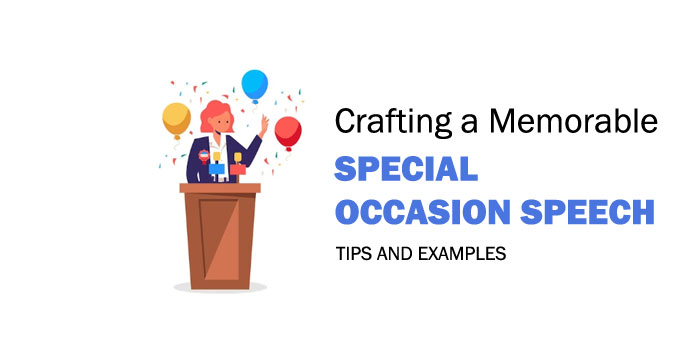
You’re excitedly prepping for the big event – the guest of honor is upcoming, the food is prepped, and the decorations are delightful – but don’t forget one of the most important aspects of any special occasion: the speech. Whether you’re the keynote speaker, best man/maid of honor, or even one of the parents in the audience – chances are you’ve been asked to buckle up and grab the mic at some point and come up with the perfect speech. Crafting speeches and giving them in front of a live audience can seem like a daunting task, especially if you have no idea where to begin. Fear not! Today, we’re providing the perfect guide to giving a knockout special occasion speech that will for sure make all your audience members fuzz with happiness. Read on for tips, tricks, and examples – you’ll have a heartfelt showstopper ready to go in no time.
Understand the Event and Your Audience
When writing a special occasion speech, it is important to understand the event and the audience. Take some time to get to know the event, what type of tone and atmosphere will be created in the room, and who your audience is expected to be. Knowing the context will help you shape the content of your speech. It is particularly crucial to identify who your audience is composed of and their expectations. Ask yourself: What do they want to hear? How long do they want to listen? Are there any sensitive issues or topics that need to be avoided? Keeping these questions in mind will ensure you are meeting their needs. For example, an important takeaway for an address at a business-focused conference would likely differ from one given at a graduation ceremony . You also need to decide which points you want to emphasize during your speech. It can be helpful to brainstorm some ideas in advance. Brainstorm topics that are both relevant and meaningful, such as offering advice on how to navigate current obstacles or other useful knowledge your audience may be able to benefit from. Additionally, if applicable, identify areas where debate could be sparked and try to anticipate opposing points of view. This will help prepare for a balanced discussion in case someone brings up an argument challenging any claims or statements you make in your speech. With this knowledge at hand, you can begin the research process with confidence. Next we’ll discuss how researching the occasion can further inform and enhance your special occasion speech.
Research the Occasion
Researching the occasion should be a priority when preparing a special occasion speech. Understanding the tone, audience, and purpose of the occasion is fundamental to writing an effective and motivating speech. Additionally, it is essential to consider the expectations for the speech and what kind of content will be most effective in meeting those expectations. For example, research guidance from the event organizers can inform topics or stories that are particularly relevant to the occasion. This ensures the main points of the speech stay on-point for the event’s purpose. It may also be helpful to research similar events or special occasion speeches for ideas or inspiration. It’s important to note here that it isn’t advisable to copy or use someone else’s words; rather take time to brainstorm your own ideas and recognize topics that you have unique knowledge or experience in talking about. When researching a special occasion speech, there is a debate between using scripted versus unscripted material. Some speakers prefer scripting out their entire speech so they can make sure all key points are covered in an organized way. On the other hand, other speakers rely more heavily on improvisation and speaking without a script. These two approaches both involve advantages and disadvantages; in general, which one is more suitable depends on various factors including personal preference, as well as understanding of how much practice is needed for either approach to come off smoothly and professionally. Once you’ve completed your research of the special occasion, you are ready to move onto preparing your speech . Creating an outline at this stage can help organize your thoughts and ideas, setting the groundwork for writing your full draft of the speech . Now you’re ready for the next section – preparing your special occasion speech.
Prepare Your Special Occasion Speech
Preparing your special occasion speech is a key factor in its success. It’s important to gather all the facts and resources necessary for you to be able to effectively communicate your message. Here are some tips for preparing your special occasion speech: 1. Set realistic goals. Establish what you want to achieve with your speech, then make sure that those goals are achievable and relevant to the setting and audience of the special occasion. 2. Research thoroughly. Once you have established the goals for your speech , research the topic in-depth so that you can include any pertinent facts or figures. 3. Brainstorm ideas. An effective way to come up with content for your speech is to brainstorm ideas – think about who or what you want to talk about and what experiences or topics it would be interesting to cover in your presentation. 4. Outline your speech. After coming up with ideas, create an outline of your speech with a beginning, body, and conclusion section. This allows you to organize the information clearly while ensuring that all of the points you wanted to discuss have been covered in an organized fashion. 5. Consider visuals and other materials. Incorporating visuals such as video clips , photographs, or slideshow presentations can enhance your speech by keeping the audience engaged and helping them to better understand your points more clearly. Additionally, prepare materials such as handouts which could help add value to your presentation if needed. Having taken these steps into consideration, you now have all the tools necessary for presenting an impactful special occasion speech. Now it’s time to decide on what content should be included in it – let’s move onto our next section about how exactly we will do just that!
Decide on Your Content
Deciding on the content of a special occasion speech can be daunting; knowing what to say and how to say it will leave many feeling overwhelmed. However, the speaker should consider the event, the audience, and their own comfort level with public speaking in order to determine what should be said. First and foremost, the speaker should understand the primary purpose of their speech; this will direct all other considerations like tone and timing. If a speech is meant as an award presentation, for instance, then it should remain focused on the honors being given or shared. Other speeches that may take place during a ceremony could include introductions, appreciations, or well wishes. No matter what content is chosen, a speech should aim to move the audience but also prioritize keeping within a certain time frame. A good rule of thumb is the ‘less is more’ approach of imparting valuable information within a few minutes . Keeping material concise will also ensure that all important points are addressed while also maintaining the audience’s attention throughout. When considering one’s own comfort level with public speaking, it’s important to note that some people feel more competent discussing certain topics than others. For example, those who may not feel very knowledgeable about honoring someone for their excellence in work or service may choose to focus on showcasing their own personal experience or connection with them instead. Whatever is decided upon should still keep with the intent of the occasion and create value for both speaker and listener alike. Finally, every good presentation relies heavily on connecting with an audience . Careful consideration of one’s content is essential in ensuring this meaningful connection between speaker and listeners going forward in the final section about “Connecting With Your Audience”.
Connect with Your Audience
Connecting with your audience is essential for delivering a special occasion speech that will be remembered. An important part of connection is understanding the purpose and history of the event. By understanding the context and how it’s linked to the audience’s values, beliefs, or identities, you can better relate to your listener. Additionally, connecting with an audience requires being mindful of their current emotions. Are they feeling excited, nostalgic, somber? Speak to that emotion through the use of anecdotes, stories, examples, or other tangible connections. Humor can also be used as a tool to make a connection with your audience. Everyone loves laughing, so if a joke is organic and appropriate within the context of your speech, don’t be afraid to include one. On the other hand, some may feel humor is inappropriate given the gravity of certain events; it’s important to use caution when deciding whether humor is necessary or not. The strongest speeches depend on the bond between speaker and listener alike. When there is an emotional connection, both parties are more likely to deeply digest and appreciate your words. To create stronger connections between yourself and audience members consider putting yourself in their shoes— How would they feel if hearing what you’re saying? You can then use emotive language when crafting your speech to bring out those same feelings from them as well. It is through making these connections that one can craft a moving and meaningful special occasion speech that resonates with its listeners. Next up in this article: Reaching for Your Audience’s Emotions – Learn how to activate listeners’ emotions by knowing which words to use in order to move them emotionally during a special occasion speech.
Reach for Your Audience’s Emotions
Whether you’re writing a speech for a wedding , toasts at a retirement party, or celebrating the successes of your classmates at a graduation ceremony, the goal is to provoke emotion and reach your audience in an impactful way. Crafting your speech to be memorable requires thoughtfulness and intentionality to ensure your audience will respond in the desired manner. The challenge lies in striking the right balance between sentimentality and sappiness. If it’s too saccharine, it could come off as insincere—but you don’t want it to be so dry that people stay disengaged. One theory suggests that you should undertake an approach that seeks to “surprise with familiarity” – use anecdotes and stories that are familiar enough to be relatable, but new enough to capture attention. You can also look for ways to entertain with humor, although this can get complicated if taken too far or if humor isn’t something you’re confident about doing. Ultimately, reaching for emotion in your speech is about finding the story underneath the occasion – drawing on why we’re all there in the first place. Whether its joy over a wedding couple, celebration of success for a graduate, or honoring decades of hard work at retirement party, the goal is to make clear why the moment matters and focus on that throughout your speech. No matter which tactic you take in attempting to reach your audience’s emotions, avoiding clichés and leaving room for creative storytelling is key to sentence-by-sentence craftsmanship. With thoughtfully crafted words in delicate balance with careful comedic timing, you’ll evoke emotion from every corner of your audience. Now let’s learn how deliver this masterpiece with confidence!
Deliver Your Speech with Confidence
It’s understandable to have some nerves when delivering a special occasion speech, but ultimately, the audience is there to hear what you have to say. You’ve worked hard writing your speech and practicing it, so now it’s time to let your words do their job. Starting off strong will help build confidence and increase the likelihood that you won’t forget a key part of your presentation or stumble over your words. Enunciating clearly and taking pauses when necessary are key elements to ensure that the audience is hearing what you are saying. Additionally, speaking at a moderate pace allows listeners enough breathing room to absorb the message. Make eye contact with members of the crowd intermittently – not everyone in the room all at once- as this will convey genuine engagement with them and make the environment more inviting. On the other hand, intonation of your speech must also be taken into consideration in order for its impact to be effective. A slow yet passionate monotone can feel dull compared to dynamic pitch changes and enthusiastic volume levels. This will allow listeners to focus more on the content being discussed while still captivating their interest. Now that you’re armed with tips for confidently delivering an unforgettable special occasion speech, it’s time to hone its meaningful message.
Give the Speech a Meaningful Message
Giving a speech at a special occasion is more than just telling your story: it is also about giving the occasion itself some thought and meaning. Consider the event’s purpose and the audience, and craft a message that speaks to both. Doing so will ensure that your message resonates with the attendees and leaves them feeling inspired or enlightened. When it comes to creating your meaningful message, there are two ways you can approach it. You can either focus on the time-honored ideals associated with the occasion, or you can tailor your message to be relevant in the present moment. For example, if you are giving a speech at a wedding, you could talk about the virtues of marriage such as companionship and mutual respect, or about how modern couples are forging their own paths in marriage that don’t necessarily align with traditional values. Both approaches have their merits, and depending on your audience’s interests, one may work better than the other. Ultimately, do whatever feels most natural for you. The key to giving a meaningful speech is to make sure your message emotionally connects with your audience. Many times this can be achieved by being honest and vulnerable; people respond better to heartfelt stories that convey raw emotion rather than generic platitudes. A meaningful message should also leave an uplifting and positive impression on those listening. Even if the occasion centers around something troubling or negative, try to bring a sense of hope and optimism in how you frame and deliver your remarks. No matter what kind of special occasion you are speaking at, remember to clearly articulate what makes it unique while still tying it back to larger themes that resonate with everyone in attendance. This way, when you finish speaking, everyone in the room will have been touched by your words in some meaningful way. With these tips in mind for crafting a meaningful message for a special occasion speech, it’s now time to learn about remembering the most important moments when delivering it.
Remember the Most Important Moments
When writing a special occasion speech, it is important to remember the most significant moments of the event. Taking the time to reflect back on what makes this occasion unique and meaningful will help to ensure that you capture all of the most important aspects of the day. When reflecting on these moments, think about what makes them so special, who was there, and how did they make an impact? If writing a speech for a wedding, consider any milestones in the couple’s relationship or details about how they came to be together. If writing for a retirement party, speak about specific incidents or memories with colleagues that made an impression on you, as this will be more personal and will show that you appreciate their hard work over the years. If applicable, take time to discuss both sides of an argument. For instance, if giving a speech at a graduation, consider individual stories from students that had different experiences during their studies – some may have overcome difficult circumstances to succeed while others may have had an easier journey but learned much along the way. Highlighting these diverse paths taken shows that you acknowledge everyone’s personal experience and accomplishments. Finally, remember to tie together your speech by closing with strong sentiment that sums up the importance of this occasion. This can end with a toast or closing remarks that bring everyone together in celebration and appreciation of the special moment shared amongst friends and family.
End with a Toast or Closing Remarks
At the conclusion of your speech , it is important to leave your audience with a memorable impression. End with a toast or closing remarks that are meaningful and set the tone for the celebration. Here are some tips for choosing a suitable toast or closing for your special occasion speech. Toast: A toast is an appropriate way to bring your speech to a close. Toasts honor or congratulate those around the table and express optimism for their future. You may want to incorporate a quote or popular phrase from literature or another source, such as: “May you have a lifetime of health, happiness, and success” or “Live long and prosper”. In addition, you could add a humorous quip or witty remark if it fits the tone of the occasion. Closing Remarks: If a toast does not make sense in the context of your speech, consider making closing remarks instead. Closing remarks can summarize what was said during the course of the special occasion speech and express well wishes before they depart. Additionally, they might suggest actions people should take going forward if applicable. An example of this would be “Now that we’ve celebrated our achievements, let’s continue working together to achieve even greater heights in the future.” When deciding on either a toast or closing remarks for your special occasion speech it’s important to take into consideration who you are speaking to and what type of message you would like to convey about them or the event at hand. For instance, give serious consideration to how well-known quotations might affect your audience depending on cultural background and beliefs. Whichever route you decide to take ensure that it complements the occasion and resonates with those listening.
Answers to Common Questions with Explanations
What are effective techniques for delivering a special occasion speech.
The most effective techniques for delivering a special occasion speech can be broken down into four key components: 1. Focus on the Audience: Every audience is different, so it’s important to tailor your speech to their needs. Think about their background, experiences and interests when crafting your content. 2. Clear Structure: It’s easy to get lost in anecdotes throughout an engaging speech. Stick to an organizational structure with a beginning, middle and end that allows you to maintain momentum and keeps the audience engaged . 3. Brevity: The more concise your message is, the more likely it is that people will remember it after the event. Craft short stories and powerful statements into your delivery rather than discourse-style speeches. 4. Rehearsal: Make sure you practice your speech several times before you arrive at the event! That way you are less likely to make mistakes or stumble through difficult passages. You should also be mindful of your flow – perfecting your pacing and pauses for effect .
What type of information should be included in a special occasion speech?
The type of information that should be included in a special occasion speech will vary depending on the purpose of the speech and the audience it is being delivered to. Generally speaking, however, a special occasion speech should include facts and figures related to the special occasion, as well as anecdotes and personal stories . For example, if delivering a celebratory speech for a company’s 10th anniversary, the speaker may want to provide some background on how the company was started and its history over the past decade; notable milestones or successes achieved; recognition of people or groups who have contributed greatly to the company’s success; gratitude for those who have supported throughout; and aims or goals for the future. Additionally, a special occasion speech should offer messages of congratulation or celebration, thoughtful reflections on the momentous event, inspirational words of hope and encouragement, humor to engage the audience, as well as any other relevant details about the occasion itself. Ultimately, it is important to ensure that all information shared during a special occasion speech is interesting and appropriate for the audience at hand.
What are the important guidelines to follow when writing a special occasion speech?
When writing a special occasion speech, there are certain guidelines to follow in order to deliver an effective and memorable speech. First and foremost, be sure to plan in advance. Take the time to research your topic and create an outline for your speech so you can organize your ideas. Be sure to craft a clear and concise message. Make sure it’s engaging and memorable! Second, practice your speech several times. Speak slowly and clearly , ensuring that you enunciate every word. Try to anticipate questions from the audience and incorporate answers into your presentation. Finally, it’s important to keep the audience in mind when creating a special occasion speech. Focus on creating a positive atmosphere and think about how the speech will impact both the audience and those it is commemorating. Focus on stories, analogies, jokes and quotes that will connect with them emotionally. By following these simple guidelines, you’ll have all the tools you need to write a winning special occasion speech!
Speech Writing
Special Occasion Speech
How to Write a Special Occasion Speech: Types, Tips, and Examples
19 min read
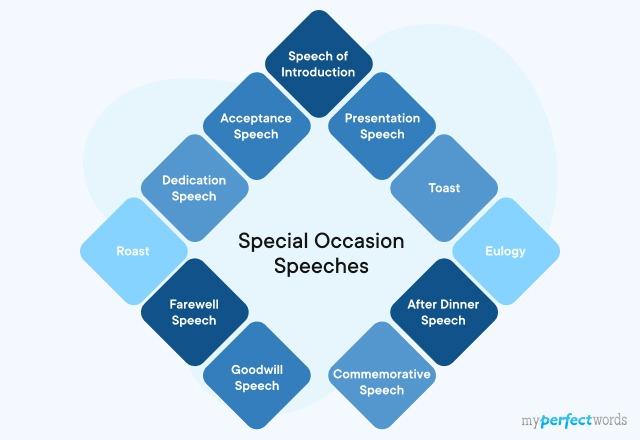
People also read
The 10 Key Steps for Perfect Speech Writing
Understanding the Speech Format - Detailed Guide & Examples
How to Start A Speech - 13 Interesting Ideas & Examples
20+ Outstanding Speech Examples for Your Help
Common Types of Speeches that Every Speechwriter Should Know
Good Impromptu Speech Topics for Students
Entertaining Speech Topics for Your Next Debate
Introduction Speech - A Step-by-Step Guide & Examples
How to Write the Best Acceptance Speech for Your Audience?
Presentation Speech - An Ultimate Writing Guide
Commemorative Speech - Writing Guide, Outline & Examples
Farewell Speech - Writing Tips & Examples
How to Write an Extemporaneous Speech? A Step-by-Step Guide
Crafting the Perfect Graduation Speech: A Guide with Examples
Have you ever been asked to give a special occasion speech and felt completely lost on where to start or how to make it truly memorable?
The pressure of the moment, the eyes of the audience, and the importance of the event can be overwhelming along with the speech writing process.
Your speech needs to be perfect, but how can you ensure that it touches hearts and leaves a lasting impact?
In this blog, we have the answers you need.
We're diving deep into special occasion speeches, providing you with the insights and techniques.
These tips will not only conquer your fear but will help you craft speeches that will be cherished for a lifetime.
So why wait? Let’s dive in!

Tough Essay Due? Hire Tough Writers!
- 1. Special Occasion Speech Definition
- 2. Types of Special Occasion Speech
- 3. Special Occasion Speech Topics
- 4. Ideas for Special Occasion Speeches
- 5. How to Write a Special Occasion Speech?
- 6. Special Occasion Speech Outline Example
- 7. Special Occasion Speech Examples
- 8. Tips for Writing Special Occasion Speech
Special Occasion Speech Definition
Special occasion speeches are the type of speeches given to mark the significance of a specific event. The particular events include a wedding, a birthday party, graduation ceremony, funeral, farewell, award ceremony, etc.
These speeches are brief and specific to the event. Some special occasion speeches are informative, and some might be inspirational.
What is the Purpose of a Special Occasion Speech?
Special occasion speeches are given on some special occasions according to the context of the event. For example, a toast is given at a wedding, and a eulogy is delivered at a funeral. Hence the purpose of a special occasion speech is determined according to the event.
These speeches use pathos to persuade a group of people by appealing to their emotions. Pathos may be intended to make the audience laugh or make them reflect at a memorial service.
Types of Special Occasion Speech
There are many events, and each event has a particular type of speech to be delivered. People show their gratitude, appreciation, and condolence through their speeches. As the list of events grows, the list of speeches grows simultaneously.
The list of special occasion speeches is very long, so for simplicity, we have grouped them into two different categories:
- Ceremonial Speaking
- Inspirational Speaking
Let’s discuss these special occasion speech types in detail.
1. Ceremonial Speeches
Ceremonial speeches are given at ceremonies by the observance of formality and decorum. The ceremonies are special occasions that people arrange to celebrate something. There are eight common types of ceremonial speaking. Let's examine them one by one.
An introduction speech is a mini-speech given by the host of an event to introduce the upcoming speaker. This speech is very precise and short, given only to familiarize the audience with the speaker going to deliver a speech.
A good introduction speech could be like this:
This introduction creatively introduced the speaker and her topic while making the audience interested in her speech.
The speech of acceptance is given by a person who has just received an award, a prize, or an honor. The speaker usually starts by thanking everyone and ends with expressing appreciation. The speech of acceptance basically has three main components:
- A special thanks to the prize or award giver.
- Other special thanks to those who have helped in achieving the goal
- The prize or the award needs to be put into perspective.
When you prepare for an acceptance speech , you need to think of the people you want to thank. List down their names in the order you want to thank them.
Acceptance Speech Example
The presentation speech is given while presenting an award, prize, or honor. The basic purpose of the presentation speech is to recognize the person’s accomplishments about the honor or award.
These speeches provide the following components:
- Highlights the award’s significance that is being given
- Highlights the merits of the award recipient
- Enhance the credibility of the award and the event by personalizing the speech
Presentation Speech Example
A speech of dedication is delivered to dedicate something to someone. It is usually given at an inauguration ceremony, a building named after someone, a new shop opens, and so on.
The dedication speeches are intended to highlight the importance of a project and to whom it has been dedicated. When preparing for a dedication speech, you need to consider the following factors:
- How you are involved in the dedication
- Explain what is being dedicated
- Explain who was involved in the project
- Explain the importance of the project
Dedication Speech Example
A toast is a kind of brief tribute to a particular person or a specific event. It is designed to appreciate and congratulate the people being toasted. It allows the speaker to recognize the person’s achievements and give the best wishes for the future.
While delivering a toast, keep these key points in mind:
- Keep it brief and specific to the event.
- Focus attention on the person being toasted
- Avoid any inside joke which is not accessible to all of the audience as toasts are public.
- End the toast by praising the person being toasted
Toast Speech Example
A roast is an interesting and funny speech because it is designed to praise and humorously insult the person being toasted. It is usually delivered at the end of a banquet to honor a person's life achievements.
Follow these tips to write an interesting toast:
- Think about the person who is being roasted.
- Look for any amusing story or a strange habit of the person being roasted.
- Poke fun at them but avoid targeting a specific person.
- Avoid the things that are truly private or might hurt the specific person’s emotions.
- Choose the jokes and stories that work best with all of the audience.
- Make your speech as humorous as possible.
- Leave with a positive note and appreciate the person.
Here are a few funny special occasion speech topics for you:
- Roast of the Office Prankster
- A Funny Tribute to the Family Tech Guru
- A Roast for the Coffee Addict
- Roast of the Social Media Star
- A Tribute to the Eternal Latecomer
Make sure you follow all these tips so that you can easily write an amazing toast.
A eulogy speech is a special occasion speech given in honor of a person who has died. It is delivered to pay tribute to the departed soul. It is given by the priest, imam, or any other religious leader.
When preparing a eulogy, the speaker needs to do the following things:
- Get a lot of information about the departed soul. It will help to personalize the eulogy.
- Remind the audience about the deceased person and his/her life achievements
- Tell the deceased’s story.
- Celebrate the deceased’s life and mourn their death
Eulogies can take various forms, and they often encompass three main types:
- Lament Eulogy: Expresses grief, sorrow, and loss, providing a cathartic outlet for those in mourning.
- Console Eulogy: Offers comfort and hope to the grieving audience, often with religious or spiritual elements, for strength and healing.
Look at the eulogy speech format in this eulogy example.
Eulogy Speech Example
It allows you to say goodbye to a current part of your life as you are moving to another part. The speeches are very common at college and university farewell parties. The graduating class says farewell to the institute as they are moving forward.
The goal of the farewell speech is to thank and appreciate the people who are currently a part of your life. As you move forward to the next position, pay tribute to the people who have helped you achieve your goals. A farewell speech gives you a chance to commemorate and remember the good times you have had.
Here is a farewell speech example for you.
Farewell Speech Example
After-dinner speech is directed toward a specific group. It aims to entertain yet inform the audience about a particular issue. They are quite tricky because of their dual role, but with practice, anyone can deliver an effective speech.
As the name suggests, these speeches are delivered at dinners after when they are done. A dinner speaker makes a serious point by efficiently using humor to make a significant mark on the audience and occasion.
2. Inspirational/Motivational Speaking
The goal of the inspirational speech is to inspire the audience to believe something or act upon something. It aims to inspire the audience to take a particular action regarding personal or professional growth.
There are two types of inspirational speeches. Let's review each of them.
Goodwill speeches are delivered to build a goodwill relationship with the audience. These speeches seek to introduce an entity or a person to another group, organization, or country. These speeches are informative as well as persuasive in nature.
There are three types of goodwill speeches:
- Public Relations Speech - intended to enhance the speaker’s or the organization’s image.
- Justification Speech - attempts to defend why a particular action has taken or will be taken.
- Speech of Apology - given to accept the mistake, apologize, and ask the audience for forgiveness.
All of the goodwill speeches not just inform the audience but attempt to persuade them at the same time.
Commencement or commemorative speeches are usually given at graduation ceremonies during which the degrees are being awarded to the students. It is a kind of celebration that marks an important milestone in graduates’ lives. It is usually given by a well-known person who is recognized by many i.e. the president of the country.
The commemorative speech has four basic components:
- Highlight the importance of the day in the graduates’ lives
- Count the accomplishments of the graduating class
- Gives best wishes for the future endeavor
- Put the light on future goals.
Here we have a good commemorative speech example for you.
Commemorative Speech Example
Special Occasion Speech Topics
As special occasion speeches are event-oriented, you might know about the topic already. Yet, it’s essential to ensure that you choose the best idea and turn it into a memorable talk.
Here are some amazing special occasion speech ideas for you:
- Prepare a eulogy for a famous person and remind the audience about his accomplishments.
- Give a maid of honor toast at your best friend’s wedding.
- Deliver an acceptance speech for winning an award.
- Present an employee of the year award.
- Give a roast when your best friend is leaving the organization.
- Deliver a keynote address at a company’s annual convention.
- Deliver the best man speech to a wedding couple
- Deliver a commemorative speech to mark an essential milestone in graduates’ lives.
- Give a good introduction to the new president of the United States.
- Prepare a farewell speech for your exit party.
Paper Due? Why Suffer? That's our Job!
Ideas for Special Occasion Speeches
Here are some basic examples of special occasion speeches you can use:
How to Write a Special Occasion Speech?
It is a well-known fact that there is no universal recipe for writing a perfect special occasion speech, yet we want to provide you with the basic process that keeps you inspired.
Here is the step-by-step process of writing a special occasion speech:
1. Special Occasion Speech Outline
The special occasion speech outline is the same for all types of speeches. It has three main components: introduction, body, and conclusion. The outline is the same for every type of speech; the difference is the content it contains.
2. Consider the Special Occasion
As there are eight basic types of special occasion speeches, you need to consider the occasion for which you are preparing your speech. Each type of speech contains different content that is specific to the event.
3. Special Occasion Speech Introduction
No matter what type of special occasion speech you are giving, the introduction needs to be compelling enough that grabs the audience’s attention immediately.
Below are the steps you can follow to write the introduction:
- Grab the audience's attention by telling some interesting facts specific to the event you are delivering a speech for.
- A thesis statement tells the main purpose of your speech.
- Preview the key points of your speech and transition to the body section
4. Special Occasion Speech Body
In the body section, you are allowed to talk about the topic in detail. Present the supporting evidence that enhances the credibility of your thesis statement. Share all the necessary information required to convey the complete message.
The body section could be longer, and it could be short. It all depends on the type of speech you are giving and the time you get to deliver your speech’s content.
5. Special Occasion Speech Conclusion
The conclusion is where you wrap things up. Summarize all of your main points here and close the speech with a compelling message.
Special Occasion Speech Outline Example
There is no one perfect way to write a speech for a special occasion. However, we want to provide you with an example to help you get started.
Here is the special occasion speech outline template for your reference:
Special Occasion Speech Examples
Check out these amazing special occasion speech samples and see how amazing they are written. You can also take help from speech examples to write your speech.
Award Acceptance Special Occasion Speech - Example
Farewell Special Occasion Speech - Example
Special Occasion Introduction Speech - Example
Graduation Speech for College Students - Example
Short Special Occasion Speech Examples
Funny Special Occasion Speech Examples
Tips for Writing Special Occasion Speech
Whether you’re giving a toast at a wedding, delivering an address at an awards ceremony, or speaking at any other special event, these tips will help your words ring true with your audience.
Planning is key when it comes to writing a special occasion speech. Begin by researching the topic and gathering ideas for what to include.
Additionally, you should also set aside enough time to properly write, rehearse, and practice your speech before delivering it.
Think About Your Audience
When writing your special occasion speech, it’s important to consider your audience and their interests.
What do they want to hear? What would make them laugh? Who are they rooting for? Knowing this can help you tailor your content so that it resonates best with your listeners.
Choose Your Words Carefully
The words you choose when writing your special occasion speech can make all the difference between boring platitudes and heartfelt sincerity.
Take some extra time to think through each phrase so that it sounds natural. Also, consider using vivid imagery throughout your speech. This will add another layer of depth while helping bring your message to life for those listening.
Use Humor Sparingly
Humor can add warmth to a speech, but use it carefully. Make sure the humor is in good taste and relevant to the occasion. Avoid anything that could be offensive.
End on a High Note
Conclude your speech with a strong, memorable closing that leaves a positive impression. A heartfelt, sincere closing often works well.
Once all these elements come together effectively then you'll be well on track for creating an unforgettable moment!
All in all, writing a good speech that is specific to the event and the audience is somehow tricky. But you don’t have to worry anymore, as this guide comprehensively covers all aspects and examples of occasional speech writing.
Still feel stuck? Do not worry!
MyPerfectWords.com, your go-to online speech writing service , offers exceptional help, crafting special occasion speeches at budget-friendly rates.
Get essay writer help from us today and wave goodbye to the anxieties of composing a stellar speech.

Write Essay Within 60 Seconds!

Dr. Barbara is a highly experienced writer and author who holds a Ph.D. degree in public health from an Ivy League school. She has worked in the medical field for many years, conducting extensive research on various health topics. Her writing has been featured in several top-tier publications.

Paper Due? Why Suffer? That’s our Job!
Keep reading


Special Occasion Speech

Crafting the perfect Special Occasion Speech can transform any event into a memorable experience. This detailed guide, interspersed with various speech examples , provides you with the tools to create speeches that resonate deeply with your audience. Whether you’re preparing a heartfelt toast, a motivational speech, or a solemn eulogy, this guide covers all aspects of special occasion speech-making. Learn to articulate your thoughts eloquently and appropriately, ensuring your words become an integral part of every special moment.
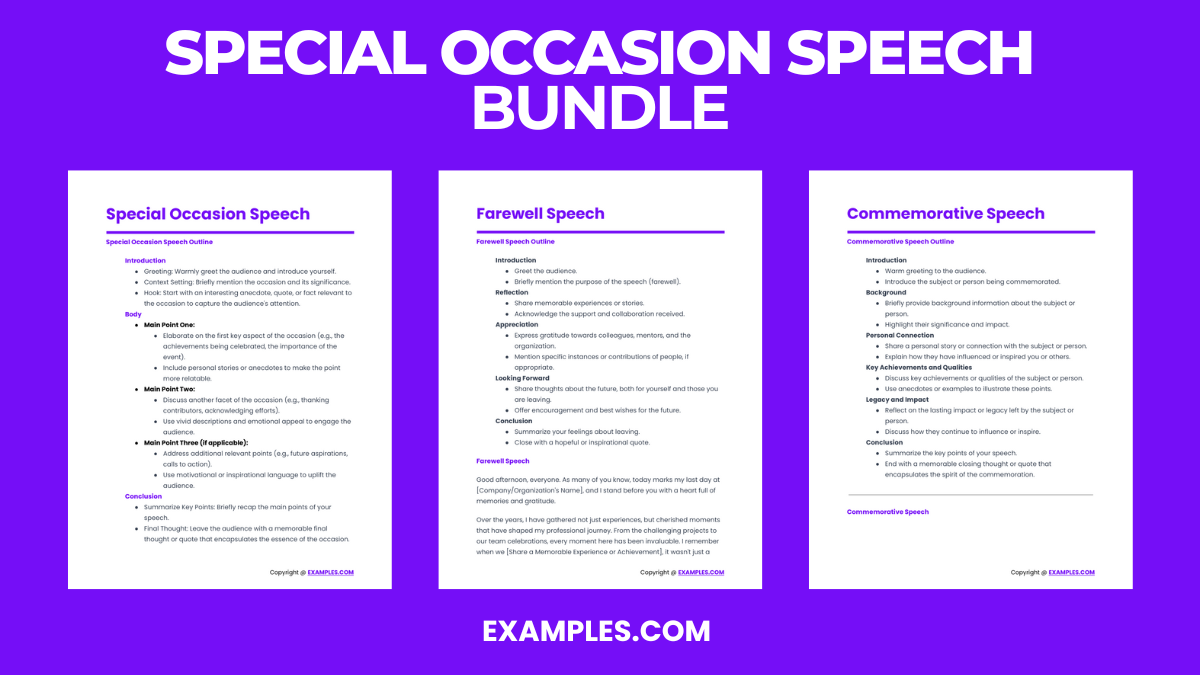
Download Special Occasion Speech Bundle
A speech is a talk addressed to a particular audience. It can be to inform, to persuade, or to pay tribute or praise. A general speech is often delivered during formal gatherings such as conventions and special occasions. Special occasion speeches, such as birthday and wedding speeches , don’t necessarily follow a set of rules in public speaking. There is no need for a speech exercise or strict formats for one to follow when it comes to writing a good speech. They are shorter than the standard types of speeches as they are simply intended to introduce, dedicate, or praise an individual.
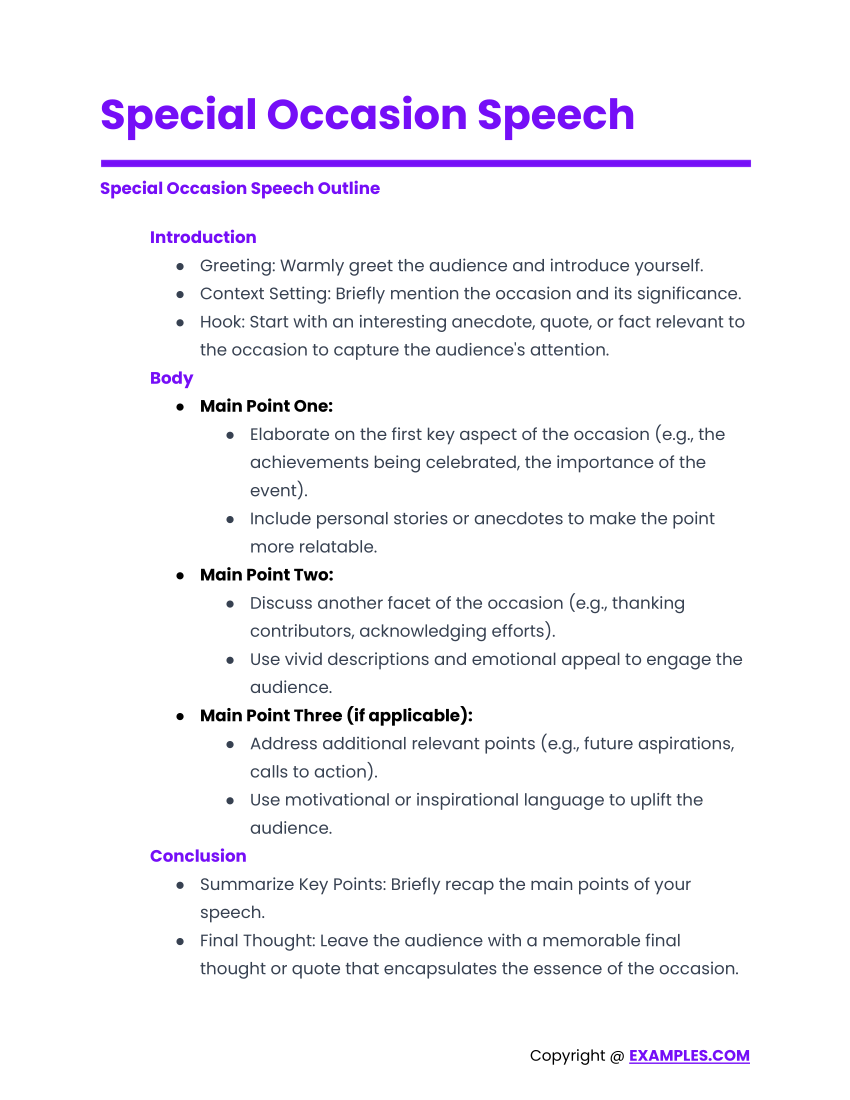
Size: 38 KB
Free Download
Short Special Occasion Speech
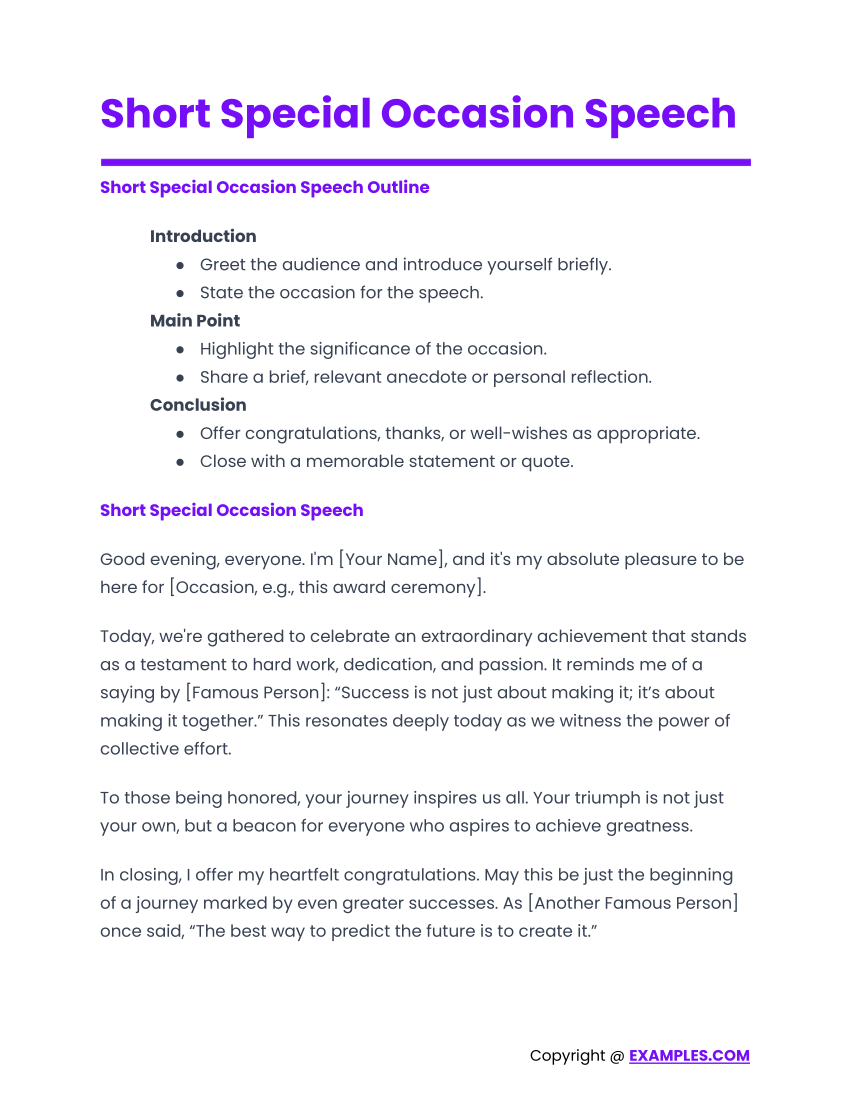
Size: 30 KB
Farewell Speech
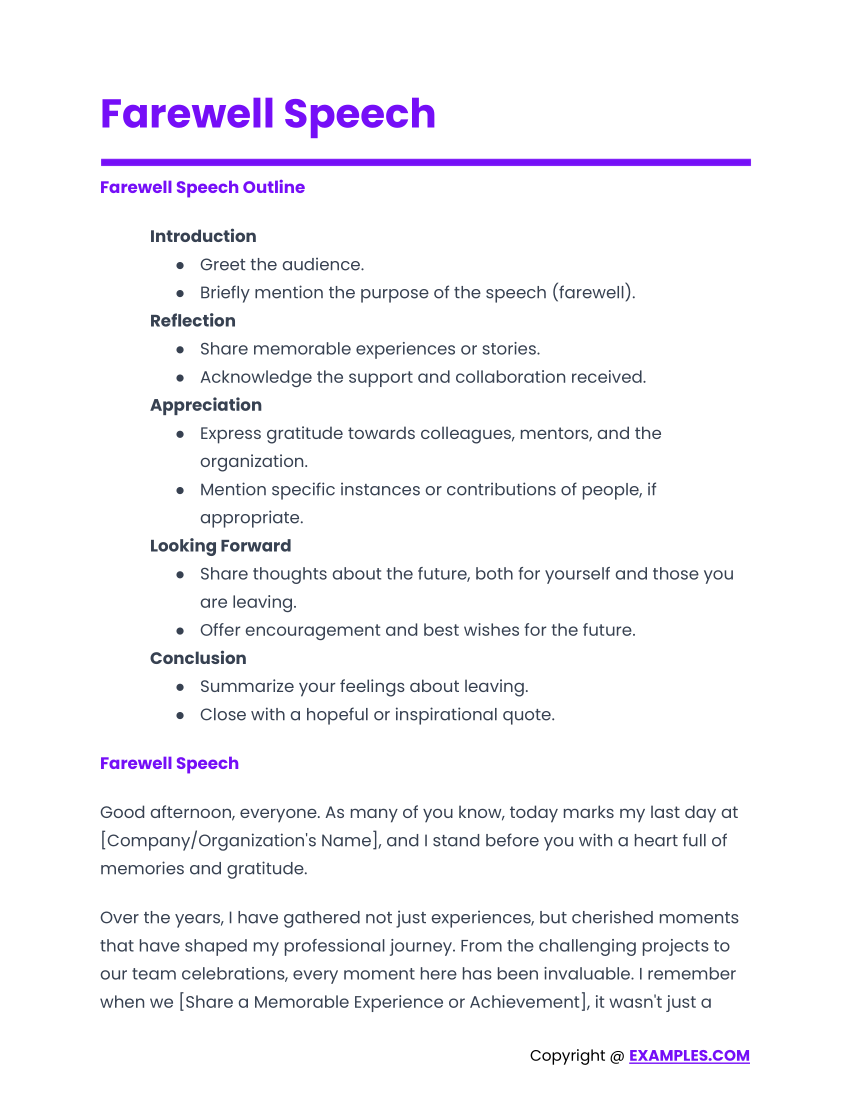
Size: 33 KB
Commemorative Speech
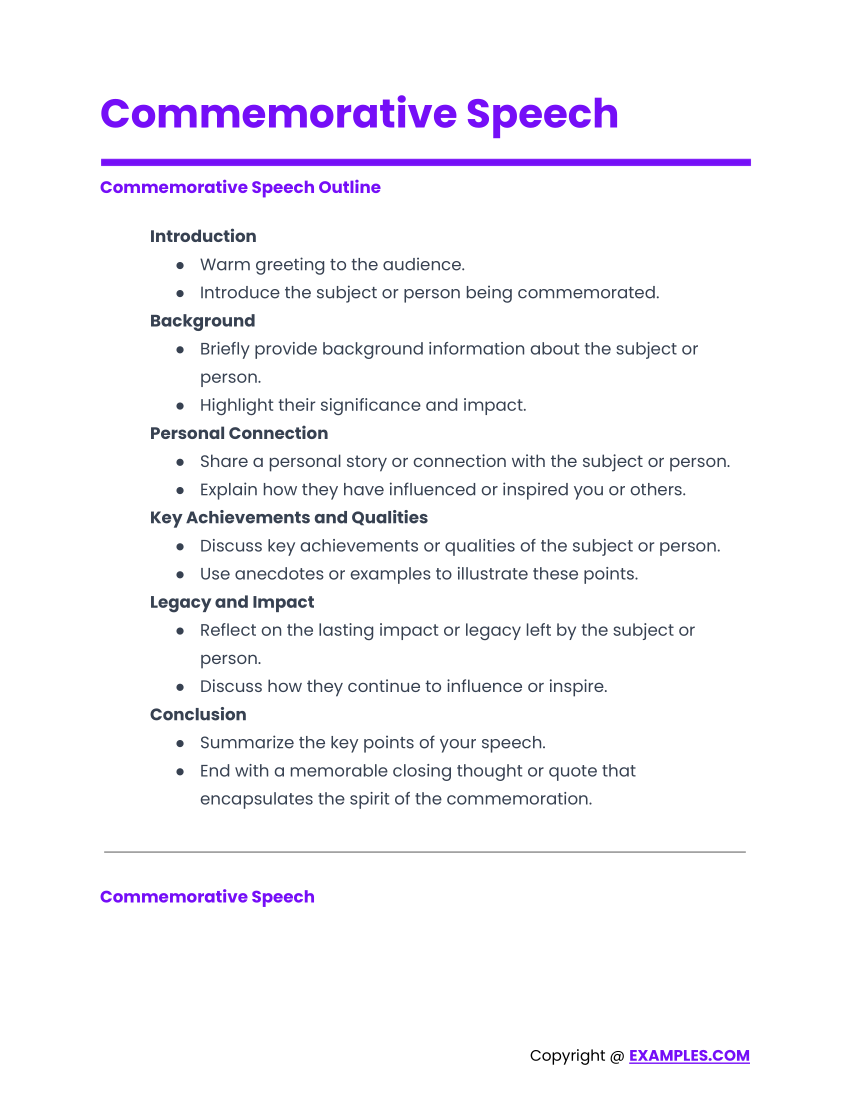
Tribute Speech
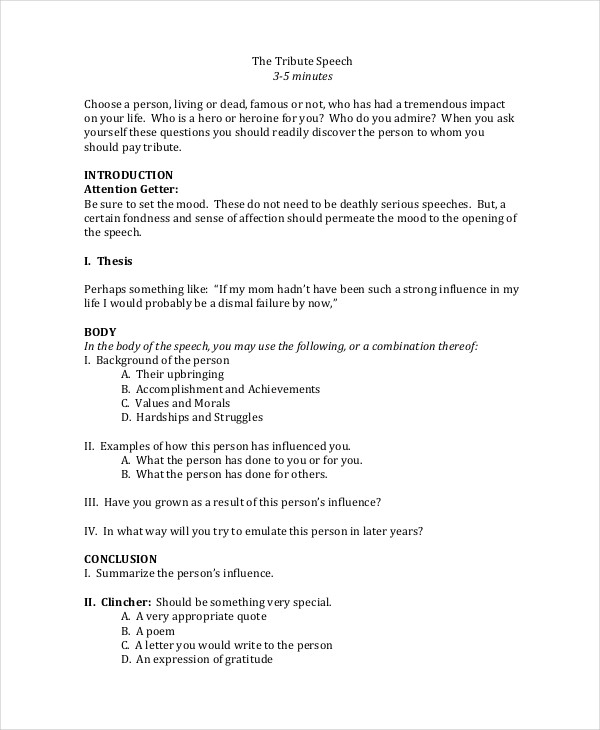
Size: 39 KB
Speaker Introduction Speech
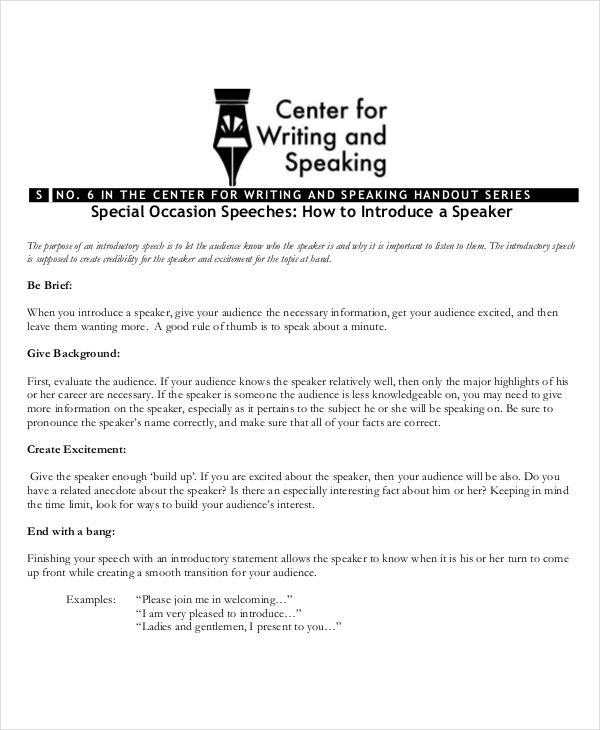
Size: 175 KB
Birthday Speech
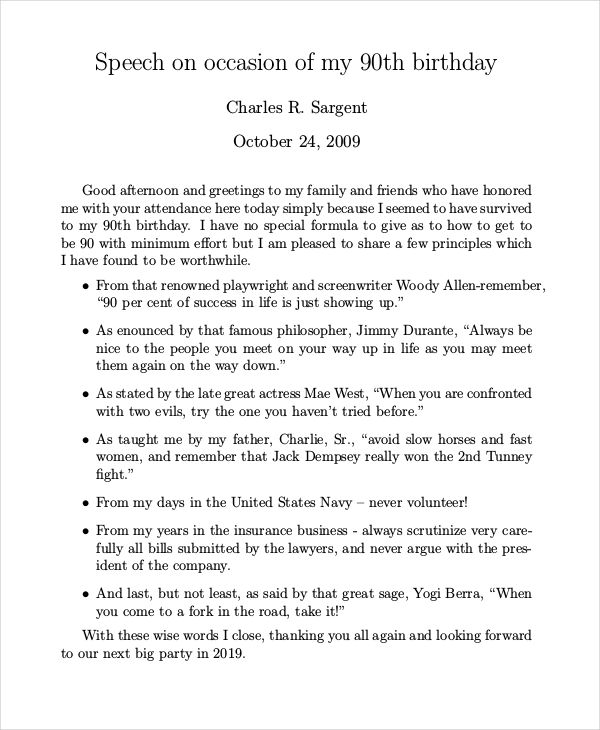
Size: 13 KB
Award Acceptance Speech
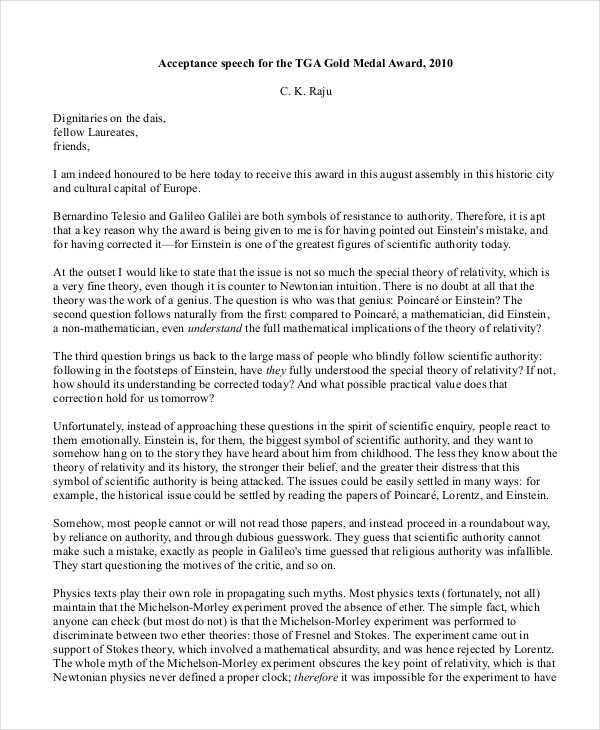
Size: 80 KB
What Is a Special Occasion Speech?
As the name implies, special occasion speeches are delivered during special occasions. They are sometimes given to commemorate a legacy or to celebrate an achievement. A special occasion speech is short and straight to the point, possibly lasting for ten minutes or less. A mood is often set through these speeches, enough to change everyone’s spirit. Some special occasion speech examples include a eulogy, a toast, and an award speech.
How to Give a Special Occasion Speech
To give a good special occasion speech, you need to know your topic well. Do your research agenda , especially when you’re dealing with names and titles of significant people. There’s nothing more insulting than delivering a speech that has the wrong information and no factual basis whatsoever. From there, you’ll be able to add your own words and ideas to the speech.
Use an optimistic tone. Even when you are presenting a eulogy, you need to be able to set a positive vibe that celebrates a person’s time here on earth. For introducing significant individuals, a good presentation speech that depicts honor and gratitude would definitely do the job. Keep in mind that a special occasion speech is meant to relay a positive message to an audience.
Short Speech for Special Occasion
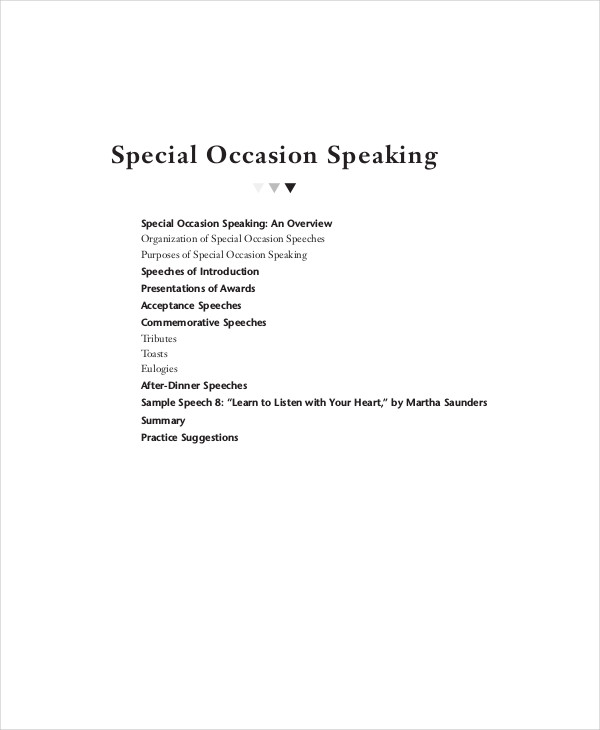
Size: 232 KB
Farewell Speech
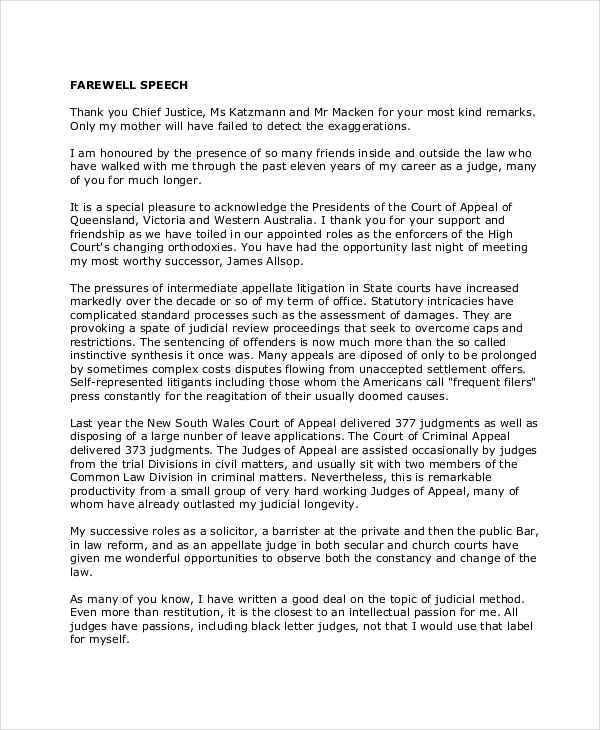
Size: 43 KB
Graduation Speech
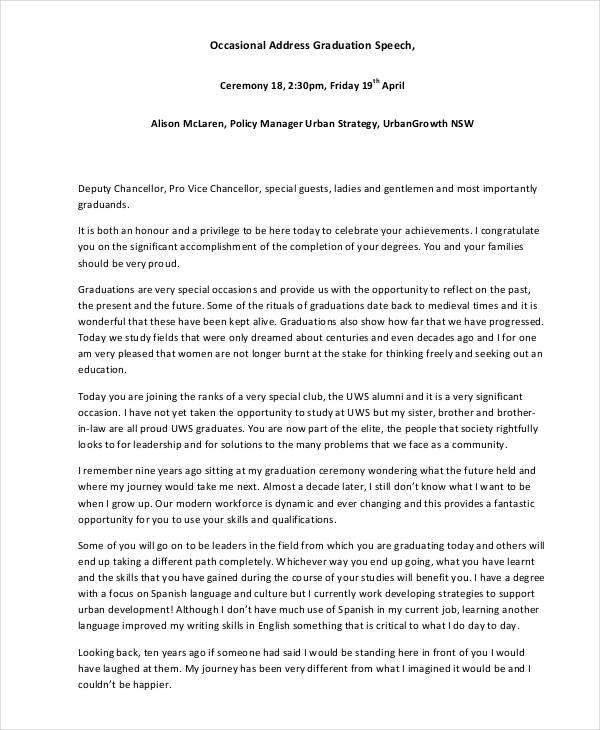
Size: 51 KB
Sample Special Occasion Speech
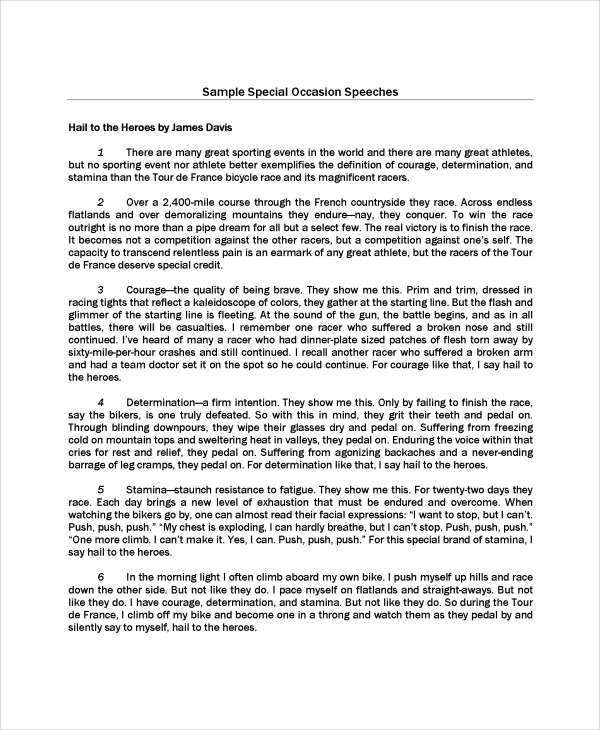
Size: 217 KB
Types of Special Occasion Speech
Special Occasion Speeches are a pivotal part of various events and ceremonies, each with a distinct purpose and tone. Whether it’s a formal gathering or a casual celebration, understanding these different types of speeches helps in crafting the right message for the occasion. Here, we explore various forms of special occasion speeches, such as Speeches of Introduction, Presentation, Acceptance, Dedication, along with Toasts, Roasts, and Eulogies.
Speeches of Introduction
Speeches of Introduction are designed to introduce a speaker or a key person at an event. The goal is to establish a connection between the audience and the speaker, highlighting their credentials and relevance to the topic or event. These speeches should be brief, engaging, and informative, setting the stage for the main speaker.
Speeches of Presentation
These speeches occur during the presentation of an award or honor. The focus is on the significance of the award and the merits of the recipient. A Speech of Presentation should be gracious and celebratory, often highlighting the achievements and contributions of the awardee.
Speeches of Acceptance
When an individual receives an award or honor, they often deliver a Speech of Acceptance . This speech is an opportunity to express gratitude, acknowledge the support of others, and sometimes, to speak on the award’s significance. It should be humble, succinct, and heartfelt.
Speeches of Dedication
Speeches of Dedication are delivered during the dedication of buildings, memorials, or other significant items. These speeches honor the purpose and significance of the item or place being dedicated. It’s a moment to reflect on its importance and to pay homage to those who contributed.
Toasts are short speeches given in honor of a person or an occasion, often during a meal or a social event. The key to a successful toast is brevity, warmth, and sincerity. It’s a gesture of goodwill and celebration, usually ending with an invitation for the audience to raise their glasses.
Roasts are humorous and entertaining speeches meant to playfully ‘poke fun’ at an individual, usually in a light-hearted manner. The key is to balance humor with respect, ensuring that the roast remains enjoyable and does not offend.
A Eulogy is a speech given in memory of someone who has passed away, usually at a funeral or memorial service. It’s a tribute to the deceased, reflecting on their life, values, and impact on others. Eulogies are deeply personal, respectful, and aim to offer comfort to the audience.
Incorporating these different types of speeches into special occasions adds depth and meaning to the events. Whether celebrating achievements, honoring individuals, or remembering loved ones, each speech type serves a unique and important role in conveying sentiments aptly suited to the occasion.
What Is the Importance of Special Occasion Speech?
Typically, a presentation speech is necessary for individuals to learn and interact with one another. Speakers learn from their research while the audience, as listeners, learn from the speaker’s speech. For special occasion speeches, it usually relates to the personal aspect. You may also see thank-you speech examples & samples .
A special occasion speech can often give pride to the individual being honored. It is a good way to recognize one’s effort. For instance, a welcome speech gives thanks to the audience for being present despite various circumstances. The speech is a means of showing one’s appreciation through words of praise and gratitude. You may also like launch speech examples .
Tips for Special Occasion Speech
A good special occasion speech comes from the power of words. It needs to leave a lasting impact to your audience for it to be effective. Here are some tips for a good speech:
- Tell a story. It could be something funny or inspiring, as long as it remains relevant. You may also check out dedication speech examples .
- Address the individual being honored or celebrated.
- Organize your words. Use speech templates to help you properly sort various ideas and thoughts.
- Avoid using explicit language. Keep in mind that your audience is a diverse group. Not everyone will be thrilled about your choice of words. You might be interested in leadership speech examples & samples .
Special Occasion Speech Generator
Text prompt
- Instructive
- Professional
Create a special occasion speech for a 50th anniversary celebration
Help me write a special occasion speech for a graduation party
Guide to Creating a Special Occasion Speech That Is Memorable
Hrideep barot.
- Speech Writing

Welcome to the guide on crafting a special occasion speech that truly leaves a mark. Special occasions are moments in life that hold significant meaning, whether it’s a wedding, graduation, or a tribute to a loved one. At the heart of these occasions are the speeches—the heartfelt words that capture the essence of the moment and resonate with everyone present.
In this guide, we’ll explore the art of creating special occasion speeches that are not just memorable but also impactful. We’ll delve into what constitutes a special occasion speech, why it matters in various social settings, and the strategies individuals can employ to engage their audience and make a lasting impression. Additionally, we’ll examine key elements that contribute to the memorability of a speech, provide examples of successful speeches, and discuss common pitfalls to avoid.
Whether you’re a seasoned speaker or facing the daunting task of delivering a special occasion speech for the first time, this guide is here to help you navigate the process with confidence and grace. So, let’s dive in and uncover the secrets to crafting a speech that will be remembered long after the applause fades away.
Why Is A Special Occasion Speech Important And What Defines It?
How to engage your audience and make an impactful special occasion speech.
- What Are The Key Elements That Contribute To Making A Special Occasion Speech Memorable?
Examples Of Successful Special Occasion Speeches And What Made Them Impactful?
- What Are The Common Pitfalls To Avoid When Crafting A Special Occasion Speech?
- Conclusion
A special occasion speech is like a spotlight shining on a particular moment in life that’s worth celebrating or acknowledging. Think of it as that heartfelt toast at a wedding, the inspiring graduation speech, or the touching eulogy at a funeral. These speeches are a way for people to express their thoughts, feelings, and well-wishes during important events.
Now, why are they so important ? Well, imagine attending a wedding without hearing those touching words from the best man or maid of honor. It’s like missing a key ingredient in a recipe; the event just doesn’t feel complete. Special occasion speeches add depth and meaning to these gatherings. They’re like the glue that binds everyone together, creating a sense of unity and shared experience.
These speeches have a magical quality to them because they capture the essence of the moment. They allow speakers to reminisce about shared memories, offer words of encouragement, or simply express gratitude. And in doing so, they create a lasting impact on the audience. After all, who doesn’t remember a particularly moving speech that brought tears to their eyes or made them burst with laughter?
So, in essence, special occasion speeches are like the heartbeats of these events, pulsing with emotion and significance. They have the power to uplift spirits, strengthen bonds, and immortalize precious moments in our memories. And that’s why they’re such an integral part of various social settings.
To engage their audience and leave a lasting impression during a special occasion speech, individuals can employ several effective strategies:
Know Your Audience:
Understanding who you’re speaking to allows you to tailor your message effectively. Consider their interests, values, and expectations when crafting your speech.
Start Strong:
Begin your speech with a captivating opening that grabs the audience’s attention. This could be a powerful quote, a personal anecdote, or a thought-provoking question.
Tell Stories:
People love stories because they resonate on a personal level. Incorporate relevant anecdotes or narratives that connect with the theme of the occasion and evoke emotions in your audience.
Use Humor Wisely:
Humor can lighten the mood and make your speech more engaging. However, be mindful of the occasion and avoid inappropriate jokes. Aim for tasteful humor that brings smiles without offending anyone.
Be Authentic:
Audiences appreciate sincerity and authenticity. Speak from the heart and let your genuine emotions shine through. Avoid overly rehearsed or scripted delivery that feels robotic.
Involve the Audience:
Make your speech interactive by asking questions, inviting participation, or encouraging applause. This helps create a sense of connection and involvement among listeners.
Use Visual Aids:
Incorporating visual aids such as slides, photos, or props can enhance your message and make it more memorable. Just ensure they complement your speech and don’t overshadow your words.
Maintain Eye Contact:
Establishing eye contact with members of the audience builds rapport and conveys confidence. It shows that you’re speaking directly to them and engaging with their reactions.
Keep it Concise:
While it’s important to convey your message effectively, avoid rambling or going off on tangents. Keep your speech focused and concise to maintain the audience’s attention.
End with Impact:
Finish your speech on a high note by delivering a memorable closing statement or leaving the audience with a powerful takeaway. This final impression will linger long after you’ve finished speaking.
By implementing these strategies, individuals can captivate their audience and ensure their special occasion speech is both engaging and memorable.
What Are The Key Elements That Make A Speech Memorable?
Several key elements contribute to making a special occasion speech memorable:
1. Personalization:
Tailoring the speech to the specific event, audience, and individuals involved adds a personal touch that resonates deeply with listeners . Incorporating personal anecdotes, inside jokes, or references to shared experiences helps create a connection and makes the speech more memorable.
2. Emotional Impact:
Emotions are powerful drivers of memory, so evoking genuine emotions in the audience can leave a lasting impression. Whether it’s joy, nostalgia, gratitude, or inspiration, tapping into the audience’s emotions through storytelling, heartfelt expressions, or poignant reflections enhances the memorability of the speech.
3. Clear Structure:
A well-organized speech with a clear beginning, middle, and end is easier for the audience to follow and remember. Structuring the speech around a central theme or message, and using transitions to guide the flow of ideas, helps maintain coherence and ensures key points are effectively communicated and retained.
4. Vivid Imagery :
Painting vivid pictures with words helps bring the speech to life and creates memorable mental images for the audience. Using descriptive language, sensory details, and vivid metaphors or similes engages the audience’s imagination and enhances their recall of the speech long after it’s over.
5. Engagement:
Engaging the audience actively involves them in the speech, making it more interactive and memorable. Encouraging participation through questions, prompts, or interactive activities fosters a sense of involvement and investment in the speech, increasing its impact and memorability.
6. Authenticity:
Authenticity breeds authenticity. Being genuine, sincere, and true to oneself resonates with the audience and leaves a lasting impression. Authenticity fosters trust and connection, making the speaker and their message more memorable and impactful.
7. Memorable Moments:
Incorporating memorable moments or standout elements into the speech helps make it more memorable. Whether it’s a surprising twist, a poignant revelation, a heartfelt gesture, a call to action or a memorable quote, including elements that stand out from the ordinary leaves a lasting impression on the audience.
By incorporating these key elements into their speeches, speakers can create memorable experiences that resonate deeply with their audience and leave a lasting impression.
Here are examples of successful special occasion speeches along with an analysis of what made them impactful:
1. Barack Obama’s Inaugural Address (2009):
What made it impactful: Obama’s inaugural address captivated millions worldwide with its powerful rhetoric, inspiring message, and historical significance. He employed soaring language, invoking themes of unity, hope, and change. His call to action resonated deeply with the American people, instilling a sense of optimism and possibility for the future. Additionally, Obama’s journey and identity as the first African American president added emotional weight to his words, making the speech a defining moment in American history.
2. Steve Jobs’ Stanford Commencement Speech (2005):
What made it impactful: Steve Jobs’ commencement speech at Stanford University is renowned for its simplicity, authenticity, and profound insights. He shared personal anecdotes from his life, including his struggles and successes, which made his message relatable and inspiring. Jobs’ emphasis on following one’s passion, embracing failure, and staying hungry for knowledge resonated with graduates and audiences worldwide. His storytelling prowess and ability to distill complex ideas into simple, memorable messages made the speech timeless and impactful.
3. Malala Yousafzai’s Nobel Peace Prize Acceptance Speech (2014):
What made it impactful: Malala Yousafzai’s acceptance speech for the Nobel Peace Prize was a testament to her courage, resilience, and unwavering commitment to education and human rights. Despite facing adversity and violence, Malala spoke with poise, grace, and conviction, amplifying her message to a global audience. Her powerful storytelling, rooted in her own experiences as a young activist, shed light on the importance of education in empowering girls and promoting peace. Malala’s authenticity, humility, and unwavering determination touched the hearts of millions and made her speech a rallying cry for change.
4. Ellen DeGeneres’ Oscars Opening Monologue (2014):
What made it impactful: Ellen DeGeneres’ opening monologue at the Oscars was praised for its humor, inclusivity, and lightheartedness. She engaged the audience with witty jokes, playful banter, and clever observations, creating a sense of camaraderie and joy. Ellen’s ability to address sensitive topics with warmth and humor, such as diversity in Hollywood and the power of storytelling, made her speech both entertaining and thought-provoking. Her natural charisma and genuine rapport with the audience made the Oscars ceremony memorable and enjoyable for viewers worldwide.
These examples demonstrate that successful special occasion speeches share common elements such as authenticity, storytelling, emotional resonance, and relevance to the audience. By connecting with listeners on a personal level and delivering a message that inspires, entertains, or enlightens, speakers can create impactful speeches that leave a lasting impression.
What Are The Common Pitfalls To Avoid When Crafting A Special Occasion Speech?
When crafting a special occasion speech, there are several common pitfalls to avoid. Here are some, along with strategies to mitigate them:
Lack of Preparation:
One of the biggest pitfalls is not preparing adequately for the speech. This can result in a disorganized or rambling presentation that fails to engage the audience.
Mitigation: Prepare well in advance by researching the occasion, understanding the audience, and outlining key points . Rehearse your speech multiple times to ensure smooth delivery and confidence on the day of the event.
Overwhelming Length:
Another common pitfall is delivering a speech that is too long, leading to audience fatigue and loss of interest.
Mitigation: Keep your speech concise and focused on the most important points. Practice editing out unnecessary details or tangents to ensure a clear and succinct presentation.
Lack of Audience Connection:
Failing to connect with the audience on a personal level can result in a speech that feels generic or impersonal.
Mitigation: Tailor your speech to the specific occasion and audience by incorporating personal anecdotes, relevant references, and engaging stories. Make eye contact, use inclusive language, and consider the audience’s perspective when delivering your message.
Inappropriate Content:
Using humor or language that is offensive, insensitive, or inappropriate for the occasion can detract from the overall impact of the speech.
Mitigation: Exercise caution when incorporating humor or anecdotes, ensuring that they are tasteful and respectful of the audience and occasion . Consider seeking feedback from trusted individuals to gauge the appropriateness of your content.
Lack of Structure:
A speech that lacks a clear structure or organization can confuse the audience and diminish the impact of the message.
Mitigation: Create a logical flow for your speech, with a clear introduction, body, and conclusion. Use transitions to guide the audience through each section and reinforce key points for emphasis.
Ignoring Time Constraints:
Ignoring time constraints and exceeding allocated speaking time can disrupt the event schedule and inconvenience attendees.
Mitigation: Practice timing your speech during rehearsals to ensure it fits within the allotted timeframe. Be mindful of cues from event organizers or hosts regarding the duration of your speech and adjust accordingly to respect the schedule.
Lack of Authenticity:
A speech that lacks authenticity or sincerity can fail to resonate with the audience and come across as insincere or superficial.
Mitigation: Speak from the heart and share genuine thoughts, emotions, and experiences that reflect your true feelings about the occasion. Avoid using overly rehearsed or scripted language, and strive to connect with the audience on a personal level.
By being aware of these common pitfalls and employing strategies to mitigate them, speakers can craft special occasion speeches that are engaging, impactful, and memorable for all the right reasons.
In conclusion, crafting a special occasion speech that is memorable requires careful consideration of various elements and potential pitfalls. Understanding the significance of special occasion speeches and their role in various social settings is essential, as they serve as emotional anchors that bind people together during important life events. Employing effective strategies such as personalization, storytelling, and audience engagement can enhance the impact of the speech and leave a lasting impression on listeners.
Key elements that contribute to the memorability of a special occasion speech include emotional resonance, clear structure, vivid imagery, and authenticity. Drawing inspiration from successful examples like Barack Obama’s inaugural address, Steve Jobs’ commencement speech, Malala Yousafzai’s Nobel Peace Prize acceptance speech, and Ellen DeGeneres’ Oscars opening monologue can provide valuable insights into crafting impactful speeches.
However, it’s crucial to be mindful of common pitfalls such as lack of preparation, overwhelming length, and inappropriate content. By mitigating these pitfalls through careful planning, audience connection, and authentic delivery, speakers can ensure that their special occasion speeches resonate deeply with their audience and create cherished memories for years to come.
Click here to uncover the secrets waiting to be discovered!
Enroll in our transformative 1:1 Coaching Program
Schedule a call with our expert communication coach to know if this program would be the right fit for you

How to Negotiate: The Art of Getting What You Want

10 Hand Gestures That Will Make You More Confident and Efficient

Interrupted while Speaking: 8 Ways to Prevent and Manage Interruptions

- [email protected]
- +91 98203 57888
Get our latest tips and tricks in your inbox always
Copyright © 2023 Frantically Speaking All rights reserved
Kindly drop your contact details so that we can arrange call back
Select Country Afghanistan Albania Algeria AmericanSamoa Andorra Angola Anguilla Antigua and Barbuda Argentina Armenia Aruba Australia Austria Azerbaijan Bahamas Bahrain Bangladesh Barbados Belarus Belgium Belize Benin Bermuda Bhutan Bosnia and Herzegovina Botswana Brazil British Indian Ocean Territory Bulgaria Burkina Faso Burundi Cambodia Cameroon Canada Cape Verde Cayman Islands Central African Republic Chad Chile China Christmas Island Colombia Comoros Congo Cook Islands Costa Rica Croatia Cuba Cyprus Czech Republic Denmark Djibouti Dominica Dominican Republic Ecuador Egypt El Salvador Equatorial Guinea Eritrea Estonia Ethiopia Faroe Islands Fiji Finland France French Guiana French Polynesia Gabon Gambia Georgia Germany Ghana Gibraltar Greece Greenland Grenada Guadeloupe Guam Guatemala Guinea Guinea-Bissau Guyana Haiti Honduras Hungary Iceland India Indonesia Iraq Ireland Israel Italy Jamaica Japan Jordan Kazakhstan Kenya Kiribati Kuwait Kyrgyzstan Latvia Lebanon Lesotho Liberia Liechtenstein Lithuania Luxembourg Madagascar Malawi Malaysia Maldives Mali Malta Marshall Islands Martinique Mauritania Mauritius Mayotte Mexico Monaco Mongolia Montenegro Montserrat Morocco Myanmar Namibia Nauru Nepal Netherlands Netherlands Antilles New Caledonia New Zealand Nicaragua Niger Nigeria Niue Norfolk Island Northern Mariana Islands Norway Oman Pakistan Palau Panama Papua New Guinea Paraguay Peru Philippines Poland Portugal Puerto Rico Qatar Romania Rwanda Samoa San Marino Saudi Arabia Senegal Serbia Seychelles Sierra Leone Singapore Slovakia Slovenia Solomon Islands South Africa South Georgia and the South Sandwich Islands Spain Sri Lanka Sudan Suriname Swaziland Sweden Switzerland Tajikistan Thailand Togo Tokelau Tonga Trinidad and Tobago Tunisia Turkey Turkmenistan Turks and Caicos Islands Tuvalu Uganda Ukraine United Arab Emirates United Kingdom United States Uruguay Uzbekistan Vanuatu Wallis and Futuna Yemen Zambia Zimbabwe land Islands Antarctica Bolivia, Plurinational State of Brunei Darussalam Cocos (Keeling) Islands Congo, The Democratic Republic of the Cote d'Ivoire Falkland Islands (Malvinas) Guernsey Holy See (Vatican City State) Hong Kong Iran, Islamic Republic of Isle of Man Jersey Korea, Democratic People's Republic of Korea, Republic of Lao People's Democratic Republic Libyan Arab Jamahiriya Macao Macedonia, The Former Yugoslav Republic of Micronesia, Federated States of Moldova, Republic of Mozambique Palestinian Territory, Occupied Pitcairn Réunion Russia Saint Barthélemy Saint Helena, Ascension and Tristan Da Cunha Saint Kitts and Nevis Saint Lucia Saint Martin Saint Pierre and Miquelon Saint Vincent and the Grenadines Sao Tome and Principe Somalia Svalbard and Jan Mayen Syrian Arab Republic Taiwan, Province of China Tanzania, United Republic of Timor-Leste Venezuela, Bolivarian Republic of Viet Nam Virgin Islands, British Virgin Islands, U.S.
Special Occasion Speech Writing Instructions and Handy Tips
08 November, 2020
13 minutes read
Author: Donna Moores
If you have earned a reputation as one of the best high-school or college students, you may be assigned to write some special occasion speech dedicated to an event or a person. The first thing you need to do after assuming this challenge is to pat yourself on the back because of the honor entrusted to you. However, your happiness is at risk of ending soon, as this may be your first time dealing with this type of paperwork. So, try to calm down and take control over your feelings and emotions. This assignment is not as complicated as it may seem.

That’s why we have prepared a full guide to writing a perfect special occasion speech of any type and complexity. Learn the general concept of the speech, its types, topic samples, and check on the inspiring examples that may provide you with a great deal of motivation. Stay positive and get ready to present a brilliant special occasion speech!
What is a Special Occasion Speech?
Generally, special occasion speech definition is quite simple. It is a speech given on some special occasions or events. Before you start working on the content, it is crucial to find out about the type of the occasion. It may be some school or college event, wedding, birthday, graduation, retirement, anniversary, etc.
As a rule, special occasion speeches are much shorter than, for example, informative ones. When being delivered, this speech should last no more than 5-10 minutes and be strictly to the point. Depending on the event, the speech may be extremely emotional, evoking a strong reaction of the audience. The broad usage of pathos in such types of speeches is quite justified as the main goal of the author is to make listeners feel happy or reflective depending on the nature of the occasion.
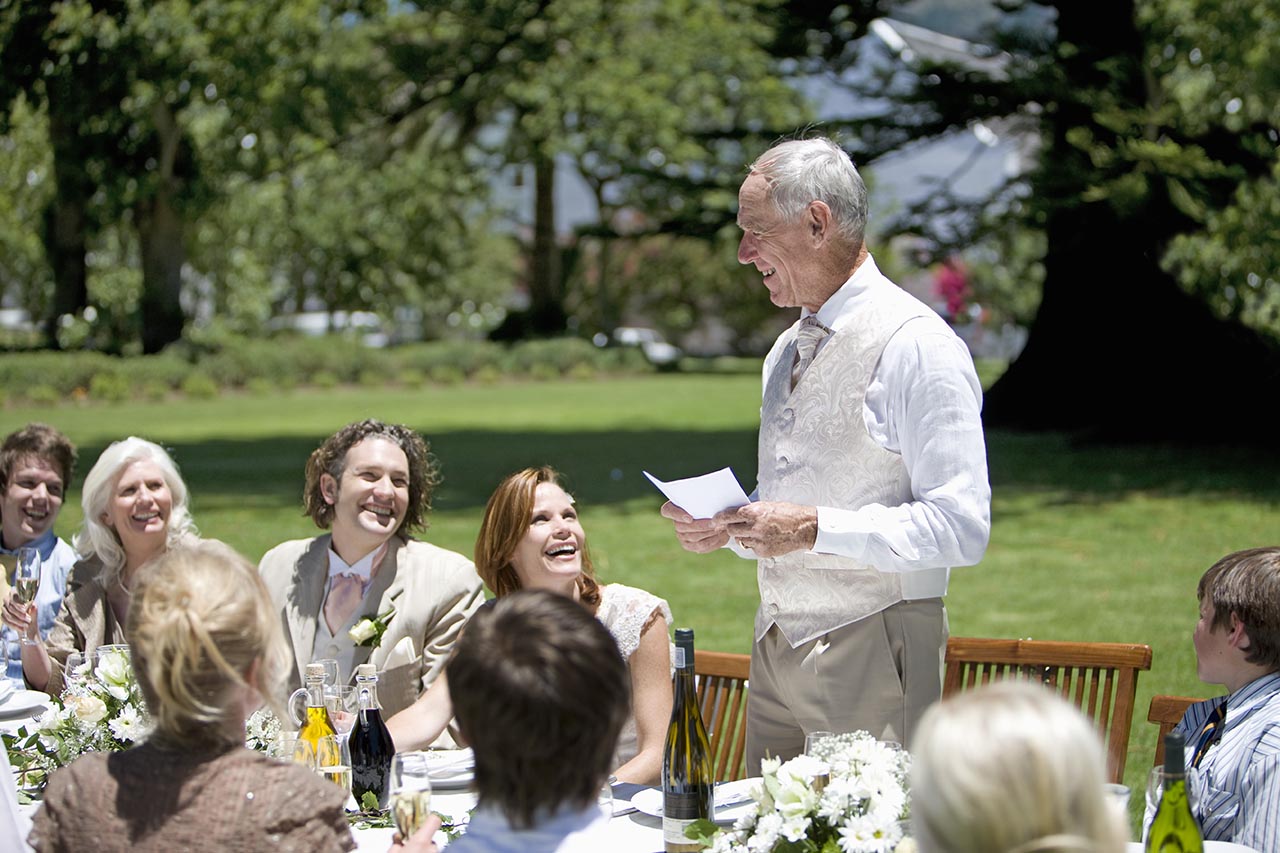
Sometimes, special occasion speech conveys an informative message. Thus, wedding speeches may be delivered to tell some romantic stories about the bride and groom. As you can see, the nature of every special occasion speech is very specific and needs to be considered individually in the context of the forthcoming event.
For you to choose the right outline and mood of your future special occasion speech, check the checklist of questions you would need to get answers to before you start working on your assignment.
Points to consider before writing special occasion speech
- What type of occasion do you need to dedicate your speech to?
- What role do you assume on this occasion?
- Who is your audience? Are there any professionals in some specific fields?
- When is your deadline? How much time do you have to complete a task?
- Should your speech convey a formal or informal message?
- What is the main goal of your speech?
- Is the occasion sensitive? What issues do you need to avoid while preparing your speech?
- Should you speak on behalf of yourself or some organization?
- Will the personal experience or some funny stories be appropriate to share with the audience?
This checklist will help you address your special occasion speech ideas properly and consider all the key details while elaborating on a speech.

Types of Special Occasion Speeches
The mood of the special occasion speech directly depends on the event it is dedicated to. There may be hundreds of various occasions, but we’ll consider only the most common ones to give you an idea of how to write a special occasion speech and succeed. Each type of speech features its specific rules and norms that should be obeyed in case you want to convey a proper message to your audience.
Ceremonial Speeches
This type of speech is usually delivered during the ceremonies and requires the etiquette norms and all the formalities to be observed. In their turn, the ceremonial speeches are divided into presentations, introductions, dedications, toasts, acceptances, farewells, eulogies, and roasts.
Presentations
Speeches for presentations are usually delivered when you need to present the winner of some prize or express honor to somebody. This type of special occasion speech needs to be very brief, as usually, occasions like this have very strict time limits.
Introductions
The introduction speech is delivered by the host of the event who wants to introduce another speaker or present the brief content of their speech. Despite being short enough, the introductory speech should also have its intro, body part, and conclusion. The main goals of the introductory speakers are to:
- make their speech last not more than 3 minutes;
- keep the audience intrigued about the speaker that is being introduced.
Ponder over the hook you would need to integrate into your speech to make your listeners feel excited about it.
Dedications
The speeches of dedication are delivered to stress the importance of some event – the opening of a new monument, square, museum, library, etc. The dedication speech needs to reflect your relation to this specific event and the way you are involved in this particular dedication.
Many people hate to deliver toasts. It happens because of their natural shyness or inability to talk a good game. If you are asked to tell the toast, try to identify what message you want it to convey – congratulations, appreciation, or maybe a tribute to someone’s memory. Keep your speech brief and emotional not to make your audience fall asleep.
Acceptances
Someone who is lucky to get an award or a prize for their achievements is honored to deliver a speech of acceptance. As a rule, this type of speech should express gratitude to some people who have contributed to your success and helped you achieve your goals.
These are the so-called “good-bye” speeches dedicated to people who finish one part of their life and move to another one. They may change their job, move from their hometown, graduate from college, etc. The farewell speech usually expresses gratitude to a person for their presence in your life, sincere appreciation, and best wishes for the next stage of their life.
This type of speech is delivered in honor of a person who has passed away. Eulogies usually require sharing your memories about the person who died. You can tell some touching stories about the deceased in case you have been close enough.
Roast speeches are the most controversial ones. Their goal is both to praise and to slightly insult the person you are talking about. However, this insult should be good-natured and very amiable. As a rule, the roasts are delivered at the end of some celebrations dedicated to someone’s success or achievements.
Inspirational Speeches
If you have been asked to make an inspirational speech, your main task is to motivate and inspire your audience. Usually, speeches have a persuasive nature and require you to share some personal experience, facts, figures, and ideas with the listeners to make them accept your point of view and start acting. Despite its nature, this special occasion speech shouldn’t be too complicated, but emotional enough to inspire the audience and let people trust you.
If you are still unsure on whether you can cope with your task – you are in the right place to get help. Our pro essay writers will always answer to the question “Who can write my speech?”
Special Occasion Speech Topics
Choosing the topic for your speech may turn out to be a real challenge. Check the most common special occasion speech topics to come up with brilliant ideas and make the whole writing process easier.
Informative
Briefly introduce your theme to give your audience an idea of what it is about. Be clear but don’t make your speech too extensive. Mention the reasons why all of you have gathered on such a special day. Share some facts and support them with your own experience or research. Don’t forget to introduce some opposite opinions to make your speech sound fresh and complete. The conclusion should be made based on the key points stated in the body paragraphs of your speech.
This speech is delivered when someone is leaving the place of living or a job. This speech is always full of gratitude and appreciation. Thank a person for the friendship and great emotions you have shared and wish all the best in the next stage of their life.
Specify what is so special about this occasion and how you relate to it. Highlight the importance of the tribute and let the audience ask you some questions.
Birthday parties, weddings, Christmas, New Year, Easter – make your speech sound entertaining and touching. Focus on the importance of the event and stress how crucial it is to share it with the closest people. If it is someone’s birthday, make the hero of the occasion feel special and loved. When delivering a speech at the wedding, mention some funny and embarrassing facts about the couple. This will help create a warm and friendly atmosphere.
Special Occasion Speech Outline
When we talk about special occasion speech outlines, there is no universal scheme that would suit any type of speech. However, like all other pieces of the paperwork, it should have an introduction, body section, and a conclusion.
Introduction
Make sure it contains an attention-getter that is a brief hook, as well as a thesis that represents the main concept you would like to share with the audience. There is no need to stuff your speech with several significant aspects – select only one that seems crucial to you. It is better to make your focus as narrow as possible to deeply develop and convey your idea. The thesis should be delivered in very simple words, so don’t make it sound too formal or stuffy.
Body section
Here is the part of the speech where all your ideas should be expanded. Share a couple of the in-depth cases that support the aspect mentioned in the introduction. Include some personal experiences and confirmed research. Make your speech as emotional as possible but make sure you don’t sound artificial and speak from your heart.
Conclude your special occasion speech with the words that would leave your audience with the proper aftertaste. Try to make the final phrases of your speech memorable and logical.
Special Occasion Speech Examples
To inspire yourself with brilliant ideas as to your creative assignment, check every special occasion speech example provided below. This will help you define the type of speech you need to focus on, choose the topic, and make an outline:
- President Bill Clinton. Presentation of the Congressional Gold Medal to the Little Rock Nine.
- Russell Conwell. Acres of Diamonds.
- Thomas L. Friedman. Listen to Your Heart.
- Theodore Roosevelt, Duties of American Citizenship .
- John F. Kennedy. The Decision to Go to the Moon.
An Extra Bit of Speech Writing Help
Now you know everything and even more about special occasion speech writing. But what to do in case you don’t have time or have lost your inspiration? Don’t sink into despair and stop bracing yourself for the worst. Refer to us so we could help you elaborate on a brilliant special occasion speech of any type and complexity. All you need is just provide the writing experts with all the information on the forthcoming event.
In case your deadline is tight, no worries – our experts have great experience working in stressful situations with no harm to the quality of the creative work.
Should you need only a couple of writing services such as editing and proofreading, you can order them without overpaying for the full package.
No need to beat yourself up. All you need is remember about your goal to create a brilliant speech to impress your audience and be proud of yourself. And all’s fair in love and war, as well as special occasion speech writing.

A life lesson in Romeo and Juliet taught by death
Due to human nature, we draw conclusions only when life gives us a lesson since the experience of others is not so effective and powerful. Therefore, when analyzing and sorting out common problems we face, we may trace a parallel with well-known book characters or real historical figures. Moreover, we often compare our situations with […]

Ethical Research Paper Topics
Writing a research paper on ethics is not an easy task, especially if you do not possess excellent writing skills and do not like to contemplate controversial questions. But an ethics course is obligatory in all higher education institutions, and students have to look for a way out and be creative. When you find an […]

Art Research Paper Topics
Students obtaining degrees in fine art and art & design programs most commonly need to write a paper on art topics. However, this subject is becoming more popular in educational institutions for expanding students’ horizons. Thus, both groups of receivers of education: those who are into arts and those who only get acquainted with art […]

16 Special Occasion Speeches
Speaking to Inspire, Entertain, or Honor
In this chapter . . .
Special occasion speeches are the umbrella term for all speeches that don’t fall into either informative or persuasive. As such there is a lot of diversity within speeches of this style. These speeches are often more personal. Additionally, they are more likely to use elements of storytelling and personal reflection. We cover the four ingredients of special occasion speeches, types of speeches in this category, and tips for delivering a special occasion speech.
Sometimes the speaking opportunities that life brings our way have nothing to do with specifically informing or persuading an audience; instead, we are asked to speak during special occasions in our lives. Whether you are standing up to give a speech at an awards ceremony or a toast at a wedding, knowing how to deliver speeches in a variety of different contexts is the nature of special occasion speaking. In this chapter, we are going to explore what special occasion speeches are as well as several types of special occasion speeches ranging from humorous to somber.
In broad terms, a special occasion speech is designed to honor, celebrate, appreciate, acknowledge, commemorate, or eulogize. Like informative or persuasive speeches, special occasion speeches should communicate a clear message, but the manner of speaking used is typically different. The word “special” in the term “special occasion speeches” is subjective in that while some speaking occasions truly are special occasions (e.g., a toast at a wedding, an acceptance speech at an awards banquet, a eulogy at a funeral for a loved one), they can also be given at more mundane events, such as the hundreds of public relations speeches that big companies give every day. The goal of a special occasion speech is to stir an audience’s emotions and make them feel a certain way in response to the situation or occasion. The general purpose of a special occasion speech might be “to inspire,” “to celebrate,” “to honor,” or “to entertain.”
To help us think through how to be effective in delivering special occasion speeches, let’s look at four key ingredients: preparation, adaptation to the occasion, adaptation to the audience, and mindfulness about the time.

Four Key Ingredients of Special Occasion Speeches
Be prepared.
First, the biggest mistake you can make when standing to deliver a special occasion speech is to under-prepare or simply not prepare at all. We’ve stressed the need for preparation throughout this text, and special occasion speeches are no exception. You must think through the speech before you stand up and speak out. If the situation is impromptu, like a toast, even jotting down some basic notes on a napkin is better than not having any plan at all for what you are going to say.
Adapt to the Occasion
Not all content is appropriate for all occasions. Wedding toasts are often humorous. If you are asked to deliver a speech commemorating the first anniversary of a school shooting, then obviously telling a joke wouldn’t be appropriate. Commencement speeches at graduation are usually full of energy as they celebrate and inspire the audience. A eulogy, on the other hand, is typically solemn. Being a competent speaker is about being both personally effective and socially appropriate. Different special speaking occasions require different content, but also appropriate levels of formality, seriousness, tone, and demeanor.
Adapt to Your Audience
Be mindful of the time, types of special occasion speeches, speeches of introduction.
A speech of introduction is a short speech given by the host of an event or ceremony that introduces another speaker and their speech. Few things are worse than when the introducer of a speaker stands up and says, “This is Wyatt Ford. He’s going to talk about stress.” While we did learn the speaker’s name and the topic, the introduction falls flat. Just like any other speech, a speech of introduction should be a complete speech and have a clear introduction (beginning), body, and conclusion.
For the introduction element of a speech of introduction, think of a hook that will make your audience interested in the upcoming speaker. Did you read a news article related to the speaker’s topic? Have you been impressed by a presentation that you’ve heard the speaker give in the past? You need to find something that can grab the audience’s attention and make them excited about hearing the main speaker.
The body of your speech should be devoted to three main points.
- First, tell your audience in general terms about the overarching topic of the speech.
- Next, tell the audience why the speaker is a credible presenter on the topic. Has the speaker written books or articles on the subject? Has the speaker had special life events that made them qualified?
- Lastly, you need to briefly explain to the audience why they should care about the upcoming speech. This outline can be adjusted; for example, you can give the biographical information first, but these three areas should be covered.
The conclusion for this type of speech welcomes the speaker to the platform. Many introducers will conclude by saying something like, “I am looking forward to hearing how Wyatt Ford’s advice and wisdom can help all of us today, so please join me in welcoming Dr. Wyatt Ford.” At this point, you as the person introducing the speaker are “handing off” the speaking duties to someone else, so it’s common to end your speech of introduction by clapping as the speaker comes on stage or shaking the speaker’s hand.
Speeches of Presentation
- First, explain what the award or honor is and why the award is important, significant, or special.
- Second, explain what the recipient has accomplished to earn the award. Why is this person the best person for this award? Did the person win a race? Did the person write an important piece of literature? Did the person mediate conflict? Whatever the recipient has done, you need to clearly highlight their work.
- Lastly, if the race or competition was conducted in a public forum and numerous people didn’t win, you may want to recognize those people for their efforts as well. While you don’t want to steal the show away from the winner, you may want to highlight the work of the other competitors or nominees.
Speeches of Acceptance
- First, thank the givers of the award or honor, thank those who helped you achieve your goal, and put the award or honor into perspective. You want to thank the people who have given you the award or honor and possibly those who voted for you.
- Second, you want to give credit to those who helped you achieve the award or honor. No person accomplishes things in life on their own. We all have family members, friends, and colleagues who support us and help us achieve what we do in life, and a speech of acceptance is the time to graciously recognize those individuals.
- Lastly, put the award in perspective. Tell the people listening to your speech why the award is meaningful to you. If you know you are up for an award, the odds of your winning are high. In order to avoid blubbering through an acceptance speech, have one ready. A good rule to remember is: Be thankful, be gracious, be short.
At one time or another, almost everyone is going to be asked to deliver a toast. A toast is a speech designed to congratulate, appreciate, or remember. Toasts can be delivered for the purpose of congratulating someone for an honor, a new job, or getting married. You can also toast someone to show your appreciation for something they have done. Often, we toast people to remember them and what they have accomplished.
When preparing a toast, the first goal is always to keep your remarks brief. Toasts are usually given during the middle of some kind of festive event (e.g., wedding, retirement party, farewell party), and you don’t want your toast to take away from those festivities for too long. Second, the goal of a toast is to focus attention on the person or persons being toasted—not on the speaker.
As such, while you are speaking, you need to focus your attention on the people being toasted, both by physically looking at them and by keeping your message about them. You should also avoid any inside jokes between you and the people being toasted because toasts are public and should be accessible for everyone who hears them. To conclude a toast, simply say something like, “Please join me in recognizing Gina for her achievement” and lift your glass. When you lift your glass, this will signal to others to do the same and then you can all take a drink, which is the end of your speech.
- Praise. Remind the audience what made that person so special. Praise them and their accomplishments. This can include notable achievements, personal qualities or anecdotes and stories.
- Lament. To lament means to express grief or sorrow, which is what everyone at a funeral has gathered to do. You will want to acknowledge that everyone is sad, and that the deceased’s passing will be difficult to get through.
- Console. The last step in a eulogy is to console the audience, or to offer comfort in a time of grief. What you must remember (and many people often forget) is that a eulogy isn’t a speech for the person who has died; it’s a speech for the people who are still living to try to help them deal with the loss. You’ll want to end your eulogy on a positive note. Offer some hope that someday, things will get better. If the deceased was a religious person, this is where you might want to incorporate elements of that belief system.
Speeches of Farewell
Speeches for commencements.
- If there is a specific theme for the graduation, make sure that your commencement speech addresses that theme. If there is no specific theme, come up with one for your speech. Some common commencement speech themes are commitment, competitiveness, competence, confidence, decision making, discipline, ethics, failure (and overcoming failure), faith, generosity, integrity, involvement, leadership, learning, persistence, personal improvement, professionalism, reality, responsibility, and self-respect.
- Talk about your life and how graduates can learn from your experiences to avoid pitfalls or take advantages of life. How can your life inspire the graduates in their future endeavors?
- Make the speech humorous. Commencement speeches should be entertaining and make the audience laugh a bit.
- Be brief! Nothing is more painful than a commencement speaker who drones on and on. Remember, the graduates are there to get their diplomas; their families are there to watch the graduates walk across the stage.
- Remember, while you may be the speaker, you’ve been asked to impart wisdom and advice for the people graduating and moving on with their lives, so keep it focused on them.
- Place the commencement speech into the broader context of the graduates’ lives. Show the graduates how the advice and wisdom you are offering can be utilized to make their own lives better.
Special Occasion Delivery
Your delivery for a special occasion speech will skew in favor of manuscript speaking rather than extemporaneous. While it’s still vital to establish eye contact with your audience and to not sound like you are reading, it’s also important to get the words exactly right because the occasion is special.
You will need to practice your special occasion speech as much as or even more than you did for your informative or persuasive speeches. You need to know what you are going to say and feel comfortable knowing what is coming next. Knowing your speech will also allow you to counteract the flow of adrenaline into your system, something particularly important given that special occasion speeches tend to be very emotional, not just for the audience, but for you as well. Basically, knowing your speech well allows you to incorporate the emotion that a special occasion speech is meant to convey, something that is hard to do when you read the entirety of your speech. In this way your audience will sense the pride you feel for a graduating class during a commencement speech, the sorrow you feel for the deceased during a eulogy, or the gratitude you have when accepting an award.
Special occasion speaking is the most varied type of speaking to cover; however, there are some general rules to keep in mind regardless of what type you are engaged in. Remember that using good, evocative language is key, and that it’s important that you deliver your speech in a way that both conveys the proper emotion for the occasion as well as allows you to give the speech exactly as you wrote it.
Public Speaking as Performance Copyright © 2023 by Mechele Leon is licensed under a Creative Commons Attribution-NonCommercial-ShareAlike 4.0 International License , except where otherwise noted.
Module 11: Speaking to Entertain and for Special Occasions
Preparing and delivering the special-occasion speech, learning objectives.
Identify the proper techniques for delivering a speech on a special occasion.
The good news is the basic form of a special-occasion speech is much like that of any other speech. It has an introduction, a body, and a conclusion. The better news is that because it is geared to a special occasion, you already have a purpose and, usually, the speech is brief! The challenge is to say what you need to say as clearly and effectively as possible. Here are some steps that can help with structuring this type of speech.
Research your occasion, your topic, and any persons or groups who are attending or who you will be introducing or mentioning. Find some interesting information about the audience, event, or person that is related to the speech topic and purpose.

Know Your Audience
Know your audience and decide what is appropriate based on age group and interest level. Several different groups may be present and you will want to connect with everyone; you will need to find the best angle to address their interests, catch their attention, and gain their support.
Let’s consider Cynthia’s award ceremony again. You were told that you have fifteen minutes to speak and introduce the awardee. You’ve learned that some of the attendees have a connection to the organization, but many don’t know much about the work it does. So, you decide to include the following:
- A brief history of the organization
- Cynthia’s role in the organization
- The story of how Cynthia got involved in this organization
- How the community can become involved
Writing (and Rewriting) the First Draft
For this speech type, you can lay out the speech in a way you find most comfortable. You can write using your computer, paper and pen, or flash cards. When writing your speech, you will need to keep timing in mind (is it a five-, 15-, or 30-minute presentation?). A typical special occasion speech will include the following components: start by introducing yourself. You can include a summary of your background and your connection to the event in two or three sentences. Then begin the body of the speech using your research you collected; don’t forget to cite any sources you may use. You can add any relevant examples or short stories that could build excitement in your speech. You will want to create a tone in the speech using language and literary devices like we talked about earlier. Finally, you will want to conclude in a memorable way. In special-occasion speeches, you do not always need to summarize all the speech points. It will depend upon what you learn in your audience analysis. You will want to thank the audience for their time and attention and conclude with a memorable closing statement!
Back to Cynthia’s award ceremony: as you begin to construct your speech, you find that it helps you to write an outline first. An outline gives you the framework you need. You look through your research and decide where you plan to include information by making notes in the outline. You then decide you want to use notecards and begin to write the speech on these cards using the outline.
Practice and More Practice
Now you have reached the best part: getting to perform the speech itself. Start by reading it aloud to yourself until you are anticipating the words as you read. Then underline the phrases you want to be sure to deliver verbatim to make your points, leaving yourself the flexibility to add and subtract content as you practice. A good method is to record your speech and play it back. When you listen to your recording, keep in mind that hearing yourself takes some time getting used to! Don’t judge your voice or the delivery at first, just concentrate on how the ideas flow (or not) and the timing and length of the piece and get used to listening to yourself. Make your changes and then find a person to watch your presentation. Don’t expect your performance to be perfect. Go easy on yourself and practice enough that you feel comfortable giving the speech. For the very first practice session, relax. It is important to get the words out and then ask for feedback on the ideas and delivery. Don’t skip this stage as it is essential to presenting an excellent speech. Remember in these practice sessions, you want to simulate how you plan to give the actual speech. Below are further tips on things to practice while preparing for your speech.
Voice and Delivery
It’s not only what you say, it’s how you say it! Time to polish this speech to make it shine! Rehearse the speech in a mirror, looking at how much eye contact you are making with yourself. A short speech will be easy to memorize partially, but something longer will need you to balance the amount of eye contact you and your audience will share. If it is a small group in a small room, it is particularly important to make eye contact. Be sure to scan the audience, to make sure they know that you are including everyone. That will allow you to respond to their reactions as a group while maintaining your presence as a speaker! You should speak slowly and allow time for the words to hit their ears. It is good to speak in short sentences and breathe frequently. Some speakers and many performers mark their breaths and especially their pauses in their notes. If you will be speaking in a larger room or auditorium, BE SURE to ask if you will have a microphone and get a time when you can practice with it! Speak directly into the microphone, and practice the distance you need between you and the microphone. The microphone will also affect how you can or can’t move during your talk—is it anchored or handheld? Wireless or wired? Your best efforts will be wasted if you are unprepared to deal with the equipment (or lack of it).
Look Good and Feel Good
Find a simple, comfortable outfit and shoes that you like and try it on ahead of the event. Double check with the organizers and ask if there are any dress codes or restrictions. It is okay to ask their opinion if you are not sure. Make sure to select a similar outfit as a backup choice. To feel good is a matter of doing your preparation and getting enough sleep. Even if you are not feeling great on the day of your speech, your preparation will carry you through! Match your movement to the speech and the venue. If you are someone who uses your hands in daily conversation, plan to use them in your speech, but practice to ensure the gestures are not distracting; some people like to note on their speech when they plan to use a gesture and practice so this looks very natural. Choose facial expressions that fit the event. Lastly, hit the bathroom, check yourself in the mirror, and take a deep breath. Be you. Be ready for anything. Feel confident because you are prepared and ready!

- Awards ceremony. Provided by : Texas State Library and Archives Commission. Located at : https://flic.kr/p/dAgewk . License : CC BY: Attribution
- Volunteering. Authored by : Mark C. Olsen. Provided by : New Jersey National Guard. Located at : https://flic.kr/p/USrifw . License : Public Domain: No Known Copyright
- Preparing and Delivering the Special Occasion Speech. Authored by : Patricia Atkinson with Lumen Learning. License : CC BY: Attribution
- Preparing and Delivering the Special Occasion Speech. Authored by : Sandra K. Winn with Lumen Learning. License : CC BY: Attribution


Want to create or adapt books like this? Learn more about how Pressbooks supports open publishing practices.
Chapter 3: Preparing for Your First Speech
Special Occasion Speeches
Unlike the informative and persuasive speeches you were required to give, special occasion speeches are much broader and allow for a wider range of topics, events, and approaches to be employed. However, while the following list of special occasion speeches is long, your instructor will have specific types of special occasion speeches that you will be allowed (or required) to do for class. Since you are like to give many special occasion speeches in your life, we want to cover everything you might need to know to give a good one.
Speeches of Introduction
The first type of special occasion speech is the speech of introduction , which is a mini-speech given by the host of a ceremony that introduces another speaker and their speech. Few things are worse than when the introducer of a speaker stands up and says, “This is Wyatt Ford. He’s going to talk about stress.” While we did learn the speaker’s name and the topic, the introduction falls flat. Audiences won’t be the least bit excited about listening to Wyatt’s speech.
Just like any other speech, a speech of introduction should be a complete speech and have a clear introduction, body, and conclusion—and you should try to do it all in under two minutes. This brings up another “few things are worse” scenario: an introductory speaker who rambles on for too long or who talks about himself or herself instead of focusing on the person being introduced.
For an introduction, think of a hook that will make your audience interested in the upcoming speaker. Did you read a news article related to the speaker’s topic? Have you been impressed by a presentation you’ve heard the speaker give in the past? You need to find something that can grab the audience’s attention and make them excited about hearing the main speaker.
The body of your speech of introduction should be devoted to telling the audience about the speaker’s topic, why the speaker is qualified, and why the audience should listen (notice we now have our three main points).
First, tell your audience in general terms about the overarching topic of the speech. Most of the time as an introducer, you’ll only have a speech title and maybe a paragraph of information to help guide this part of your speech. That’s all right. You don’t need to know all the ins and outs of the main speaker’s speech; you just need to know enough to whet the audience’s appetite. Next, you need to tell the audience why the speaker is a credible presenter on the topic. Has the speaker written books or articles on the subject? Has the speaker had special life events that make him or her qualified? Lastly, you need to briefly explain to the audience why they should care about the upcoming speech. The outline can be adjusted; for example, you can give the biographical information first, but these three areas should be covered.
The final part of a good introduction is the conclusion, which is generally designed to welcome the speaker to the platform. Many introducers will conclude by saying something like, “I am looking forward to hearing how Wyatt Ford’s advice and wisdom can help all of us today, so please join me in welcoming Dr. Wyatt Ford.” At this point, you as the person introducing the speaker are “handing off” the speaking duties to someone else, so it is not uncommon to end your speech of introduction by clapping as the speaker comes on stage or shaking the speaker’s hand.
Speeches of Presentation
The second type of special occasion speech is the speech of presentation . A speech of presentation is a brief speech given to accompany a prize or honor. Speeches of presentation can be as simple as saying, “This year’s recipient of the Lavache Public Speaking prize is Ryann Curley,” or could last up to five minutes as the speaker explains why the honoree was chosen for the award.
An interesting example of a speech presenting an award is this one by Zoe Saldana for J.J. Abrams (https://www.youtube.com/ watch?v=x03cGSszr8Q).
When preparing a speech of presentation, it’s always important to ask how long the speech should be. Once you know the time limit, then you can set out to create the speech itself. First, you should explain what the award or honor is and why the presentation is important. Second, you can explain what the recipient has accomplished in order for the award to be bestowed. Did the person win a race? Did the person write an important piece of literature? Did the person mediate conflict? Whatever the recipient has done, you need to clearly highlight his or her work. Lastly, if the race or competition was conducted in a public forum and numerous people didn’t win, you may want to recognize those people for their efforts as well. While you don’t want to steal the show away from winner, you may want to highlight the work of the other competitors or nominees.
Speeches of Acceptance
The complement to a speech of presentation is the speech of acceptance . The speech of acceptance is a speech given by the recipient of a prize or honor. There are three typical components of a speech of acceptance: 1) thank the givers of the award or honor, 2) thank those who helped you achieve your goal, and 3) put the award or honor into perspective. First, you want to thank the people who have given you the award or honor and possibly those who voted for you. We see this done every year during the Oscars, “First, I’d like to thank the Academy and all the Academy voters.”
Second, you want to give credit to those who helped you achieve the award or honor. No person accomplishes things in life on his or her own. We all have family members, friends, and colleagues who support us and help us achieve what we do in life, and a speech of acceptance is a great time to graciously recognize those individuals. Lastly, put the award in perspective. Tell the people listening to your speech why the award is meaningful to you. If you know you are up for an award, the odds of your winning are high. In order to avoid blubbering through an acceptance speech, have one ready. A good rule to remember is: Be thankful, be gracious, be short.
Speeches of Dedication
A fourth special occasion speech is the speech of dedication . A speech of dedication is delivered when a new store opens, a building is named after someone, a plaque is placed on a wall, a new library is completed, and so on. These speeches are designed to highlight the importance of the project and possibly those to whom the project has been dedicated.
When preparing a speech of dedication, start by explaining how you are involved in the dedication. If the person to whom the dedication is being made is a relative, tell the audience about your relationship and your relative’s accomplishments. Second, you want to explain what is being dedicated. If the dedication is a new building or a pre-existing building, you want to explain the importance of the structure. You should then explain who was involved in the project.
If the project is a new structure, talk about the people who built the structure or designed it. If the project is a pre-existing structure, talk about the people who put together and decided on the dedication. Lastly, explain why the structure is important for the community in which it is located. If the dedication is for a new store, talk about how the store will bring in new jobs and new shopping opportunities. If the dedication is for a new wing of a hospital, talk about how patients will be served and the advances in medicine the new wing will provide the community.
At one time or another, almost everyone is going to be asked to deliver a toast. A toast is a speech designed to congratulate, appreciate, or remember. First, toasts can be delivered for the purpose of congratulating some- one for an honor, a new job, or getting married. You can also toast some- one to show your appreciation for something he or she has done. Lastly, we toast people to remember them and what they have accomplished.
When preparing a toast, the first goal is always to keep your remarks brief. Toasts are generally given during the middle of some kind of festivities (e.g., wedding, retirement party, farewell party), and you don’t want your toast to take away from those festivities for too long. Second, the goal of a toast is to focus attention on the person or persons being toasted—not on the speaker.
As such, while you are speaking, you need to focus your attention toward the people being toasted, both by physically looking at them and by keeping your message about them. You should also avoid any inside jokes between you and the people being toasted because toasts are public and should be accessible for everyone who hears them. To conclude a toast, simply say something like, “Please join me in recognizing Gina for her achievement” and lift your glass. When you lift your glass, this will signal to others to do the same and then you can all take a drink, which is the end of your speech.
A roast is a very interesting and peculiar speech because it is designed to both praise and good-naturedly insult a person being honored. Because of this combination of purposes, it is not hard to argue that the roast is probably a challenging type of speeches to write given the difficult task of simultaneously praising and insulting the person. Generally, roasts are given at the conclusion of a banquet in honor of someone’s life achievements. The television station Comedy Central has been conducting roasts of various celebrities for a few years, and if you’ve ever watched one, you know that the “roasters” say some harsh things about the “roastees” even though they are friends.
During a roast, the roaster will stand behind a lectern while the roastee is seated somewhere where he or she is clearly on display for the audience to see, thus allowing the audience to take in his or her reactions. Since half the fun of a good roast is watching the roastee’s reactions during the roast, it’s important to have the roastee clearly visible to the audience.
How does one prepare for a roast? First, you want to really think about the person who is being roasted. Does he or she have any strange habits or amusing stories in their past that you can discuss? When you think through these questions, you want to make sure that you cross anything off your list that is truly private information or will really hurt the person. The goal of a roast is to poke at him, not massacre him.
Second, when selecting which aspects to poke fun at, you need to make sure that the items you choose are widely known by your audience. Roasts work when the majority of people in the audience can relate to the jokes being made. If you have an inside joke with the roastee, bringing it up during roast may be great fun for the two of you, but it will leave your audience unimpressed. Lastly, end on a positive note. While the jokes are definitely the fun part of a roast, you should leave the roastee and the audience knowing that you truly do care about and appreciate the person.
A eulogy is a speech given in honor of someone who has died (Don’t confuse “eulogy” with “elegy,” a poem or song of mourning). Not to sound depressing, but since everyone who is alive will someday die, the chance of your being asked to give a eulogy someday for a friend or family member is significant. However, when the time comes to deliver a eulogy, it’s good to know what you’re doing and to adequately prepare your remarks.
When preparing a eulogy, first you need to know as much information about the deceased as possible. The more information you have about the person, the more personal you can make the eulogy. While you can rely on your own information if you were close to the deceased, it is always a good idea to ask friends and relatives of the deceased for their memories, as these may add important facets that may not have occurred to you. Of course, if you were not very close to the deceased, you will need to ask friends and family for information. Second, although eulogies are delivered on the serious and sad occasion of a funeral or memorial service for the deceased, it is very helpful to look for at least one point to be lighter or humorous. In some cultures, in fact, the friends and family attending the funeral expect the eulogy to be highly entertaining and amusing.
Take, for example, Tom Arnold’s eulogy of Saturday Night Live actor Chris Farley. During his speech at Farley’s funeral, Arnold noted, “Chris was concerned about his size, and so he made sure that all of us who knew him well saw him naked at least once” (Glionna, 1998). Picturing the heavy-set comedian naked surely brought some humor to the somber proceedings, but Arnold knew Farley (and his audience) well enough to know that the story would be appropriate.
Knowing the deceased and the audience is vital when deciding on the type and amount of humor to use in a eulogy. It’s doubtful statements like Tom Arnold’s would fit many eulogies. But it would be appropriate to tell a funny story about Uncle Joe’s love for his rattletrap car or Aunt Mary’s love of tacky Christmas sweaters. Ultimately, the goal of the humor or lighter aspects of a eulogy is to relieve the tension that is created by the serious nature of the occasion.
If you are ever asked to give a eulogy, that means you were probably close to the deceased and are experiencing shock, sadness, and disbelief at your loved one’s passing. The last thing that you will want to do (or be in a mental state to do) is figure out how to structure your eulogy. To that end, here are three parts of a eulogy (i.e. main points) you can use to write one without worrying about being original with structure or organizational patterns: praise, lament, and consolation.
The first thing you want to do when remembering someone who has passed away is remind the audience what made that person so special. So you will want to praise them and their accomplishments. This can include notable achievements (being an award winner; helping with charities), personal qualities (“she was always willing to listen to your problems and help in any way she could”), or anecdotes and stories (being a great moth- er; how she drove to college to visit you when you were homesick).
The second thing you want to do in a eulogy is to lament the loss. To lament means to express grief or sorrow, which is what everyone at a funeral has gathered to do. You will want to acknowledge that everyone is sad and that the deceased’s passing will be difficult to get through. Here you might mention all the things that will no longer happen as a result of the death. “Now that Grandpa is gone, there won’t be any more Sunday dinners where he cooks chicken on the grill or bakes his famous macaroni and cheese.”
The final step (or main point) in a eulogy is to console the audience, or to offer comfort in a time of grief. What you must remember (and many people often forget) is that a eulogy is not a speech for the person who has died; it is a speech for the people who are still living to try to help them deal with the loss. You will want to end your eulogy on a positive note.
Offer some hope that someday, things will get better. If the deceased was a religious person, this is where you might want to incorporate elements of that belief system. Some examples would include ideas like:
“Jim has gone home to be with the Lord and is looking down on us fondly today.”
“We may miss Aunt Linda deeply, but our memories of her will live on forever, and her impact on this world will not soon be forgot- ten.”
Using the Praise-Lament-Console format for eulogies gives you a simple system where you can fill in the sections with 1) why was the person good, 2) why you will miss him or her, and 3) how you and the audience will get through this loss. It sometimes also helps to think of the three points in terms of Past-Present-Future: you will praise the deceased for what he did when he was alive (the past), lament the loss you are feeling now (the present), and console your audience by letting them know that things will be all right (the future).
With regard to a eulogy you might give in class, you generally have two options for how to proceed: you can eulogize a real person who has passed away, or you can eulogize a fictional character (if your instructor permits that). If you give a eulogy in class on someone in your life who has actually passed away, be aware that it is very common for students to become emotional and have difficulty giving their speech. Even though you may have been fine practicing at home and feel good about giving it, the emotional impact of speaking about a deceased loved one in front of others can be surprisingly powerful. Conversely, if you give a eulogy on a fictional character, you must treat your classroom assignment eulogy as you would a real eulogy. You wouldn’t make fun of or trivialize someone’s life at an actual funeral, so don’t do that in your eulogy for a serious speech assignment either.
Speeches of Farewell
A speech of farewell allows someone to say good-bye to one part of his or her life as he or she is moving on to the next part of life. Maybe you’ve accepted a new job and are leaving your current job, or you’re graduating from college and entering the work force. Periods of transition are often marked by speeches of farewell. When preparing a speech of farewell, the goal should be to thank the people in your current position and let them know how much you appreciate them as you make the move to your next position in life. Second, you want to express to your audience how much the experience has meant to you. A farewell speech is a time to commemorate and think about the good times you’ve had. As such, you should avoid negativity during this speech. Lastly, you want to make sure that you end on a high note.
Speeches for Commencements
A speech of commencement (or, as it is more commonly known,
a “commencement speech”) is designed to recognize and celebrate the achievements of a graduating class or other group of people. These typically take place at graduation ceremonies. Nearly every one of us has sat through commencement speeches at some point in our lives. And if you’re like us, you’ve heard good ones and bad ones. Numerous celebrities and politicians have been asked to deliver commencement speeches at colleges and universities. A famous and well-thought-out commencement speech was given by famed Harry Potter author J. K. Rowling at Harvard University in 2008 (found at http://www.youtube.com/watch?v=nkREt4ZB-ck). Rowling’s speech has the perfect balance of humor and inspiration, which are two of the main ingredients of a great commencement speech.
If you’re ever asked to deliver a commencement speech, there are some key points to think through when deciding on your speech’s content.
• If there is a specific theme for the graduation, make sure that your commencement speech addresses that theme. If there is no specific theme, come up with one for your speech. Some common commencement speech themes are commitment, competitiveness, competence, confidence, decision making, discipline, ethics, failure (and over- coming failure), faith, generosity, integrity, involvement, leadership, learning, persistence, personal improvement, professionalism, reality, responsibility, and self-respect.
• Talk about your life and how graduates can learn from your experiences to avoid pitfalls or take advantages of life. How can your life inspire the graduates in their future endeavors?
• Make the speech humorous. Commencement speeches should be entertaining and make an audience laugh.
• Be brief! Nothing is more painful than a commencement speaker who drones on and on. Remember, the graduates are there to get their diplomas; their families are there to watch the graduates walk across the stage.
• Remember, while you may be the speaker, you’ve been asked to impart wisdom and advice for the people graduating and moving on with their lives, so keep it focused on them .
• Place the commencement speech into the broader context of the graduates’ lives. Show the graduates how the advice and wisdom you are offering can be utilized to make their own lives better.
Overall, it’s important to make sure that you have fun when delivering a commencement speech. Remember, it’s a huge honor and responsibility to be asked to deliver a commencement speech, so take the time to really think through and prepare your speech.
After-Dinner Speeches
After-dinner speeches are humorous speeches that make a serious point. These speeches get their name from the fact that they historically follow a meal of some kind. After-dinner speakers are generally asked to speak (or hired to speak) because they have the ability both to speak effectively and to make people laugh. First and foremost, after-dinner speeches are speeches and not stand-up comedy routines. All the basic conventions of public speaking previously discussed in this text apply to after-dinner speeches, but the overarching goal of these speeches is to be entertaining and to create an atmosphere of amusement.
After-dinner speaking is an extremely difficult type of speaking to do well because it is an entertaining speech that depends on the successful delivery of humor. People train for years to develop comic timing, or the verbal and nonverbal delivery used to enhance the comedic value of a message. But after-dinner speaking is difficult, not impossible. What follows is the method we recommend for developing a successful after-dinner speech.
First, use all that you have learned about informative or persuasive speech- es to prepare a real informative or persuasive speech roughly two-thirds the length of what the final speech will become. That is, if you’re going to be giving a ten-minute speech, then your “real” informative or persuasive speech should be six or seven minutes in length. This is the “serious message” portion of the speech where you will try to make a point of educating your audience.
Next, go back through the speech and look for opportunities to insert humorous remarks. Once you’ve looked through your speech and examined places for verbal humor, think about any physical humor or props that would enhance your speech. Physical humor is great if you can pull it off without being self-conscious. One of the biggest mistakes any humorist makes is to become too aware of what his or her body is doing because it’s then harder to be free and funny. As for props, after-dinner speakers have been known to use everything from oversized inflatable baseball bats to rubber clown noses. The goal for a funny prop is that it adds to the humor of the speech without distracting from its message.
Last, and probably most important, try the humor out on real, live people. This is important for three reasons. First, the success of humor depends heavily on delivery, and especially timing in delivery. You will need practice to polish your delivery so that your humor comes across. If you can’t make it through one of your jokes without cracking up, you will need to either incorporate the self-crackup into your delivery or forgo using that joke.
Second, just because you find something unbelievably funny in your head doesn’t mean that it will make anyone else laugh. Often, humor that we have written down on paper just doesn’t translate when orally presented. You may have a humorous story that you love reading on paper, but find that it just seems to drone on once you start telling it out loud. Further- more, remember there is a difference between written and verbal language, and this also translates to how humor is interpreted. Third, you need to make sure the humor you choose will be appropriate for a specific audience. What one audience finds funny another may find offensive. Humor is the double-edged sword of public speaking. On one side, it is an amazing and powerful speaking tool, but on the other side, few things will alienate an audience more than offensive humor. If you’re ever uncertain about whether a piece of humor will offend your audience, don’t use it.
So you may now be asking, “What kind of topics are serious that I can joke about?” The answer to that, like the answer to most everything else in the book, is dependent on your audience and the speaking situation, which is to say any topic will work, while at the same time you need to be very careful about how you choose your topic.
Take, for example, the experience one of your authors had while he was attending a large university. One of the major problems that any large university faces is parking: the ratio of parking spaces to students at some of these schools can be 1:7 (one parking space for every seven students). In addressing this topic at a banquet, a student gave an after- dinner speech that addressed the problem of the lack of student parking. To do so, he camouflaged his speech as a faux-eulogy (fake eulogy) for the yellow and black board on the parking lot gates (see Image 15.1) that was constantly and consistently driven through by students wanting to access restricted parking. The student personified the board by noting how well it had done its job and lamented that it would never get to see its little toothpick children grow up to guard the White House. But underneath the humor incorporated into the speech was a serious message: this wouldn’t keep happening if adequate parking was provided for students on campus.
Motivational Speeches
A motivational speech is designed not only to make an audience experience emotional arousal (fear, sadness, joy, excitement) but also to motivate the audience to do something with that emotional arousal. Whereas a traditional persuasive speech may want listeners to purchase product X or agree with idea Y, a motivational speech helps to inspire people in a broad- er fashion, often without a clearly articulated end result in mind. As such, motivational speaking is a highly specialized form of persuasive speaking commonly delivered in schools, businesses, religious houses of worship, and club or group contexts. The Toastmasters International Guide to Successful Speaking (Slutsky & Aun, 1997) lists four types of motivational speeches: hero, survivor, religious, and success.
The hero speech is a motivational speech given by someone who is considered a hero in society (e.g., military speakers, political figures, and professional athletes). Just type “motivational speech” into YouTube and you’ll find many motivational speeches given by individuals who can be considered heroes or role models.
The survivor speech is a speech given by someone who has survived a personal tragedy or who has faced and overcome serious adversity. In the following clip, cancer survivor Becky M. Olsen discusses being a cancer survivor (http://www.youtube.com/watch?v=zuo1u_C9_3g). Becky Olsen goes all over the country talking with and motivating cancer survivors to beat the odds.
The religious speech is fairly self-explanatory; it is designed to incorporate religious ideals into a motivational package to inspire an audience into thinking about or changing aspects of their religious lives. The final type of motivational speech is the success speech , which is given by someone who has succeeded in some aspect of life and is giving back by telling others how they too can be successful.
As stated at the beginning of this section, you will almost certainly be limited by your professor with regards to which of these types of speeches you can give for your special occasion speech in class, but it is not unrealistic to think that you will be called upon at various points in your life to give one or more of these speeches. Knowing the types and basic structures will help when those moments arise.
Fundamentals of Public Speaking Copyright © by Lumen Learning is licensed under a Creative Commons Attribution 4.0 International License , except where otherwise noted.
Share This Book

101 Special Occasion Speech Topics

Giving a special occasion speech can be a daunting task, especially if you’re not sure where to start. In this article, we will provide you with some special occasion speech topics that can help you craft a memorable and effective speech. From inspirational messages to funny anecdotes, we’ll give you the tools you need to make your speech a hit.
- Acknowledging the Achievements of the Celebrant
- The Power of Gratitude
- Finding Inspiration in Unexpected Places
- The Journey of Personal Growth
- Overcoming Adversity: Lessons from My Life
- Creating Lasting Impact
- Congratulatory Messages
- Embracing the Future: My Hopes and Dreams for the Next Chapter
- The Importance of Giving Back
- Finding Joy in the Journey
- The Meaning of Love: Reflections on [Occasion]
- The Journey of [Celebrants]: From [Beginning] to [Today]
- The Power of Positive Thinking
- The Value of Education
- The Strength of Community
- Having Fun and Celebrating Life
- Well Wishes to the Celebrant
- Being Present in the Moment
- Happy and Uplifting Stories
- The Heart of Leadership
- The Meaning of Friendship
- What It Means to be a Mentor
- How to Live a Life of Purpose
- Independence and Self-Empowerment
- The Art of Persuasion
- The Value of Diversity in the Workplace
- Power of Positive Habits
- Role of Communication in Building Strong Relationships
- Importance of Work-Life Balance
- The Value of Lifelong Learning
- Honoring [Name]: A Tribute to [Their Contributions/Accomplishments]
- Living Life to the Fullest
- Finding Your Voice: How to Speak Up and Make a Difference
- Exploring the Power of Resilience
- Living a Life of Gratitude
- Letting Go and Moving Forward
- Finding Happiness in the Little Things
- The Joy of Giving
- The Beauty of Self-Acceptance
- The Power of Kindness
- The Journey of Self-Discovery
- Cultivating an Attitude of Gratitude
- The Power of Forgiveness and Letting Go
- The Importance of Celebrating Life’s Milestones
- The Meaning of Generosity
- The Art of Listening
- Power of Self-Love
- The Journey of Self-Improvement
- Essence of Compassion
- The Importance of Living in the Moment
- The Strength of Character
- Power of Positive Attitude
- The Rewards of Self-Discipline
- The Beauty of Connection
- Value of Patience
- Living with Passion
- The Wonder of Mental Strength
- Power of Imagination
- The Beauty of Resilience
- The Meaning of Acceptance
- The Value of Making a Difference
- Being a Role Model
- The Power of Empathy
- The Joy of Being True to Yourself
- The Strength of Unity
- Finding Fulfillment in Life
- The Importance of Taking Risks
- Why It’s Okay to Dream Big
- Congratulatory Messages to the Celebrant
- The Journey of Personal Success
- The Meaning of Success
- Supporting Others on Their Journey
- Celebrating With the People We Love
- Having Fun and Letting Go
- The Value of Self-Reflection
- Giving Back to Our Communities
- The Power of Optimism
- Death and Dying: Celebrating Life
- The Power of Positive Reinforcement
- The Strength of Humility
- When Life Seems Unfair: How to Cope
- Living an Authentic Life
- How to Be an Effective Leader
- The Art of Simplicity
- Cultivating a Growth Mindset
- The Art of Balance
- The Magic of Momentum
- Timing is Everything
- Fostering Strong Relationships
- Learning from Our Mistakes
- Celebrating a Life Well Lived
- The Value of Honest Communication
- Celebrating the Moment
- How to Create a Positive Future
- Being Different is Beautiful
- The Magic of Friendship
- Creating a Positive Atmosphere
- Being Open to Change
- Saving for the Future
- Giving a Motivational Speech
Keep in mind that the specific topic you choose should be appropriate for the occasion and audience. It’s also important to tailor your speech to the individual or group being honored, and to consider their interests and accomplishments when crafting your speech. With the right combination of humor, emotion, and appreciation, you can craft an effective and memorable speech that will leave your audience inspired.
Related Posts:

- Google Meet
- Mobile Dialer

Resent Search

Management Assignment Writing

Technical Assignment Writing

Finance Assignment Writing

Medical Nursing Writing

Resume Writing

Civil engineering writing

Mathematics and Statistics Projects

CV Writing Service

Essay Writing Service

Online Dissertation Help

Thesis Writing Help

RESEARCH PAPER WRITING SERVICE

Case Study Writing Service

Electrical Engineering Assignment Help

IT Assignment Help

Mechanical Engineering Assignment Help

Homework Writing Help

Science Assignment Writing

Arts Architecture Assignment Help

Chemical Engineering Assignment Help

Computer Network Assignment Help

Arts Assignment Help

Coursework Writing Help

Custom Paper Writing Services

Personal Statement Writing

Biotechnology Assignment Help

C Programming Assignment Help

MBA Assignment Help

English Essay Writing

MATLAB Assignment Help

Narrative Writing Help

Report Writing Help

Get Top Quality Assignment Assistance

Online Exam Help

Macroeconomics Homework Help

Change Management Assignment Help

Operation management Assignment Help

Strategy Assignment Help

Human Resource Management Assignment Help

Psychology Assignment Writing Help

Algebra Homework Help

Best Assignment Writing Tips

Statistics Homework Help

CDR Writing Services

TAFE Assignment Help

Auditing Assignment Help

Literature Essay Help

Online University Assignment Writing

Economics Assignment Help

Programming Language Assignment Help

Political Science Assignment Help

Marketing Assignment Help

Project Management Assignment Help

Geography Assignment Help

Do My Assignment For Me

Business Ethics Assignment Help

Pricing Strategy Assignment Help

The Best Taxation Assignment Help

Finance Planning Assignment Help

Solve My Accounting Paper Online

Market Analysis Assignment

4p Marketing Assignment Help

Corporate Strategy Assignment Help

Project Risk Management Assignment Help

Environmental Law Assignment Help

History Assignment Help

Geometry Assignment Help

Physics Assignment Help

Clinical Reasoning Cycle

Forex Assignment Help

Python Assignment Help

Behavioural Finance Assignment Help

PHP Assignment Help
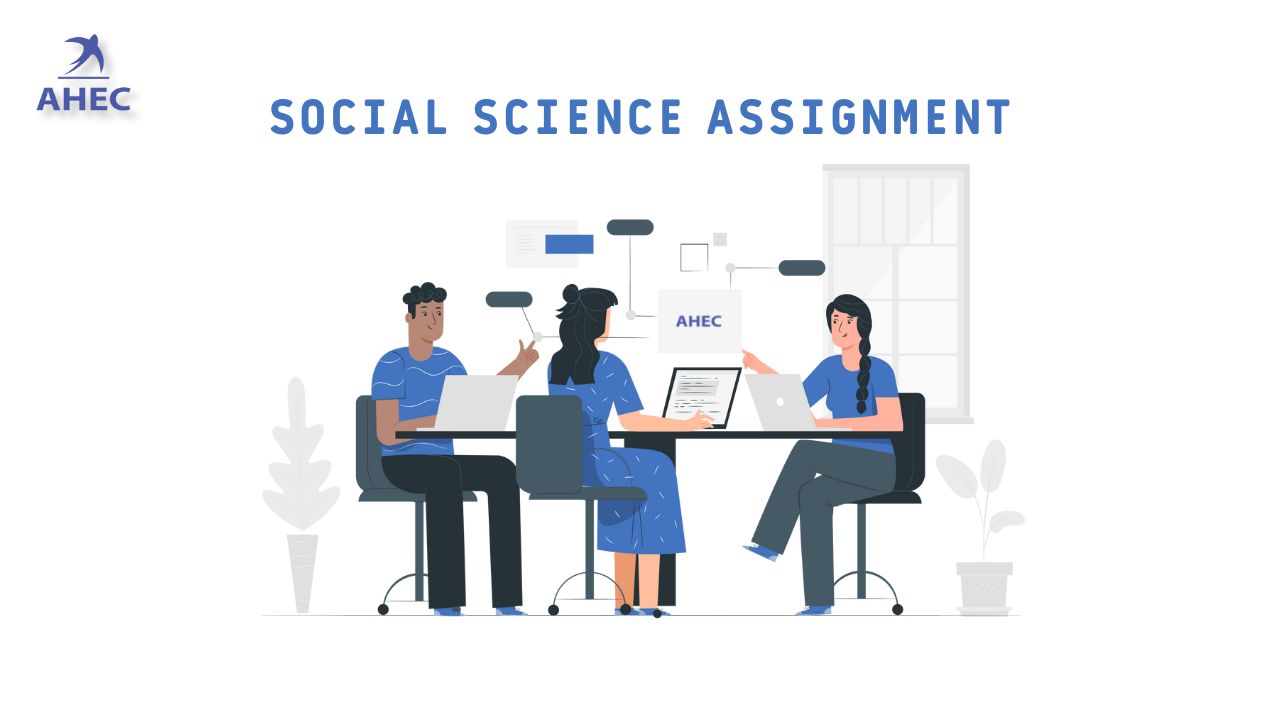
Social Science Assignment Help

Capital Budgeting Assignment Help

Trigonometry Assignment Help

Java Programming Assignment Help

Corporate Finance Planning Help

Sports Science Assignment Help

Accounting For Financial Statements Assignment Help

Robotics Assignment Help

Cost Accounting Assignment Help
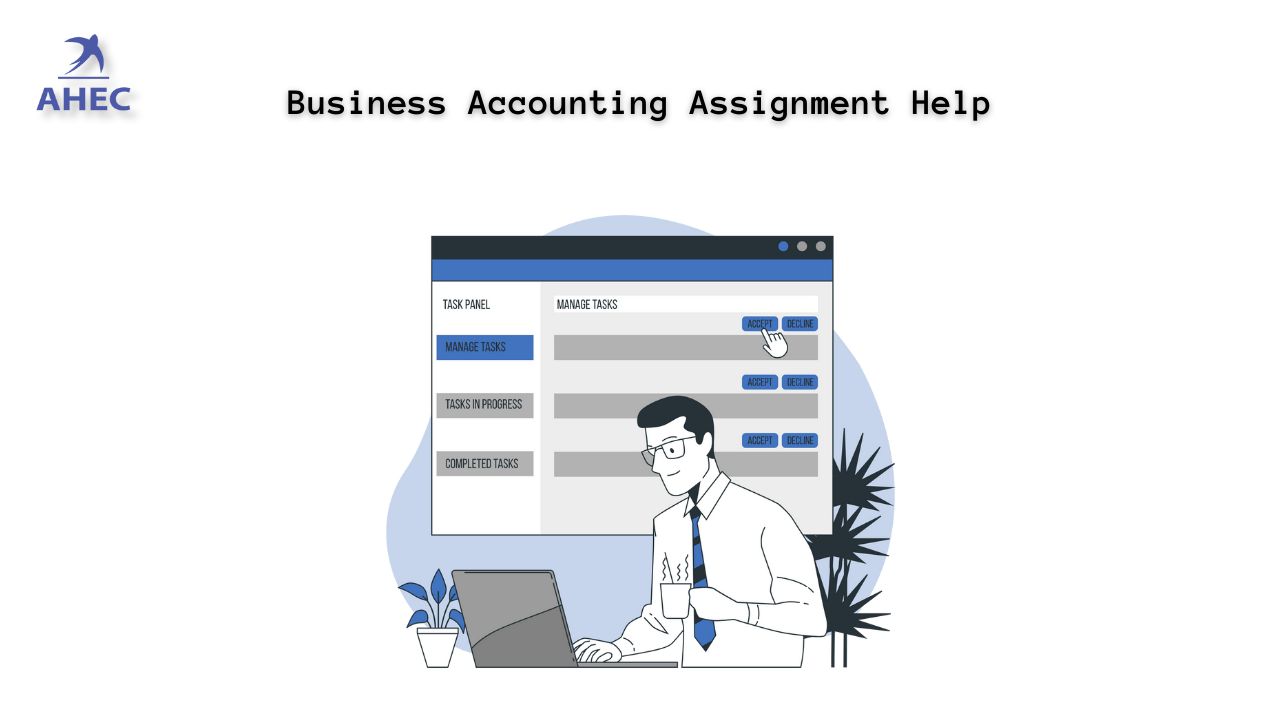
Business Accounting Assignment Help

Activity Based Accounting Assignment Help

Econometrics Assignment Help

Managerial Accounting Assignment Help

R Studio Assignment Help
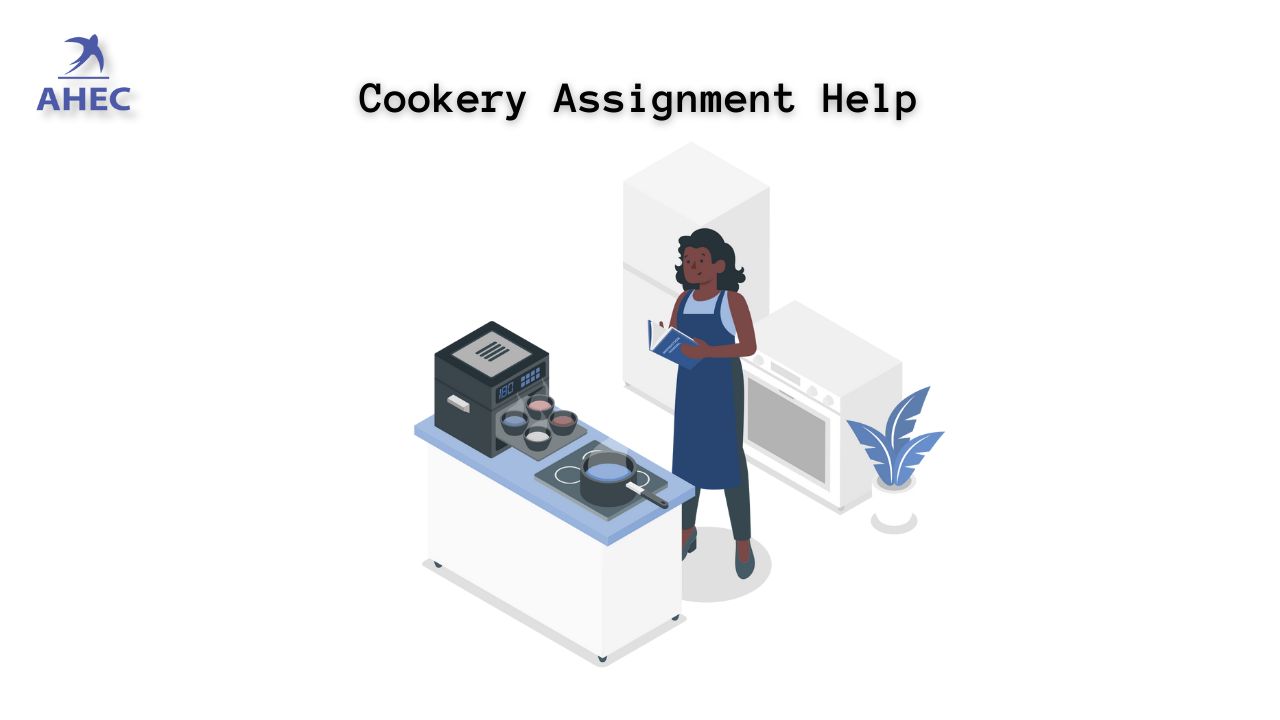
Cookery Assignment Help

Solidworks assignment Help

UML Diagram Assignment Help

Data Flow Diagram Assignment Help

Employment Law Assignment Help

Calculus Assignment Help

Arithmetic Assignment Help

Write My Assignment

Business Intelligence Assignment Help

Database Assignment Help

Fluid Mechanics Assignment Help

Web Design Assignment Help

Student Assignment Help

Online CPM Homework Help

Chemistry Assignment Help

Biology Assignment Help

Corporate Governance Law Assignment Help

Auto CAD Assignment Help

Public Relations Assignment Help

Bioinformatics Assignment Help

Engineering Assignment Help

Computer Science Assignment Help

C++ Programming Assignment Help

Aerospace Engineering Assignment Help

Agroecology Assignment Help

Finance Assignment Help

Conflict Management Assignment Help

Paleontology Assignment Help

Commercial Law Assignment Help

Criminal Law Assignment Help

Anthropology Assignment Help

Biochemistry Assignment Help

Get the best cheap assignment Help

Online Pharmacology Course Help

Urgent Assignment Help

Paying For Assignment Help

HND Assignment Help

Legitimate Essay Writing Help

Best Online Proofreading Services

Need Help With Your Academic Assignment

Assignment Writing Help In Canada

Assignment Writing Help In UAE

Online Assignment Writing Help in the USA

Assignment Writing Help In Australia

Assignment Writing Help In the UK

Scholarship Essay Writing Help

University of Huddersfield Assignment Help

Ph.D. Assignment Writing Help

Law Assignment Writing Help

Website Design and Development Assignment Help
Create a Special Occasion Speech in 2021
The act of delivering an address before an audience can be quite difficult. But, if you are hosting a special event it is possible for people to be expecting you to deliver an address. You might also be required to write a special speech by your teacher as part of your education. You will be given the option of creating an appropriate speech for a special occasion during your life.
This is why we've prepared an entire guide on how to write the perfect speech for special occasions of any kind and level. Get familiar with the fundamentals of your speech's forms topics, examples of the speech and then look through the inspirational examples that will provide you with a huge amount of motivation. Be positive and prepare to deliver a memorable speech for your special event!
Speeches for special occasions are thrilling and fun, but the writing process for speeches may be a challenge. When writing speeches for any occasion, it is important to be aware of the specific significance of the event since speeches are designed to serve the purpose of the occasion.
In contrast to the other speeches you've prepared to date the special occasion speech, are, as the name implies are crafted around an event such as graduation and weddings, farewells and award ceremony, welcoming speech, etc. If you're looking to deliver an impressive speech at an upcoming event or have been asked to write a speech for your class, you will get all the necessary information on the subject here.
What is a Special Occasion Speech?
Generally speaking, the speech for special occasions is very easy. The speech is usually given at particular occasions or events. Before you begin to work on the speech it is essential to know the event. It could be a college or school event such as a wedding, birthday celebration or graduation and retirement, anniversary and so on.
In general speeches for special occasions are less lengthy than, say informative speeches. If they are given, the speech should not last more than 5-10 minutes and remain completely clear and concise. The event may be so dramatic that the speech can be extremely emotional, and trigger a powerful reaction from the audience. The use of pathos in these kinds of speeches is very justified because the primary purpose of the speaker is to make the audience feel content or reflective based on the theme of the event.
Sometimes, a special occasion speech is a way to convey a message. Wedding speeches can be given to tell romantic tales about the groom and bride. As you can see, the style of each ceremony is specific and must be considered separately with respect to the event that is coming up.
To help you choose the best outline and the tone of your upcoming special event speech, go through the list of questions you'll have to answer prior to beginning work on your project.
Special Occasion Speech Outline
When you are preparing a special event speech, you must organize the speech around an appropriate outline to ensure maximum impact. The outline of a speech for special occasions could also differ slightly depending on the kind of special event speech. However, the structure remains much or identical. The outline for the special occasion speech comprises the following components:
Introduction:
Based on the event, it is important to structure the opening of your speech to convey the subject for the listeners. The introduction for the wedding toast is definitely likely to differ from those delivered on a day of farewell. In all speeches, there must be an opening line at the start in the intro. A few background information about the subject (i.e. the event) as well as the primary argument that is the reason of the speech.
Body Paragraphs
The body paragraphs in the speech should cover a variety of points that are in support of your main theme in the text. Based upon the duration and content of your speech, you must decide on the number of paragraphs that you'd like to incorporate into the speech. Three paragraphs is ideal for the body part that makes up the text. It is also important to introduce new ideas in each paragraph rather than overlaid points from various paragraphs.
Conclusion:
The conclusion of the essay should be as effective as the introduction. It must examine how the ideas included in the body section support the thesis that was mentioned in the intro. It is advised not to introduce any new idea in the closing sentence of the essay. The conclusion paragraph should summarize the essential elements discussed in the body section and end on a high note by speaking to the audience or perhaps the most important person at the time.
If you're planning to write a special speech, it's best to first sketch out the outline. This will assist you in organizing the entire content more efficiently.
Types of Special Occasion Speeches
The mood of a special occasion speech is directly related to the occasion it's committed to. There could be many different occasions to consider that we'll only consider the most popular ones to provide you with an understanding of how to craft an event-specific speech and make it a success. Every kind of speech comes with specific rules and guidelines that must be followed when you wish to communicate a clear communication to an audience.
Ceremonial Speeches
This kind of speech is typically delivered during ceremonies and is subject to the appropriate etiquette rules and all formalities to be followed. They are, in turn, ceremonies are divided into introductions, presentations, dedications, toasts and acceptances, farewells and speeches of eulogies and roasts.
Inspirational Speeches
If you've been asked to give an inspiring speech, your primary goal is to excite and inspire your audience. Most speeches are of a convincing nature, and you will need to share your personal story and facts, figures and concepts with your audience in order to convince them of your viewpoint and begin acting. However, it is a special occasion speech that isn't too difficult and yet emotion-driven enough to motivate your audience and allow them to believe in you.
Speech to Present an Award
An award presentation requires an award presentation, in the speech, a speaker will present the recipient the award, or a prize. The main purpose of this speech is to pay tribute to the recipient and highlight his accomplishments in connection with the award. While speeches that are presented to recipients may differ in both length and substance however, they should all contain some key components. The person who is presenting the award must not just emphasize the accomplishments of the person receiving the award, but also highlight the reason and significance behind the award given (O'Hair and Stewart 1999). Another aspect of the speech is personalizing the speech in order to make the award and the event more meaningful for the person who receives the award as well as the viewers.
Acceptance Speech
The award ceremony is typically followed by an acceptance speech that the awardee delivers following the moment of receiving the award. The speech is the opportunity to express appreciation for the award, as in addition to showing humility and dignity (O'Hair & Stewart, 1999). A speech like this should be planned ahead of time should it be it is possible. While preparing the person who will be receiving the speech will have a rough idea of whom to thank. This must not be overlooked at the occasion.
Keynote Address
Keynote addresses are the speech that outlines the primary or the common concept of a convention conference, or another large gathering. Conventions, expositions or conventions are typically arranged around a single idea and the keynote address is what sums up the primary message that is centered around the subject. For example, the organizers of a conference that has an overall theme of "Looking Forward--Looking Back" might wish for that the speaker who opens the event highlight the past of the organization as well as recount the achievements of the past and predict the future direction of the business and then invite the attendees to join in the new goal and vision. Similar to this example format, the majority of keynote speeches have basic elements.
After Dinner Speech
The speech after dinner is a distinct type of celebration speech. A speech after dinner has its main purpose to entertain, but also inform the audience of specific topics . This dual-purpose can make the speech after dinner difficult however with the right skills and practice, it can be a well-received speech can be delivered. Mark Twain made this type of speech very popular during his time and was a frequent speaker at numerous dinner parties. The dinners were long and were followed by hours of hilarious speeches (Patout 1978). These events are still held today and are usually planned prior to, during, or following the time of a civic or professional meeting (O'Hair and co. 2001) where food might be served.
Speech of Commencement:
A commencement speech is like a keynote speech which is delivered to mark the commencement ceremony at a school. These speeches are usually celebration-oriented and mark an important moment for the graduates. It is suggested to create speeches that are stimulating, entertaining and concise. Like the keynote speech the commencement speech must be delivered by someone who is well-known within the local community.
Speech of farewell:
Farewell speeches are usually given when a speaker is leaving a job or location. Although it is more popular for professionals but students can give a farewell speech the final day of college or school. These speeches typically reflect the memory of the speaker's time at the venue or event. It is the decision of the speaker to decide if he/she would like to disclose the reason of his departure within the message. But, the speaker must ensure that sensitive or private information is infringed upon.
Good Special Occasion Speech Topics for College Students
If you're unable to come up with any ideas for a special occasion speech then you can take a look at the various types of speeches for special occasions we have discussed. It is essential to identify yourself with a specific event and imagine yourself as an individual speaker. If you are able to do this you can make use of the tips above to create a great speech for special occasions on a variety of areas.
There are a variety of special occasion speeches you might encounter throughout your life. If you're looking to make a speech to your class, you could select one of the speeches listed above to impress your teacher.
Here are some suggestions for your speeches on special occasions:
- A toast to the wedding ceremony of a cousin
- An address to receive an award for sports.
- A hilarious roast at a birthday celebration of a friend.
- A speech to accept an award from the state government.
- A speech to commemorate the independence day of your local community
- An emcee's speech for the school's annual prize-giving ceremony.
- A farewell message on the last day of school
- A speech at the graduation day
Need Additional Expert Assistance? You Have Come To The Right Place
If you need additional assistance with your presentation then you can depend on the expert experts at AHECounselling. In reality, you can trust these professional and skilled writers to write any academic assignment. Along with a well-written academic paper, you receive a variety of incredible features when you purchase at AHECounselling.
Send your request to AHECounselling today and get the expert assistance with your documents today.

Top 10 Best Universities Ranking list in India 2022

Generic Conventions: Assignment Help Services

Research Paper Topics For Medical

Top 5 Resources for Writing Excellent Academic Assignments

How to Write a Literature Review for Academic Purposes

Tips for Writing a killer introduction to your assignment

How To Write A Compelling Conclusion For Your University Assignment

Research Papers Topics For Social Science

Best 150 New Research Paper Ideas For Students

7 Best Plagiarism Checkers for Students And Teachers in 2024
Enquiry form.

- school Campus Bookshelves
- menu_book Bookshelves
- perm_media Learning Objects
- login Login
- how_to_reg Request Instructor Account
- hub Instructor Commons
- Download Page (PDF)
- Download Full Book (PDF)
- Periodic Table
- Physics Constants
- Scientific Calculator
- Reference & Cite
- Tools expand_more
- Readability
selected template will load here
This action is not available.

15.3: How to Effectively Deliver Special Occasion Speeches
- Last updated
- Save as PDF
- Page ID 55008
Be Prepared
First, and foremost, the biggest mistake you can make when standing to deliver an entertaining speech is to underprepare or simply not prepare at all. We’ve stressed the need for preparation throughout this text, so just because you’re giving a wedding toast or a eulogy doesn’t mean you shouldn’t think through the speech before you stand up and speak out. If the situation is impromptu, even jotting some basic notes on a napkin is better than not having any plan for what you are going to say.
Remember, when you get anxious, as it inevitably happens in front of an audience, your brain doesn’t function as well as when you are having a relaxed conversation with friends. You often forget information. By writing down some simple notes, you’ll be less likely to deliver a bad speech.
Be Adaptive to the Occasion
Not all content is appropriate for all occasions. If you are asked to deliver a speech commemorating the first anniversary of a school shooting, then obviously using humor and telling jokes wouldn’t be appropriate. But some decisions about adapting to the occasion are less obvious. Consider the following examples:
- You are the maid of honor giving a toast at the wedding of your younger sister.
- You are receiving a Most Valuable Player award in your favorite sport.
- You are a sales representative speaking to a group of clients after a mistake has been discovered.
- You are a cancer survivor speaking at a high school student assembly.
How might you adapt your message and speaking style to successfully entertain these various audiences?
Remember that being a competent speaker is about being both personally effective and socially appropriate. Different occasions will call for different levels of social appropriateness. One of the biggest mistakes entertaining speakers can make is to deliver one generic speech to different groups without adapting the speech to the specific occasion.
Be Adaptive to Your Audience
Once again, we cannot stress the importance of audience adaptation enough in this text. Different audiences will respond differently to speech material, so the more you know about your audience the more likely you’ll succeed in your speech. One of our coauthors was once at a conference for teachers of public speaking. The keynote speaker stood and delivered a speech on the importance of public speaking. While the speaker was good and funny, the speech really fell flat. The keynote speaker basically told the public speaking teachers that they should take public speaking courses because public speaking is important. Right speech, wrong audience!
Be Mindful of the Time
The last major consideration for delivering entertaining speeches successfully is to be mindful of your time. Different entertaining speech situations have their own conventions and rules with regard to time. Acceptance speeches and toasts, for example, should be relatively short (typically under five minutes). A speech of introduction should be extremely brief—just long enough to tell the audience what they need to know about the person being introduced in a style that prepares them to appreciate that person’s remarks. In contrast, commencement speeches and speeches to commemorate events can run ten to twenty minutes in length.
It’s also important to recognize that audiences on different occasions will expect speeches of various lengths. For example, although it’s true that graduation commencement speakers generally speak for ten to twenty minutes, the closer that speaker heads toward twenty minutes the more fidgety the audience becomes. To hold the audience’s attention and fulfill the goal of entertaining, a commencement speaker would do well to make the closing minutes of the speech the most engaging and inspiring portion of the speech. If you’re not sure about the expected time frame for a speech, either ask the person who has invited you to speak or do some quick research to see what the average speech times in the given context tend to be.
Contributors and Attributions
- Template:ContribCCComm105

Want to create or adapt books like this? Learn more about how Pressbooks supports open publishing practices.
18.2 Special-Occasion Speeches
Learning objectives.
- Identify the different types of ceremonial speaking.
- Describe the different types of inspirational speaking.
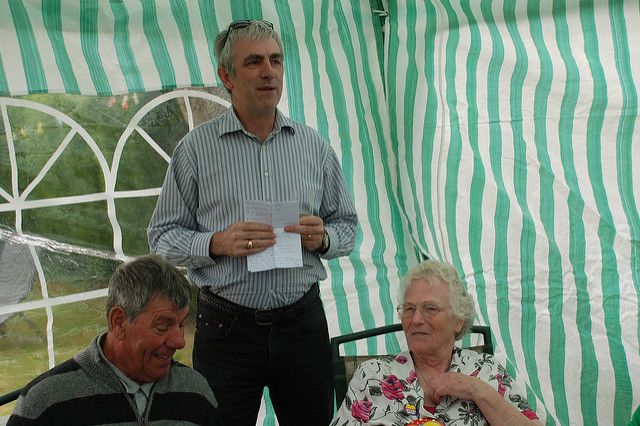
M+MD – Birthday Speech – CC BY-NC-ND 2.0.
Many entertaining speeches fall under the category of special-occasion speeches. All the speeches in this category are given to mark the significance of particular events. Common events include weddings, bar mitzvahs, awards ceremonies, funerals, and political events. In each of these different occasions, speakers are asked to deliver speeches relating to the event. For purposes of simplicity, we’ve broken special-occasion speeches into two groups: ceremonial speaking and inspirational speaking.
Ceremonial Speaking
Ceremonial speeches are speeches given during a ceremony or a ritual marked by observance of formality or etiquette. These ceremonies tend to be very special for people, so it shouldn’t be surprising that they are opportunities for speech making. Let’s examine each of the eight types of ceremonial speaking: introductions, presentations, acceptances, dedications, toasts, roasts, eulogies, and farewells.
Speeches of Introduction
The first type of speech is called the speech of introduction , which is a minispeech given by the host of a ceremony that introduces another speaker and his or her speech. Few things are worse than when the introducer or a speaker stands up and says, “This is Joe Smith, he’s going to talk about stress.” While we did learn the speaker’s name and the topic, the introduction falls flat. Audiences won’t be the least bit excited about listening to Joe’s speech.
Just like any other speech, a speech of introduction should be a complete speech and have a clear introduction, body, and conclusion—and you should do it all in under two minutes. This brings up another “few things are worse” scenario: an introductory speaker who rambles on for too long or who talks about himself or herself instead of focusing on the person being introduced.
For an introduction, think of a hook that will make your audience interested in the upcoming speaker. Did you read a news article related to the speaker’s topic? Have you been impressed by a presentation you’ve heard the speaker give in the past? You need to find something that can grab the audience’s attention and make them excited about hearing the main speaker.
The body of your introductory speech should be devoted to telling the audience about the speaker’s topic, why the speaker is qualified, and why the audience should listen (notice we now have our three body points). First, tell your audience in general terms about the overarching topic of the speech. Most of the time as an introducer, you’ll only have a speech title and maybe a paragraph of information to help guide this part of your speech. That’s all right. You don’t need to know all the ins and outs of the main speaker’s speech; you just need to know enough to whet the audience’s appetite. Next, you need to tell the audience why the speaker is a credible speaker on the topic. Has the speaker written books or articles on the subject? Has the speaker had special life events that make him or her qualified? Lastly, you need to briefly explain to the audience why they should care about the upcoming speech.
The final part of a good introduction is the conclusion, which is generally designed to welcome the speaker to the lectern. Many introducers will conclude by saying something like, “I am looking forward to hearing how Joe Smith’s advice and wisdom can help all of us today, so please join me in welcoming Mr. Joe Smith.” We’ve known some presenters who will even add a notation to their notes to “start clapping” and “shake speakers hand” or “give speaker a hug” depending on the circumstances of the speech.
Now that we’ve walked through the basic parts of an introductory speech, let’s see one outlined:
Specific Purpose: To entertain the audience while preparing them for Janice Wright’s speech on rituals.
Introduction: Mention some common rituals people in the United States engage in (Christmas, sporting events, legal proceedings).
Main Points:
- Explain that the topic was selected because understanding how cultures use ritual is an important part of understanding what it means to be human.
- Janice Wright is a cultural anthropologist who studies the impact that everyday rituals have on communities.
- All of us engage in rituals, and we often don’t take the time to determine how these rituals were started and how they impact our daily routines.
Conclusion: I had the opportunity to listen to Dr. Wright at the regional conference in Springfield last month, and I am excited that I get to share her with all of you tonight. Please join me in welcoming Dr. Wright (start clapping, shake speaker’s hand, exit stage).
Speeches of Presentation
The second type of common ceremonial speech is the speech of presentation . A speech of presentation is a brief speech given to accompany a prize or honor. Speeches of presentation can be as simple as saying, “This year’s recipient of the Schuman Public Speaking prize is Wilhelmina Jeffers,” or could last up to five minutes as the speaker explains why the honoree was chosen for the award.
When preparing a speech of presentation, it’s always important to ask how long the speech should be. Once you know the time limit, then you can set out to create the speech itself. First, you should explain what the award or honor is and why the presentation is important. Second, you can explain what the recipient has accomplished in order for the award to be bestowed. Did the person win a race? Did the person write an important piece of literature? Did the person mediate conflict? Whatever the recipient has done, you need to clearly highlight his or her work. Lastly, if the race or competition was conducted in a public forum and numerous people didn’t win, you may want to recognize those people for their efforts as well. While you don’t want to steal the show away from winner (as Kanye West did to Taylor Swift during the 2009 MTV Music Video Awards, for example http://www.mtv.com/videos/misc/435995/taylor-swift-wins-best-female-video.jhtml#id=1620605 ), you may want to highlight the work of the other competitors or nominees.
Speeches of Acceptance
The complement to a speech of presentation is the speech of acceptance . The speech of acceptance is a speech given by the recipient of a prize or honor. For example, in the above video clip from the 2009 MTV Music Video Awards, Taylor Swift starts by expressing her appreciation, gets interrupted by Kanye West, and ends by saying, “I would like to thank the fans and MTV, thank you.” While obviously not a traditional acceptance speech because of the interruption, she did manage to get in the important parts.
There are three typical components of a speech of acceptance: thank the givers of the award or honor, thank those who helped you achieve your goal, and put the award or honor into perspective. First, you want to thank the people who have given you the award or honor and possibly those who voted for you. We see this done every year during the Oscars, “First, I’d like to thank the academy and all the academy voters.” Second, you want to give credit to those who helped you achieve the award or honor. No person accomplishes things in life on his or her own. We all have families and friends and colleagues who support us and help us achieve what we do in life, and a speech of acceptance is a great time to graciously recognize those individuals. Lastly, put the award in perspective. Tell the people listening to your speech why the award is meaningful to you.
Speeches of Dedication
The fourth ceremonial speech is the speech of dedication . A speech of dedication is delivered when a new store opens, a building is named after someone, a plaque is placed on a wall, a new library is completed, and so on. These speeches are designed to highlight the importance of the project and possibly those to whom the project has been dedicated. Maybe your great-uncle has died and left your college tons of money, so the college has decided to rename one of the dorms after your great-uncle. In this case, you may be asked to speak at the dedication.
When preparing the speech of dedication, start by explaining how you are involved in the dedication. If the person to whom the dedication is being made is a relative, tell the audience that the building is being named after your great-uncle who bestowed a gift to his alma mater. Second, you want to explain what is being dedicated. If the dedication is a new building or a preexisting building, you want to explain what is being dedicated and the importance of the structure. You should then explain who was involved in the project. If the project is a new structure, talk about the people who built the structure or designed it. If the project is a preexisting structure, talk about the people who put together and decided on the dedication. Lastly, explain why the structure is important for the community where it’s located. If the dedication is for a new store, talk about how the store will bring in new jobs and new shopping opportunities. If the dedication is for a new wing of a hospital, talk about how patients will be served and the advances in medicine the new wing will provide the community.
At one time or another, almost everyone is going to be asked to deliver a toast . A toast is a speech designed to congratulate, appreciate, or remember. First, toasts can be delivered for the purpose of congratulating someone for an honor, a new job, or getting married. You can also toast someone to show your appreciation for something they’ve done. Lastly, we toast people to remember them and what they have accomplished.
When preparing a toast, the first goal is always to keep your remarks brief. Toasts are generally given during the middle of some kind of festivities (e.g., wedding, retirement party, farewell party), and you don’t want your toast to take away from those festivities for too long. Second, the goal of a toast is to focus attention on the person or persons being toasted—not on the speaker. As such, while you are speaking you need to focus your attention to the people being toasted, both by physically looking at them and by keeping your message about them. You should also avoid any inside jokes between you and the people being toasted because toasts are public and should be accessible for everyone who hears them. To conclude a toast, simply say something like, “Please join me in recognizing Joan for her achievement” and lift your glass. When you lift your glass, this will signal to others to do the same and then you can all take a drink, which is the end of your speech.
The roast speech is a very interesting and peculiar speech because it is designed to both praise and good-naturedly insult a person being honored. Generally, roasts are given at the conclusion of a banquet in honor of someone’s life achievements. The television station Comedy Central has been conducting roasts of various celebrities for a few years.
In this clip, watch as Stephen Colbert, television host of The Colbert Report , roasts President George W. Bush.
http://www.youtube.com/watch?v=BSE_saVX_2A
Let’s pick this short clip apart. You’ll notice that the humor doesn’t pull any punches. The goal of the roast is to both praise and insult in a good-natured manner. You’ll also see that the roaster, in this case Stephen Colbert, is standing behind a lectern while the roastee, President George W. Bush, is clearly on display for the audience to see, and periodically you’ll see the camera pan to President Bush to take in his reactions. Half the fun of a good roast is watching the roastee’s reactions during the roast, so it’s important to have the roastee clearly visible by the audience.
How does one prepare for a roast? First, you want to really think about the person who is being roasted. Do they have any strange habits or amusing stories in their past that you can discuss? When you think through these things you want to make sure that you cross anything off your list that is truly private information or will really hurt the person. The goal of a roast is to poke at them, not massacre them. Second, when selecting which aspects to poke fun at, you need to make sure that the items you choose are widely known by your audience. Roasts work when the majority of people in the audience can relate to the jokes being made. If you have an inside joke with the roastee, bringing it up during roast may be great fun for the two of you, but it will leave your audience unimpressed. Lastly, end on a positive note. While the jokes are definitely the fun part of a roast, you should leave the roastee knowing that you truly do care about and appreciate the person.
A eulogy is a speech given in honor of someone who has died. (Don’t confuse “eulogy” with “elegy,” a poem or song of mourning.) Unless you are a minister, priest, rabbi, imam, or other form of religious leader, you’ll probably not deliver too many eulogies in your lifetime. However, when the time comes to deliver a eulogy, it’s good to know what you’re doing and to adequately prepare your remarks. Watch the following clip of then-Senator Barack Obama delivering a eulogy at the funeral of civil rights activist Rosa Parks in November of 2005.
http://www.youtube.com/watch?v=pRsH92sJCr4
In this eulogy, Senator Obama delivers the eulogy by recalling Rosa Parks importance and her legacy in American history.
When preparing a eulogy, first you need to know as much information about the deceased as possible. The more information you have about the person, the more personal you can make the eulogy. While you can rely on your own information if you were close to the deceased, it is always a good idea to ask friends and relatives of the deceased for their memories, as these may add important facets that may not have occurred to you. Of course, if you were not very close to the deceased, you will need to ask friends and family for information. Second, although eulogies are delivered on the serious and sad occasion of a funeral or memorial service for the deceased, it is very helpful to look for at least one point to be lighter or humorous. In some cultures, in fact, the friends and family attending the funeral will expect the eulogy to be highly entertaining and amusing. While eulogies are not roasts, one goal of the humor or lighter aspects of a eulogy is to relieve the tension that is created by the serious nature of the occasion. Lastly, remember to tell the deceased’s story. Tell the audience about who this person was and what the person stood for in life. The more personal you can make a eulogy, the more touching it will be for the deceased’s friends and families. The eulogy should remind the audience to celebrate the person’s life as well as mourn their death.
Speeches of Farewell
A speech of farewell allows someone to say good-bye to one part of his or her life as he or she is moving on to the next part of life. Maybe you’ve accepted a new job and are leaving your current job, or you’re graduating from college and entering the work force. Whatever the case may be, periods of transition are often marked by speeches of farewell. Watch the following clip of Derek Jeter’s 2008 speech saying farewell to Yankee Stadium, built in 1923, before the New York Yankees moved to the new stadium that opened in 2009.
http://www.youtube.com/watch?v=HJrlTpQm0to
In this speech, Derek Jeter is not only saying good-bye to Yankee Stadium but also thanking the fans for their continued support.
When preparing a speech of farewell, the goal should be to thank the people in your current position and let them know how much you appreciate them as you make the move to your next position in life. In Derek Jeter’s speech, he starts by talking about the history of the 1923 Yankee Stadium and then thanks the fans for their support. Second, you want to express to your audience how much the experience has meant to you. A farewell speech is a time to commemorate and think about the good times you’ve had. As such, you should avoid negativity during this speech. Lastly, you want to make sure that you end on a high note. Derek Jeter concludes his speech by saying, “On behalf of this entire organization, we just want to take this moment to salute you, the greatest fans in the world!” at which point Jeter and the other players take off their ball caps and hold them up toward the audience.
Inspirational Speaking
The goal of an inspirational speech is to elicit or arouse an emotional state within an audience. In Section 18.2.1 “Ceremonial Speaking” , we looked at ceremonial speeches. Although some inspirational speeches are sometimes tied to ceremonial occasions, there are also other speaking contexts that call for inspirational speeches. For our purposes, we are going to look at two types of inspirational speeches: goodwill and speeches of commencement.
Speeches to Ensure Goodwill
Goodwill is an intangible asset that is made up of the favor or reputation of an individual or organization. Speeches of goodwill are often given in an attempt to get audience members to view the person or organization more favorably. Although speeches of goodwill are clearly persuasive, they try not to be obvious about the persuasive intent and are often delivered as information-giving speeches that focus on an individual or organization’s positives attributes. There are three basic types of speeches of goodwill: public relations, justification, and apology.
Speeches for Public Relations
In a public relations speech, the speaker is speaking to enhance one’s own image or the image of his or her organization. You can almost think of these speeches as cheerleading speeches because the ultimate goal is to get people to like the speaker and what he or she represents. In the following brief speech, the CEO of British Petroleum is speaking to reporters about what his organization is doing during the 2010 oil spill in the Gulf of Mexico.
http://www.youtube.com/watch?v=cCfa6AxmUHw
Notice that he keeps emphasizing what his company is doing to fix the problem. Every part of this speech is orchestrated to make BP look caring and attempts to get some amount of goodwill from the viewing public.
Speeches of Justification
The second common speech of goodwill is the speech of justification, which is given when someone attempts to defend why certain actions were taken or will be taken. In these speeches, speakers have already enacted (or decided to enact) some kind of behavior, and are now attempting to justify why the behavior is or was appropriate. In the following clip, President Bill Clinton discusses his decision to bomb key Iraqi targets after uncovering a plot to assassinate former President George H. W. Bush.
http://www.youtube.com/watch?v=6mpWa7wNr5M
In this speech, President Clinton outlines his reasons for bombing Iraq to the American people and the globe. Again, the goal of this speech is to secure goodwill for President Clinton’s decisions both in the United States and on the world stage.
Speeches of Apology
The final speech of goodwill is the speech of apology. Frankly, these speeches have become more and more commonplace. Every time we turn around, a politician, professional athlete, musician, or actor/actress is doing something reprehensible and getting caught. In fact, the speech of apology has quickly become a fodder for humor as well. Let’s take a look at a real apology speech delivered by professional golfer Tiger Woods.
http://www.youtube.com/watch?v=Xs8nseNP4s0
When you need to make an apology speech, there are three elements that you need to include: be honest and take responsibility, say you’re sorry, and offer restitution. First, a speaker needs to be honest and admit to doing something wrong. The worst apology speeches are those in which the individual tries to sidestep the wrongdoing. Even if you didn’t do anything wrong, it is often best to take responsibility from a public perception perspective. Second, say that you are sorry. People need to know that you are remorseful for what you’ve done. One of the problems many experts saw with Tiger Woods’s speech is that he doesn’t look remorseful at all. While the words coming out of his mouth are appropriate, he looks like a robot forced to read from a manuscript written by his press agent. Lastly, you need to offer restitution. Restitution can come in the form of fixing something broken or a promise not to engage in such behavior in the future. People in society are very willing to forgive and forget when they are asked.
Speeches for Commencements
The second type of inspirational speech is the speech of commencement , which is designed to recognize and celebrate the achievements of a graduating class or other group of people. The most typical form of commencement speech happens when someone graduates from school. Nearly all of us have sat through commencement speeches at some point in our lives. And if you’re like us, you’ve heard good ones and bad ones. Numerous celebrities and politicians have been asked to deliver commencement speeches at colleges and universities. One famous and well-thought-out commencement speech was given by famed Harry Potter author J. K. Rowling at Harvard University in 2008.
http://www.youtube.com/watch?v=nkREt4ZB-ck
J. K. Rowling’s speech has the perfect balance of humor and inspiration, which are two of the main ingredients of a great commencement speech.
If you’re ever asked to deliver a commencement speech, there are some key points to think through when deciding on your speech’s content.
- If there is a specific theme for the graduation, make sure that your commencement speech addresses that theme. If there is no specific theme, come up with one for your speech. Some common commencement speech themes are commitment, competitiveness, competence, confidence, decision making, discipline, ethics, failure (and overcoming failure), faith, generosity, integrity, involvement, leadership, learning, persistence, personal improvement, professionalism, reality, responsibility, and self-respect.
- Talk about your life and how graduates can learn from your experiences to avoid pitfalls or take advantages of life. How can your life inspire the graduates in their future endeavors?
- Make the speech humorous. Commencement speeches should be entertaining and make an audience laugh.
- Be brief! Nothing is more painful than a commencement speaker who drones on and on. Remember, the graduates are there to get their diplomas; their families are there to watch the graduates walk across the stage.
- Remember, while you may be the speaker, you’ve been asked to impart wisdom and advice for the people graduating and moving on with their lives, so keep it focused on them.
- Place the commencement speech into the broader context of the graduates’ lives. Show the graduates how the advice and wisdom you are offering can be utilized to make their own lives better.
Overall, it’s important to make sure that you have fun when delivering a commencement speech. Remember, it’s a huge honor and responsibility to be asked to deliver a commencement speech, so take the time to really think through and prepare your speech.
Key Takeaways
- There are eight common forms of ceremonial speaking: introduction, presentation, acceptance, dedication, toast, roast, eulogy, and farewell. Speeches of introduction are designed to introduce a speaker. Speeches of presentation are given when an individual is presenting an award of some kind. Speeches of acceptance are delivered by the person receiving an award or honor. Speeches of dedication are given when a new building or other place is being opened for the first time. Toasts are given to acknowledge and honor someone on a special occasion (e.g., wedding, birthday, retirement). Roasts are speeches designed to both praise and good-naturedly insult a person being honored. Eulogies are given during funerals and memorial services. Lastly, speeches of farewell are delivered by an individual who is leaving a job, community, or organization, and wants to acknowledge how much the group has meant.
- Inspirational speeches fall into two categories: goodwill (e.g., public relations, justification, and apology) and speeches of commencement. Speeches of goodwill attempt to get audience members to view the person or organization more favorably. On the other hand, speeches of commencement are delivered to recognize the achievements of a group of people.
- Imagine you’ve been asked to speak before a local civic organization such as the Kiwanis or Rotary Club. Develop a sample speech of introduction that you would like someone to give to introduce you.
- You’ve been asked to roast your favorite celebrity. Develop a two-minute roast.
- Develop a speech of commencement for your public speaking class.
Stand up, Speak out Copyright © 2016 by University of Minnesota is licensed under a Creative Commons Attribution-NonCommercial-ShareAlike 4.0 International License , except where otherwise noted.
Share This Book
My Speech Class
Public Speaking Tips & Speech Topics
Special Occasion Speech Topics [With Setup Checklist]

Jim Peterson has over 20 years experience on speech writing. He wrote over 300 free speech topic ideas and how-to guides for any kind of public speaking and speech writing assignments at My Speech Class.
Special occasion speech topics checks for most particular roasts and toasts, for motivational speakers on the speakers podium and an easy method to outline this genre. Plus links to my ideas:
What actually is good exceptional and exclusive occasional speaking?
- Above all, there has to be a clear connection with the unique purpose of the occasion.
- lso the special occasional speech topics have to be both informational and persuasive.
- And third, share your thoughts for a better understanding of the goal and the context of the upcoming event.
No need to emphasize that you have to be fully aware of your audience. The key to find the right special speech topics is addressing five W’s and one H. Ask what, why, to whom, when, where, and how long. I will discuss these questions below.
In this article:
1. Why? What is the purpose of the event?
2. do you want to celebrate or praise, end of the year, christmas evenings, farewell address, special occasion speech outline, your checklist to find special occasion speech topics.

- What is the purpose of the meeting, event, conference or ceremony?
- What are the demands and wishes regarding your special occasional speech topics?
- Are there special requirements related to the singularity of the event?
- What was the first thing that comes into your mind when you were invited?
- Are you invited because of your expertise or professional abilities?
- What do you know about the character and ambiance?
- Why did you accept the honor to be public speaker?
- What do you want your public to remember, consider, support or believe in? That’s the special purpose of this public speaking assignment, your specific topic statement.
- To conclude: what’s the purpose?
Before you determine specific aims, first determine the general goal of your special occasional speech topics. Do you want to entertain or amuse, roasts and toasts perhaps?
Can We Write Your Speech?
Get your audience blown away with help from a professional speechwriter. Free proofreading and copy-editing included.
An after dinner speaker tries to ridicule the listeners by spoofing persons or to exaggerate familair situations.
Ask yourself: who or what is being honored or set in a positive light? Why? Accomplishments?
If it’s a person: how does the life and works of this person influence other people? Tribute speech topics stimulate and strengthen the audiences’ sentiments of adoration and excitement. Share joy over someone’s character, or over successes at the beginning or completion of a project or season.
Other input to celebrate or praise can be developed for weddings, birthdays , and roasts and toasts.
Commemorative orals honor and strengthen the values of a person, group, institution, place, event, idea or subject. Focus on the values of life and past, present, and future of society.
The special occasion speech topics have to be symbolic. Eulogies honor a deceased person and praise the person’s virtues and character. Tell what we learned and why we are thankful.
3. Inspire your audience? Inspirational and motivational speakers base their talks on policy or value claims. Uplift the moral of an organization.
What do you want to accomplish? How can you persuade the audience to belief, feel or think the same? This is the core of that type of occasion speech topics.
With commencement special occasion topics you can offer insight and knowledge by revealing your own personal ideas and thoughts. List behavioral standards and indentify how the educational institution, company or other group could strengthen those standards.
4. Set a social agenda? Keynote speeches reinforce or establish new goals in special occasional speech topics. Set the tone and arouse enthusiastic emotions for upcoming discussions.
Of course there are more other unique moments at which a bit more ceremonial special occasion speech topics are expected. E.g. introductions and announcements, vote of thanks speeches, stump speeches and events at which people are being welcomed, say farewell, retire, nominated or accept a special award.
5. Who or what do you address? What kind of organisation? In case of a celebration or honoring ceremony: who is being praised? What are her or his needs and expectations?
Is it a special group competition, group discussion or special event?
6. When will you speak? Will a host introduce you and your notes? Prearrange that you don’t cover the same special occasion speech topic!
Are you the only public speaker? If there are more people, then bear in mind to wake up the audience if you have for example to deliver as speaker number seven.
7. Where are you speaking? What is the ambiance, can you maintain the proper atmosphere? How big is the room? A public speakers podium? A microphone?
Can you get in touch with your listeners? All very important for developing tailor-made content.
8. How long are you requested to speak? If extemporaneously, then prepare notes with some keywords. Usually, these talks are short, for instance self-introduction special occasion speeches .
Occasion Speech Topics – Detailed Instructions
Occasion speech topics and ideas for a public speaking speech on birthdays, end of the year celebrations, Christmas evenings, farewell addresses and retirement speech talks. These are a few examples of special events most people hesitate to accept an invitation to speak.
I help a little bit with some pleasing public speaking tips and rough ideas, accessible suggestions and general themes you can bring in.
In general, stick to one single highlight of the happy birthday person. That is often enough for a small one-way chat in two or three minutes. I would recommend you keep a sharp eye on the time.
Because there are other persons with other happy birthday texts perhaps. Following is a list of potential ideas for occasion speech topics.
See the samples below as a primer. Use your own fantasy. I have listed them in alphabetical order:
Think about a party, at the celebration dinner, even at an official ceremony or any other particular occasion you have to speak in public and need input.
Aunt – List her funny habits and sayings. Or her contributions to the local community, charity or church.
Brother – Tell about your interesting conversations full of keen and quick insight. and how you match perfectly with intuition.
Brother in Law – Focus on his hobbies and sports activities, these are really ideal occasion speech topics, you can use them for another public speaking speech too.
Daughter – Describe how she has grown up and why she is special to you. Or admire her attainments and accomplishments at high school or college.
Grandfather – Mention his position as head of the family and praise his great advices and words of wisdom. Tell how he introduced you to treasures in museums when you were young.
Grandmother – Let everybody know that she is a fabulous cooking queen. State that you appreciate her love and care in good and in bad times.
Take you time to speak out your occasion speech topics, due to the fact that older people wants to hear everything and easily are disturbed by general noise at a birthday party. Some goes for your grandfather too of course.
Or in case of a big surprise party with very noisy partygoers.
Father – Emphasize he has always been – and for sure will be – your greatest supporter in life, thank him for the profitable tips he gave you, and for qualities of respect and self-esteem he taught you.
Friend – Tell why she or he is special to you. Describe how you have helped each other through exams, holiday trips, parties, and so on.
There are a lot of special occasion speech topics to think of when it comes to speak at a birthday celebration of a friend.
Husband – Tell why he is your soulmate. Retrospect a bit, refer back to the time you were just married. Do not tend to create a complete contemplation of the past, but bring in happy memories about adventures you shared together.
Mother – Express gratitude for all the things your mother did for you, your relatives and friends. Be grateful for her kindness and support in the past year.
Perhaps you should thank her for babysitting for her grandkids? Think about one big thing you like to thank for.
Sister – Let her know that your love for her is unconditional. Bring in a few vivid narratives about the time you were kids and played together in the playground near your home.
Sister in Law – Mention her contributions to your family and what she means for your brother. Roast you brother if you like. About how his outfit and looks are improved; you see the hand of your sister in law 🙂
Son – Come up with some funny anecdotes from his childhood. You could tell about the tasks in the household you have fixed together, or fishing days or the lazy nice days you spend at the cabin or cottage.
Uncle – Say why you like him – his jokes? his humor? his advices, fishing trips? Mention and praise his productivity at home; his do-it-yourself efforts and achievements.
Wife – Show your love and state that you always can trust and rely on her. There is a woman behind every successful man, the saying goes …
Sketch why this is perfectly fitting the two of you. Close with a kiss of course!
Your Own Birthday – Thank all guests for coming. Show how much they mean to you. Thank them for all birthday gifts and presents they brought in.
Now for some other special occasion speech ideas. I refer you to my other, more specialized pages on these three types:
New Year’s resolutions, a short review of the past year, look forward and reveal the things you want to do in the new year.
The history of the Christmas evenings celebration, traditions, trees and decorations, carols.
If you leave – Thank all for their cooperation, kindness, support, or even friendship. Wish them all the best. Use my checklists in this farewell occasion speech topics primer.
If someone else is leaving – Tell that you will miss her or him. Thank for all friendship and love.
The boss to an employee or client – Express thanks for the trust, loyalty and support. Find a gift that fits the future activities of the retirement and build a story around it.
A colleague, boss or client to a retiring co-worker – Focus on his or her talents, achievements and successful projects. Mention some funny experiences and wonderful moments.
Your own retirement – Announce what you will do from now on. Thank your boss and all colleagues for their support, lessons and friendship.
Dig and find very special occasion speech topics. And do not forget to list some milestones in your career.
Go back in history and perhaps you will discover charming or alluring information about collegues at some great events and meetings you attend 🙂 Who knows …
Here’s a simple and effective way to outline your speech topic ideas for your speech writing purposes:
THE INTRODUCTION Wake up interest. State your specific statement. Relate it to your audience. List the main points of the body – your main occasional thoughts on the speakers podium.
THE BODY List the main special occasional speech topics and construct the successes, pros and cons, values, examples, funny remarks, narratives, anecdotes or insight stories.
THE CONCLUSION An amusing general remark, or joke or a toast are in general good and especially last, closing public speaking topics:
78 Agriculture Speech Topics
1 Minute Speech Topics : 8 Samples
Leave a Comment
I accept the Privacy Policy
Reach out to us for sponsorship opportunities
Vivamus integer non suscipit taciti mus etiam at primis tempor sagittis euismod libero facilisi.
© 2024 My Speech Class
- Forgot your Password?
First, please create an account
Special occasion speeches, 1. speeches for special occasions.
As the name implies, special occasion speeches are speeches given on special occasions. There are many examples of special occasions where it might be appropriate to deliver a speech.
For example, an individual might give a speech at a wake or memorial for an audience of friends and families who knew the person being memorialized. Clearly, this speech will be very different from a toast given at a wedding, which is also an example of a special occasion speech and will have a much more celebratory tone. A commencement or award ceremony are some other special occasions during which someone may give a speech.
Special occasion speeches are usually shorter than informative or persuasive speeches. Special occasion speeches are usually less than ten minutes long, demonstrating that their purpose differs from other speeches delivered at a conference or political rally.
Depending on the context, the purpose of a special occasion speech may be to remember, to praise, or to tease humorously. They may contain the use of pathos that aims to convince the audience to be happy, possibly by being comedic. However, they may use pathos to make the audience reflective, as in a speech given at a memorial service.
Special occasion speeches might inform the audience. While special occasion speeches may be informative, their purpose is always specific to the context and audience that will be hearing them.

term to know Toast To engage in a salutation and/or accompanying raising of glasses while drinking alcohol (or other appropriate beverage) in honor of someone or something.
1a. The Speech of Introduction
Sometimes, you may be asked to speak at an event or occasion before the headlining speech, or be called upon to introduce a keynote speaker or panelist.
The introduction speech is no less significant than the keynote. It's important because you're getting your audience warmed up and accustomed to who will be speaking about the topics and issues they care about. Just as we appreciate when friends introduce us to new acquaintances, your audience appreciates being introduced to their main speaker.
There may be times when you know the person that you're introducing, so it might be easier to talk about them. Just be mindful of the context of both your relationship and the event itself. For example, you might be buddies with a leading scientist in biology at a biology conference, but that doesn't mean you should introduce him by the nicknames you call each other on Facebook. Knowing the person you need to introduce is also helpful as you can ask them directly what information they would or would not like shared about them.
There will also be times when you may only have a passing knowledge about the person you're introducing, or perhaps you might not know anything about them. But in the age of the internet search, it shouldn't take very long to find some basic information about them that is relevant to their speech, such as their professional experience or publications. You may also be able to contact them to see if they can provide you with a professional biography. You may want to distill that into your own prepared remarks in the latter instance.
The good news is that introduction speeches are usually brief and always prepared. Whether you're reading from a script or teleprompter, you typically won't be asked to introduce someone you don't know without preparation.
terms to know Introduce To present one person to another. Keynote A speech that sets the main theme of a conference or other gathering; a keynote speech or keynote address.
1b. The Speech to Secure Goodwill
Goodwill speeches seek to introduce oneself or an entity to another group, organization, or even country, while building a goodwill relationship with that audience. They may occur on a small scale, such as through a first speech by the new CEO to a company, or on a large scale, e.g., a world leader touring another country.
Goodwill speeches are informative and persuasive. You are persuading your audience to consider you favorably. You will want to make the case about what makes you qualified or relevant to them. Goodwill speeches also often highlight shared customs, values, morals, and beliefs. Goodwill speeches do not make assumptions or judgments about their audience and do not intimidate, embarrass, or offend them.

Perhaps one of the most famous goodwill speeches was made by President John F. Kennedy in 1963 in Berlin, Germany. Often referred to as the "Ich bin ein Berliner" ("I am a Berliner") speech, it discusses how to build rapport and favorable attitudes between two differing nations:
I am proud to come to this city as the guest of your distinguished Mayor, who has symbolized throughout the world the fighting spirit of West Berlin. And I am proud to visit the Federal Republic with your distinguished Chancellor who for so many years has committed Germany to democracy and freedom and progress, and to come here in the company of my fellow American, General Clay, who has been in this city during its great moments of crisis and will come again if ever needed. You live in a defended island of freedom, but your life is part of the main. So let me ask you, as I close, to lift your eyes beyond the dangers of today, to the hopes of tomorrow, beyond the freedom merely of this city of Berlin, or your country of Germany, to the advance of freedom everywhere, beyond the wall to the day of peace with justice, beyond yourselves and ourselves to all mankind. Freedom is indivisible, and when one man is enslaved, all are not free. When all are free, then we can look forward to that day when this city will be joined as one and this country and this great Continent of Europe in a peaceful and hopeful globe. When that day finally comes, as it will, the people of West Berlin can take sober satisfaction in the fact that they were in the front lines for almost two decades. All free men, wherever they may live, are citizens of Berlin. And, therefore, as a free man, I take pride in the words, "Ich bin ein Berliner."
term to know Goodwill A favorably disposed attitude toward someone or something.
1c. The Speech of Presentation or Acceptance

When you think of an acceptance speech, you might think of actress Sally Field clutching her Oscar award shouting into the microphone: "You like me! You really, really like me!" But often, acceptance speeches are far more humble .
If you've been nominated for an award or honor, you may be asked to prepare an acceptance speech: remarks in the event you win the award. Other times, you may know that you have won, making it substantially easier to prepare.
Acceptance speeches may vary in length. For a multi-award event, such as the Academy Awards, winners are given a brief ninety seconds to make their remarks. At other times, a person could be the single awardee of the evening and have substantially more time to speak, often doubling as keynote speaker.
Acceptance speeches thank the awarding individual or organization. Depending on the award, the awardee may speak about their experience and emotions of getting that award or the work to achieve that award. If others have helped you in your endeavors, you may give them a quick thanks by name as well. If you're partnered, you may thank your spouse, partner, or children. And if it's a benefit for the Humane Society, it might even be appropriate to thank your pets!
Like any speech, consider your audience and the context of the speech. While being mindful of your time, get your thanks in while being gracious and humble. Even if you are one of many in a field of nominees, it's always a good idea to prepare an acceptance speech so that if you are named the winner, you won't be fumbling for your words on stage.
Similar to the introductory speech, presentation speeches are typically prepared in advance and may describe the awardee before naming them, or describe the circumstances for their awarding.
If the award is named or in memory of someone, you may describe why that award was named in that person's honor, such as the Pulitzer or Nobel Prize. You may talk about the criteria for selecting the award and how the awardee met that criteria for their specific work.
The speech of presentation is one that is particularly enjoyable to give, as the awardee is often honored to have received the award in the first place!
terms to know Acceptance Receiving something that is offered or awarded. Humble Not proud, arrogant, or assuming; modest.
1d. The Commemorative Speech: Dedications and Eulogies
Commemorative speeches celebrate and honor the memory of someone or something. During various memorial holidays and observances throughout the year, such as Memorial Day in the United States, many people commemorate the occasion by remembering fallen veterans. In England, the English commemorate their fallen heroes by wearing poppies on Remembrance Day.
There are two types of commemorative speeches: dedication speeches and eulogies .
The dedication is a very specific type of commemorative speech. It is often accompanied by a ceremony commemorating an official opening or completion of something. The speech honors the event, individual, or groups of people to which the items are being dedicated.
The following is an excerpt from the dedication of the National Cemetery in Gettysburg, Pennsylvania, in 1863, by then President Abraham Lincoln:
Fourscore and seven years ago our fathers brought forth on this continent a new nation, conceived in Liberty, and dedicated to the proposition that all men are created equal. Now we are engaged in a great civil war, testing whether that nation, or any nation so conceived and so dedicated, can long endure. We are met on a great battlefield of that war. We have come to dedicate a portion of that field, as a final resting-place for those who here gave their lives that that nation might live. It is altogether fitting and proper that we should do this. But, in a larger sense, we cannot dedicate, we cannot consecrate—we cannot hallow—this ground. The brave men, living and dead, who struggled here, have consecrated it far above our poor power to add or detract. The world will little note nor long remember what we say here, but it can never forget what they did here. It is for us, the living, rather, to be dedicated here to the unfinished work which they who fought here have thus far so nobly advanced. It is rather for us to be here dedicated to the great task remaining before us—that from these honored dead we take increased devotion to that cause for which they gave the last full measure of devotion; that we here highly resolve that these dead shall not have died in vain; that this nation, under God, shall have a new birth of freedom; and that government of the people, by the people, for the people, shall not perish from the earth.
terms to know Commemorate To honor the memory of someone or something with a ceremony. Dedication A ceremony marking an official completion or opening. Eulogy An oration to honor a deceased person, usually at a funeral.
Similar to a dedication speech, a eulogy is a very specific type of commemorative speech delivered at a person's funeral. Where a dedication may commemorate an event, a eulogy commemorates a specific deceased person.
Eulogies may include memories and anecdotes of that person's life. Rather than focusing on how or why a person died, the eulogy celebrates the life he lived. It can be extremely emotionally difficult to deliver a eulogy for a friend or family member. In many circles, it is often expected that the eulogy reader may cry or become upset while speaking as they remember their loved one.

President Lincoln was remembered by Josiah Gilbert Holland, on the occasion of his funeral in 1865:
Our President is dead. He has served us faithfully and well. He has kept the faith; he has finished his course. Henceforth there is laid up for him a crown of glory, which the Lord, the righteous Judge, shall give him in that day. And He who gave him to us, and who so abundantly blest his labors, and helped him to accomplish so much for his country and his race, will not permit the country which He saved to perish. I believe in the overruling providence of God, and that, in permitting the life of our Chief Magistrate to be extinguished, He only closed one volume of the history of His dealings with this nation, to open another whose pages shall be illustrated with fresh developments of His love and sweeter signs of His mercy. What Mr. Lincoln achieved, he achieved for us; but he left as a choice a legacy in his Christian example, in his incorruptible integrity, and in his unaffected simplicity, if we will appropriate it, as in his public deeds. So we take this excellent life and its results, and, thanking God for them, cease all complaining and press forward under new leaders to now achievements, and the completion of the great work which he who has gone left as a sacred trust upon our hand.
1e. The Inspirational Speech
When we think of the word inspire , we typically think of motivational and rousing ideas and imagery. In a very literal sense, inspiration is a synonym for the biological function of inhalation—by inspiration, we take air into our lungs.
It only makes sense, then, that inspirational words, images, and situations cause our chests to swell with pride, excitement, or even anger. Inspiration can elicit extreme emotional responses within us. As such, the inspirational speech can elicit those same strong emotional responses within our audiences, no matter their size.
Some of history's most famous inspirational speeches include Martin Luther King Jr.'s "I Have a Dream" speech and President John F. Kennedy's inauguration speech. A modern-day example could be President Barack Obama's "Yes We Can" campaign stump speech made in 2008.
The power of these speeches lies in the rousing words and imagery that capitalize on the emotional response of their audiences. Inspirational speakers are often characterized as warm, encouraging, and able to connect and engage with their audiences instantly.
A successful inspirational speech is memorable, truly inspiring, and can stand the test of time.
Not all messages are necessarily warm and fuzzy; take, for example, the speech made popular by actor Mel Gibson as William Wallace in the film, Braveheart , as he motivates his ragtag band of Scotsmen to fight against the English troops:
Wallace: Sons of Scotland, I am William Wallace. Young soldier: William Wallace is 7 feet tall. Wallace: Yes, I've heard. Kills men by the hundreds, and if he were here he'd consume the English with fireballs from his eyes and bolts of lightning from his arse. I AM William Wallace. And I see a whole army of my countrymen here in defiance of tyranny. You have come to fight as free men, and free men you are. What would you do without freedom? Will you fight? Veteran soldier: Fight? Against that? No, we will run; and we will live. Wallace: Aye, fight and you may die. Run and you'll live—at least a while. And dying in your beds many years from now, would you be willing to trade all the days from this day to that for one chance, just one chance to come back here and tell our enemies that they may take our lives, but they'll never take our freedom! Wallace and Soldiers: Alba gu bra! (Scotland forever!)
term to know Inspire To infuse into the mind; to communicate to the spirit; to convey, as by a divine or supernatural influence; to disclose preternaturally; to produce in, as by inspiration.
1f. Other Speeches: Farewells, Toasts, and After-Dinner Remarks
Special occasion speeches are, to put it lightly, the "life of the party" when it comes to public speaking. Farewells , toasts , and after-dinner remarks are often the lightest of public speaking fare, requiring little in preparation or execution. Humor, anecdote, and brevity are notable qualities of these types of speeches.
Still, like any public speaking experience, it helps to be familiar with your subject and able to prepare, even if briefly beforehand. These speeches are often not written extensively before the speaking engagement. You may jot down a few key talking points or a specific joke or anecdote you wish to include.
Like preparing for any speech, regardless of formality, consider the audience, venue, and occasion for which you're speaking. It's also beneficial, especially for wedding toasts, to consider the span of ages in the room. If there is a particularly older or younger crowd, you may need to tailor your material accordingly so all audience members can relate.
Many times, farewells, toasts, and after-dinner speeches are made in honor or celebration of someone else: a guest or guests of honor, or perhaps the event host or hostess themselves. While it's acceptable to poke fun, make sure you do so in a way that's kind and not cruel. Unless you're specifically giving remarks for a full-on roast , you shouldn't overly embarrass your guest of honor. You're there to entertain, not humiliate.

terms to know Farewell A wish of happiness or welfare at parting, especially a permanent departure; the parting compliment; a goodbye; adieu. Toast To engage in a salutation and/or accompanying raising of glasses while drinking alcohol (or other appropriate beverage) in honor of someone or something. Roast A comical event where a person is subjected to verbal attack yet may be praised by sarcasm and jokes.
summary In this lesson, you learned that special occasion speeches tend to be shorter speeches addressed to a particular audience, and their tone depends on their context. Speeches of introduction are delivered to an audience prior to a keynote speech. Goodwill speeches seek to persuade an audience to be in favor of you and who or what you represent. Presentation speeches are used to introduce an award or other special occasion, while acceptance speeches are delivered by the recipient of an honor. There are two main types of commemorative speeches : A eulogy honors a deceased person, while a dedication honors a specific event, group, or individual. Inspirational speeches elicit strong emotional responses from their audiences, while farewells, toasts, and after-dinner remarks use humor and anecdotes to entertain a crowd or celebrate a guest of honor.
Source: THIS TUTORIAL HAS BEEN ADAPTED FROM "BOUNDLESS COMMUNICATIONS" PROVIDED BY BOUNDLESS.COM. ACCESS FOR FREE AT oer commons. LICENSED UNDER CREATIVE COMMONS ATTRIBUTION-SHAREALIKE 4.0 INTERNATIONAL.
Receiving something that is offered or awarded.
To honor the memory of someone or something with a ceremony.
A ceremony marking an official completion or opening.
An oration to honor a deceased person, usually at a funeral.
A wish of happiness or welfare at parting, especially a permanent departure; the parting compliment; a goodbye; adieu.
A favorably disposed attitude toward someone or something.
Not proud, arrogant, or assuming; modest.
To infuse into the mind; to communicate to the spirit; to convey, as by a divine or supernatural influence; to disclose preternaturally; to produce in, as by inspiration.
To present one person to another.
A speech that sets the main theme of a conference or other gathering; a keynote speech or keynote address.
A comical event where a person is subjected to verbal attack yet may be praised by sarcasm and jokes.
To engage in a salutation and/or accompanying raising of glasses while drinking alcohol (or other appropriate beverage) in honor of someone or something.
- Privacy Policy
- Cookie Policy
- Terms of Use
© 2024 SOPHIA Learning, LLC. SOPHIA is a registered trademark of SOPHIA Learning, LLC.
Put a stop to deadline pressure, and have your homework done by an expert.
230 Fantastic Special Occasion Speech Topics To Impress Audience
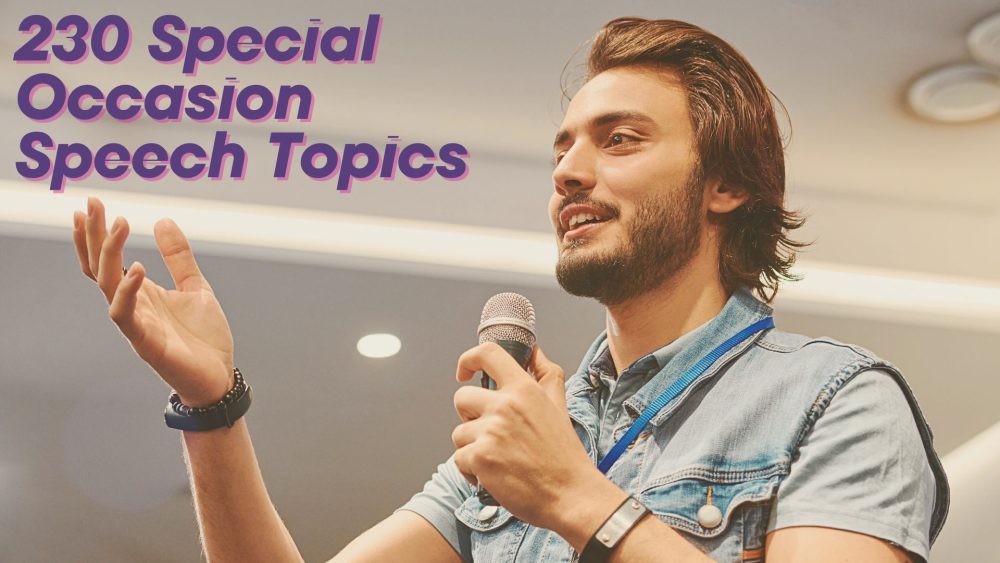
Are you facing the daunting task of crafting a special occasion speech that will leave a lasting impact on your audience? Whether you’re a student preparing for a class presentation, a best man gearing up for a wedding toast, or an aspiring public speaker looking to refine your skills, we’ve got you covered! In this blog post, we have compiled a remarkable collection of 230 original and high-quality special occasion speech topics to ignite your imagination and spark your creativity.
But that’s not all. We understand that crafting an exceptional speech involves more than just selecting the right topic. That’s why, in addition to the special occasion speech examples, we’ve also included a range of valuable tips and tricks to help you write the best speech ever. From capturing your audience’s attention with a compelling opening to incorporating storytelling techniques and infusing humor, we’ll guide you through the process of writing a great speech. Let’s get started!
Writing A Great Special Occasion Speech
So, what is a special occasion speech? A special occasion speech is a type of speech delivered during significant and memorable events or ceremonies. It aims to honor, celebrate, or commemorate a particular occasion, such as weddings, graduations, award ceremonies, birthdays, or anniversaries.
Aside from choosing excellent special occasion speech topics, there are some other things you can do to come up with special occasion speech ideas and write a great speech:
Know your audience. Understand the demographics, interests and expectations of the people attending the event. Start with a strong opening. Capture attention with a compelling hook or an engaging anecdote related to the occasion. Establish a clear purpose. Determine the main message or theme you want to convey in your speech. Structure your speech. Organize your ideas logically, using an introduction, body and conclusion. Keep it concise. Special occasion speeches are typically short, so focus on delivering your message succinctly. Use storytelling. Incorporate personal stories or anecdotes to make your speech relatable and memorable. Add humor. Inject appropriate humor to entertain and engage the audience, but avoid offensive jokes or excessive comedy. Find the best topics for a special occasion speech!
Easy Special Occasion Speech Topics
When it comes to delivering a speech for a special occasion, sometimes simplicity is key. Here are some easy special occasion speech topics that can help you express your thoughts with ease and clarity:
- The power of a smile: Spreading positivity in every occasion
- Gratitude: Appreciating the little things that make life special
- The importance of family bonds: Cherishing love and support
- Embracing diversity: Celebrating our differences and fostering unity
- Overcoming fear: Discovering courage within ourselves
- The joy of giving: Making a difference through acts of kindness
- The beauty of nature: Finding inspiration in the world around us
- Finding your passion: Pursuing what brings you fulfillment
- The value of friendship: Nurturing connections that last a lifetime
- The art of forgiveness: Healing and moving forward in life
- The power of perseverance: Turning challenges into triumphs
- Self-care: Prioritizing your well-being for a balanced life
- The impact of music: How melodies touch our souls
- Discovering your purpose: Unleashing your potential and finding meaning
Funny Special Occasion Speeches
Laughter is the best medicine, especially during special events. If you’re looking to add humor to your speech, check out these funny special occasion speeches that are sure to entertain your audience:
- Laughing at ourselves: Embracing funny quirks and mishaps.
- The art of awkward small talk: Finding humor in uncomfortable conversations.
- Office humor: Surviving workplace comedy.
- Joys of aging: Embracing wrinkles, forgetfulness, and “senior moments.”
- Humor in dating disasters: Sharing amusing love gone wrong stories.
- Cooking calamities: Laughing at culinary disasters.
- Online shopping fails: Unveiling hilarious purchase disappointments.
- Funny technology glitches: Dealing with autocorrect fails.
- Art of funny anecdotes: Sharing humorous stories that bring smiles.
- Ups and downs of DIY projects: Laughing at attempts to be handy.
- Humor in fashion faux pas: Celebrating questionable wardrobe choices.
- Comedy of misunderstandings: Reliving funny miscommunications.
- Hilarious pet antics: Exploring humorous furry companions.
Good Special Occasion Speech Topics
If you want to deliver a speech that leaves a positive impact, consider these good special occasion speech topics that focus on important values, experiences, and ideas worth sharing:
- Celebrating love: Toasting lifelong commitment
- Honoring achievement: Recognizing excellence in a specific field
- Milestone reached: Reflecting on [Number of] years of success
- Embracing diversity: Celebrating cultural unity and harmony
- A new chapter begins: Wishing success and happiness
- Commemorating resilience: Overcoming challenges with strength and courage
- Remembering the legacy: Honoring the contributions of a historical figure
- Uniting for a cause: Inspiring change through collective action
- Embracing hope: Celebrating recovery and second chances
- Embracing the future: Encouraging innovation and bold ideas
- A toast to friendship: Cherishing lifelong bonds and memories
- Celebrating family: Gathering of love, laughter, and unity
- Marking generosity: Recognizing acts of kindness and compassion
- A night of inspiration: Celebrating creativity and artistic expression
Special Occasion Speech Topics For College Students
College is a time of growth and exploration. If you’re preparing for a special occasion speech, these special occasion speech topics for college students will resonate with your peers and capture their attention:
- Celebrating academic achievements: Honoring excellence
- Embracing cultural diversity: Uniting through global festivals
- Commemorating graduation: Embracing the future
- Recognizing student leadership: Inspiring change on campus
- Reflecting on friendship: Toasting to lifelong bonds
- Commending sports achievements: Triumphs on the field
- Marking International Women’s Day: Empowering women
- Celebrating Earth Day: Nurturing our planet for generations to come
- Honoring veterans: Gratitude for sacrifice and service
- Commemorating Black History month: Empowering narratives
- Embracing LGBTQ+ Pride: Celebrating diversity and equality
- Remembering Martin Luther King Jr.: Dreaming of a better tomorrow
- Celebrating Diwali: Illuminating the campus with joy and tradition
Advanced Special Occasion Speech Ideas
For those seeking to go beyond the ordinary, these advanced special occasion speech ideas are designed to challenge and inspire you to deliver a powerful and thought-provoking speech:
- To love, laughter, and happily ever after!
- Celebrating the milestones that shape our extraordinary journey!
- A toast to the extraordinary achievements of our exceptional graduates!
- May your union be a symphony of love and lifelong harmony!
- In honor of the remarkable legacy that lights our path!
- Raising a glass to the indomitable spirit of resilience!
- Here’s to the bold dreamers who dare to change the world!
- Celebrating the heroes who selflessly serve and protect us all!
- To the timeless bond of friendship that knows no boundaries!
- In celebration of the boundless creativity that fuels our inspiration!
- To the unsung heroes who make our community shine brighter!
- Honoring the bright minds shaping the future of innovation!
- To the magical moments that make life a breathtaking adventure!
- Cheers to the unwavering love that builds strong families!

Eulogy Speech Topic Ideas
Paying tribute to a loved one is a delicate task. These eulogy speech topic ideas can help you honor their memory and share your heartfelt sentiments with grace and compassion:
- Remembering a life well-lived: Honoring [Name]’s enduring legacy
- Celebrating the cherished memories of our beloved [Name]
- A heartfelt tribute to a remarkable soul who touched our lives
- In loving memory of a kind-hearted soul who brought light
- Honoring the beautiful spirit that forever resides in our hearts
- Reflecting on the profound impact of [Name]’s journey on earth
- Paying tribute to a remarkable life filled with love and compassion
- Remembering the joy, laughter, and wisdom [Name] brought to us
- Celebrating the extraordinary resilience and strength of [Name]’s spirit
- In loving memory of a cherished friend who will never be forgotten
- Honoring the enduring legacy of a life lived with purpose and grace
- Remembering [Name] and the profound love they shared with the world
- Reflecting on the gifts of inspiration and wisdom [Name] leaves behind
Fun Special Occasion Speech Topics
Sometimes, it’s important to let loose and have fun while giving a speech. These fun special occasion speech topics are meant to add a touch of playfulness to your special occasion speech:
- Toasting to the wild adventures and unforgettable memories
- Celebrating a night of laughter, joy, and non-stop dance moves
- Raising a glass to the quirkiest and most amazing group of friends
- Cheers to the party animals who know how to have a blast!
- Embracing the spirit of fun and letting loose on this special occasion
- Honoring the champions of good times and endless smiles
- Celebrating the epic moments that make life a never-ending party
- Here’s to the moments that make us laugh until our sides hurt
- Toasting to the memories we’ll create tonight, and never forget
- Embracing the silliness and celebrating the weirdness that makes us unique
- Raising a glass to the legends who know how to turn any event into a party
- Celebrating the spirit of spontaneity
- Cheers to the joy, friendship, and unforgettable experiences
Special Occasion Speech Topics For High School
High school is filled with memorable moments. If you’re looking for speech topics that resonate with your peers, these special occasion speech topics for high school will capture their attention for sure:
- Celebrating the class of [year]: a journey of growth and achievements
- Honoring the resilience and perseverance of graduates
- Reflecting on defining memories and friendships in high school
- Embracing the future: inspiring dreams beyond high school
- Recognizing outstanding achievements of student athletes
- Celebrating high school artists and performers
- Paying tribute to dedicated teachers and staff
- Honoring diversity and inclusion in our community
- Embracing the spirit of service: student contributions to the community
- Commemorating academic excellence and scholarly pursuits
- Celebrating school spirit and unity
- Recognizing student leaders inspiring positive change
- Paying tribute to unforgettable moments and traditions
- Embracing lessons learned and growth in high school
Interesting Special Occasion Speech Ideas
To captivate your audience and leave a lasting impression, consider these interesting special occasion speech ideas that offer a fresh perspective on various aspects of life:
- Igniting passion and purpose: unleashing inner power
- Embracing ambition: turning dreams into reality
- Celebrating diversity: breaking barriers, building bridges
- Captivating hearts: inspiring minds through storytelling
- Harmonizing souls: creating lasting memories with music
- Embracing resilience: triumphing over challenges
- Exploring uncharted territories, discovering new horizons
- Unlocking secrets to a fulfilling life: the science of happiness
- Spreading joy, making a positive impact through kindness
- Celebrating food as art: savoring flavors, culinary journey
- Finding joy through dance: rhythm of life
- Nurturing the environment: embracing sustainability
- Embracing the beauty of imperfection
Engaging Special Occasion Speech Topic Ideas
Engage your audience and make your speech memorable with these engaging special occasion speech topic ideas that encourage interaction, reflection and meaningful discussions:
- Embracing change: navigating transformation with courage
- The power of connection: building meaningful relationships
- The art of adaptation: thriving in an ever-changing world
- Unleashing your inner superhero: tapping into hidden potential
- From struggle to triumph: overcoming obstacles, achieving greatness
- The gift of gratitude: cultivating appreciation and abundance
- Embracing the journey: finding purpose and passion in life
- The ripple effect: small actions, big impact
- The road less traveled: embracing adventure, following your path
- Unmasking creativity: power of imagination, innovation
- Power of positivity: transforming challenges into opportunities
- Discovering your authentic voice: self-expression, individuality
- Strength of unity: harnessing collaboration, cooperation
- Power of mindfulness: finding balance, inner peace in a busy world
Independence Day Speech Topics
Celebrate the spirit of independence with these Independence Day speech topics that focus on freedom, patriotism and the values that shape a nation:
- Celebrating freedom: honoring the spirit of independence
- Reflecting on Liberty: upholding democratic values
- Embracing Founding Fathers’ courage: preserving freedom’s legacy
- Inspiring patriotism: united we stand, divided we fall
- Power of independence: empowering individuals, enriching nations
- Embracing diversity: strength through unity
- Remembering sacrifices: honoring those who fought for freedom
- Preserving Liberty’s flame: passing the torch to future generations
- Celebrating the red, white and blue: a nation united in pride
- Embracing the American dream: opportunities for all
- Defending freedom’s principles: our duty and privilege
- Celebrating the land of the free: a beacon of hope
- Independence’s enduring spirit: a legacy to cherish
Creative Special Occasion Speech Topics
Unleash your creativity with these unique creative special occasion speech topics that will allow you to express yourself in a truly innovative and captivating way:
- Embracing the spark: igniting creativity in every endeavor
- Dancing with words: the magic of poetry and expression
- Harmonizing the senses: exploring the symphony of life
- Unveiling the brushstrokes: art as a window to the soul
- Journey of a thousand steps: embracing the path of growth
- The dance of light: capturing moments through photography
- Mindful living: cultivating joy and gratitude in everyday life
- The alchemy of ideas: transforming thoughts into innovation
- Celebrating curiosity: embracing the joy of lifelong learning
- The power of voice: amplifying stories that inspire change
- Nurturing nature: exploring the beauty of conservation
- Embracing the rhythm: discovering the healing power of music
- The dance of flavors: exploring culinary creativity and fusion
- The threads of culture: celebrating diversity and global connections
- Embracing the written word: crafting stories that move hearts
- The art of connection: building bridges through compassion
Appealing Topics For A Special Occasion Speech
These appealing topics for a special occasion speech are designed to appeal to a wide range of audiences, ensuring that your speech resonates with people from different backgrounds:
- Power of dreams: imagine, believe, achieve
- Symphony of friendship: celebrating the bonds that unite
- Navigating life’s crossroads: finding purpose in uncertainty
- Igniting hope: inspiring resilience and positivity
- Magic of kindness: making a big difference
- Challenges to triumphs: overcoming adversity with grace
- Celebrating parenthood: cherishing the gift of family
- Embracing wisdom of age: honoring lessons from experience
- Transformative power of forgiveness: healing hearts, freeing souls
- Cultivating inclusion: embracing diversity, fostering unity
- Nurturing innovation: empowering creativity and growth
- Gratitude in action: spreading joy through kindness
- Celebrating milestones: reflections on memorable achievements
- Embracing change: embracing the beauty of transformation
- Building bridges: connecting hearts, bridging divides
- The art of resilience: bouncing back with strength and courage
- Moments of inspiration: finding sparks in everyday life
Delightful Topic Ideas For A Special Occasion Speech
Bring joy and positivity to your special occasion speech with these delightful topic ideas for a special occasion speech that celebrate happiness, love and the beauty of life:
- Embracing the joy of celebration: let the festivities begin!
- Unleashing the power of laughter: the magic of shared smiles
- Inspiring acts of kindness: spreading joy, changing lives
- Cherishing precious moments: creating memories to last a lifetime
- The dance of gratitude: appreciating life’s abundance
- Embracing the spirit of adventure: exploring the unknown with wonder
- Celebrating love and togetherness: a journey of hearts entwined
- Nurturing the spirit of giving: making a difference in the world
- The symphony of friendship: harmonizing souls, creating lasting bonds
- Embracing the beauty of nature: finding solace in the great outdoors
- Celebrating milestones: reflections on remarkable achievements
- Inspiring dreams, igniting passions: embracing limitless possibilities
- The art of resilience: rising stronger, shining brighter
- Celebrating cultural diversity: embracing the richness of traditions
- Embracing the power of community: united for a greater purpose
- Gratitude in action: spreading kindness, cultivating positivity
- Celebrating the spirit of generosity: uplifting lives through giving
Stimulating Special Occasion Speech Topics
Challenge your audience’s thinking with these thought-provoking stimulating special occasion speech topics that delve into complex subjects and inspire intellectual discussion:
- The power of curiosity: igniting the spark of lifelong learning
- Embracing change: unlocking growth and transformation
- Breaking boundaries: pushing the limits, achieving greatness
- The art of resilience: overcoming challenges with strength
- Embracing diversity: celebrating the tapestry of human differences
- The journey within: exploring self-discovery, personal growth
- Ripple effect of kindness: spreading compassion, changing lives
- Navigating uncertainty: finding strength, opportunity in the unknown
- Science of success: unveiling secrets to achieving your goals
- Path of innovation: harnessing creativity for breakthrough solutions
- Power of collaboration: building stronger teams
- Embracing sustainable living: protecting our planet for future generations
- Celebrating authenticity: embracing true self, empowering others
- Art of communication: building bridges, fostering connection
- Entrepreneurial spirit: taking risks, pursuing passions
- Beauty of simplicity: finding joy in life’s small pleasures
- Legacy of leadership: inspiring others to lead with integrity, vision
Graduation Speech Topics
Graduation is a milestone worth commemorating. These graduation speech topics will help you craft a memorable speech that captures the spirit of achievement and future aspirations:
- Embracing the journey: celebrating graduation achievements
- Pursuing passion: following dreams beyond the diploma
- Navigating new horizons: embracing post-graduation change
- Power of perseverance: overcoming challenges on the path to success
- Finding purpose: discovering your calling in a vast world
- Building bridges: fostering connections for a brighter future
- Embracing resilience: bouncing back stronger from setbacks
- Leaving a legacy: making a meaningful impact in the world
- Lifelong learning: cultivating curiosity and growth beyond the classroom
- Creating your path: forging your own destiny after graduation
- Embracing possibilities: unlocking potential in the next chapter
- Celebrating milestones: reflecting on memorable academic achievements
- A world of opportunities: stepping into the realm of endless possibilities
- Embracing the unknown: embracing uncertainty with courage
- From students to leaders: empowering the next generation’s potential
Need Quick Speech Writing Help?
If you’re in need of speech writing help (or some more occasional speech topics), look no further. Whether you’re a student in school, college or even a graduate preparing for a momentous graduation speech, professional assistance is just a click away. Assignment writers who are experts in the field are available to offer their unique expertise and make your speech shine. With our assistance, you can be confident in receiving a custom, plagiarism free piece that captures your ideas and resonates with your audience.
Our online speech writing services and buy homework service provide a fast and reliable solution to your needs, ensuring you meet your deadlines without compromising on quality. Our native English writers understand the importance of crafting speeches that leave a lasting impact. Moreover, they offer their expertise at an inexpensive rate, making it accessible to students on various budgets.
Don’t let the pressure of writing a speech overwhelm you. Seek the help of professional writers, and watch your words come to life with eloquence and confidence. Get in touch with us today!
Frequently Asked Questions
How do I start writing an occasion speech?
To begin, introduce yourself and acknowledge the significance of the event. Capture the audience’s attention with a captivating opening line or a relevant anecdote that relates to the occasion. This will set the tone and pique their interest from the start. You can get our assignment help writers to help you out with the start of your speech.
How can I engage the audience during my speech?
Engaging the audience is crucial for a memorable speech. Utilize storytelling techniques, incorporate well-timed humor, ask thought-provoking rhetorical questions, or involve the audience through interactive elements like surveys or brief activities. These strategies help maintain their interest and create a connection.
Should I memorize my entire speech?
While it’s not necessary to memorize your entire speech word for word, you should have a strong understanding of the main points and structure. Practice your speech multiple times, ensuring familiarity and comfort with the flow, and rely on notes or an outline to guide you during delivery.
How can I overcome stage fright before giving a speech?
Overcoming stage fright requires preparation and mindset. Practice your speech multiple times and visualize the positive reactions from the audience. Take deep breaths to calm your nerves before stepping on stage, and remember that the audience wants you to succeed. Consider seeking professional coaching to build confidence.

Get on top of your homework.
Leave a Reply Cancel reply
Your email address will not be published. Required fields are marked *

18.2 Types of Special Occasion Speeches
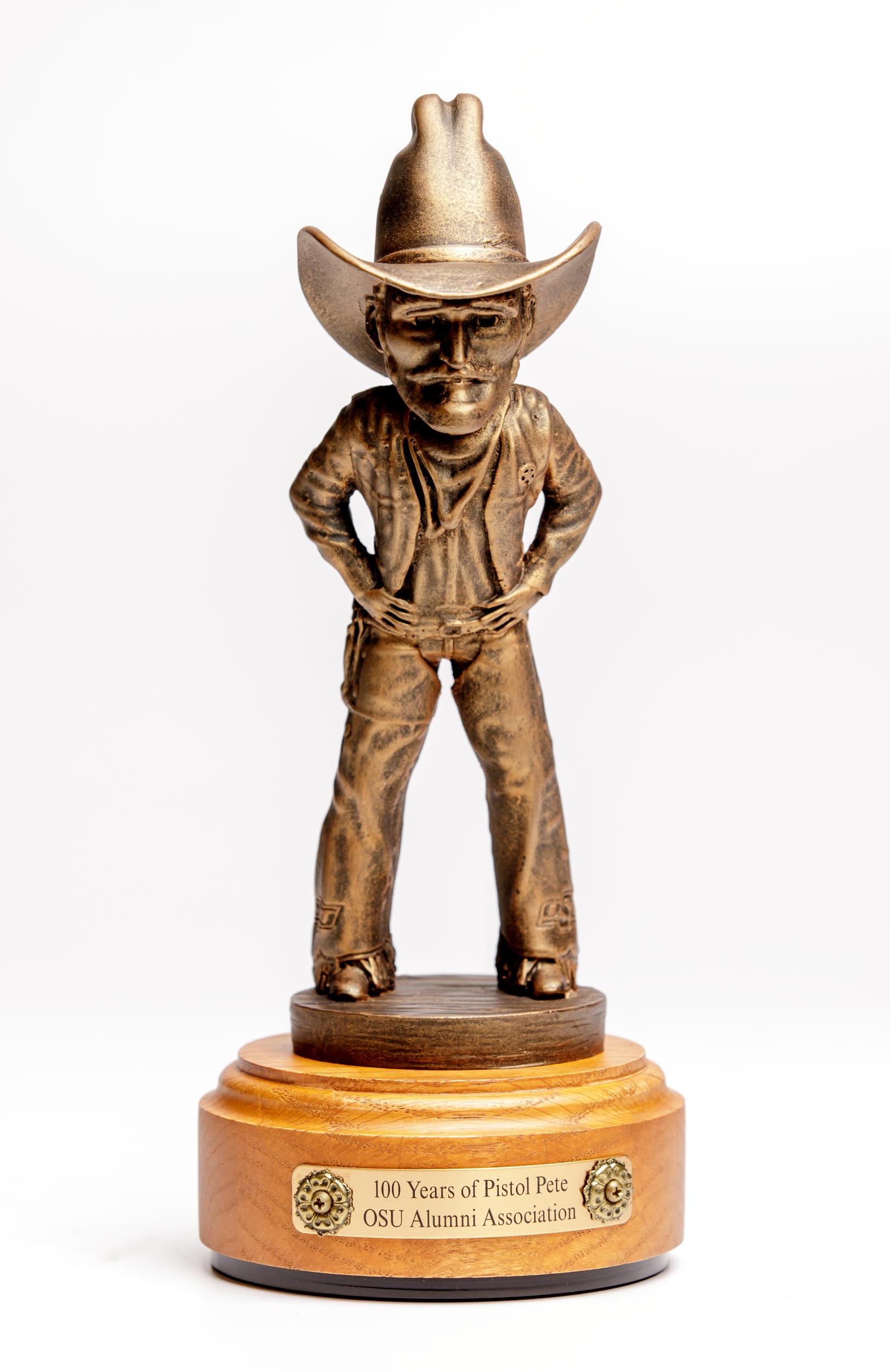
Unlike the informative and persuasive speeches you were required to give, special occasion speeches are much broader and allow for a wider range of topics, events, and approaches to be employed. However, while the following list of special occasion speeches is long, your instructor will have specific types of special occasion speeches that you will be allowed (or required) to do for class. Since you are like to give many special occasion speeches in your life, we want to cover everything you might need to know to give a good one.
Speeches of Introduction
The first type of special occasion speech is the speech of introduction , which is a mini-speech given by the host of a ceremony that introduces another speaker and their speech. Few things are worse than when the introducer of a speaker stands up and says, “This is Wyatt Ford. He’s going to talk about stress.” While we did learn the speaker’s name and the topic, the introduction falls flat. Audiences won’t be the least bit excited about listening to Wyatt’s speech.
Just like any other speech, a speech of introduction should be a complete speech and have a clear introduction, body, and conclusion—and you should try to do it all in under two minutes. This brings up another “few things are worse” scenario: an introductory speaker who rambles on for too long or who talks about himself or herself instead of focusing on the person being introduced.
For an introduction, think of a hook that will make your audience interested in the upcoming speaker. Did you read a news article related to the speaker’s topic? Have you been impressed by a presentation you’ve heard the speaker give in the past? You need to find something that can grab the audience’s attention and make them excited about hearing the main speaker.
The body of your speech of introduction should be devoted to telling the audience about the speaker’s topic, why the speaker is qualified, and why the audience should listen (notice we now have our three main points).First, tell your audience in general terms about the overarching topic of the speech. Most of the time as an introducer, you’ll only have a speech title and maybe a paragraph of information to help guide this part of your speech. That’s all right. You don’t need to know all the ins and outs of the main speaker’s speech; you just need to know enough to whet the audience’s appetite. Next, you need to tell the audience why the speaker is a credible presenter on the topic. Has the speaker written books or articles on the subject? Has the speaker had special life events that make him or her qualified? Lastly, you need to briefly explain to the audience why they should care about the upcoming speech. The outline can be adjusted; for example, you can give the biographical information first, but these three areas should be covered.
The final part of a good introduction is the conclusion, which is generally designed to welcome the speaker to the platform. Many introducers will conclude by saying something like, “I am looking forward to hearing how Wyatt Ford’s advice and wisdom can help all of us today, so please join me in welcoming Dr. Wyatt Ford.” At this point, you as the person introducing the speaker are “handing off” the speaking duties to someone else, so it is not uncommon to end your speech of introduction by clapping as the speaker comes on stage or shaking the speaker’s hand.
Speeches of Presentation
The second type of special occasion speech is the speech of presentation . A speech of presentation is a brief speech given to accompany a prize or honor. Speeches of presentation can be as simple as saying, “This year’s recipient of the Lavache Public Speaking prize is Ryann Curley,” or could last up to five minutes as the speaker explains why the honoree was chosen for the award. An interesting example of a speech presenting an award is this one by Zoe Saldana for J.J. Abrams (https://www.youtube.com/watch?v=x03cGSszr8Q).
When preparing a speech of presentation, it’s always important to ask how long the speech should be. Once you know the time limit, then you can set out to create the speech itself. First, you should explain what the award or honor is and why the presentation is important. Second, you can explain what the recipient has accomplished in order for the award to be bestowed. Did the person win a race? Did the person write an important piece of literature? Did the person mediate conflict? Whatever the recipient has done, you need to clearly highlight his or her work. Lastly, if the race or competition was conducted in a public forum and numerous people didn’t win, you may want to recognize those people for their efforts as well. While you don’t want to steal the show away from winner, you may want to highlight the work of the other competitors or nominees.
Speeches of Acceptance
The complement to a speech of presentation is the speech of acceptance . The speech of acceptance is a speech given by the recipient of a prize or honor. There are three typical components of a speech of acceptance: 1) thank the givers of the award or honor, 2) thank those who helped you achieve your goal, and 3) put the award or honor into perspective. First, you want to thank the people who have given you the award or honor and possibly those who voted for you. We see this done every year during the Oscars, “First, I’d like to thank the Academy and all the Academy voters.”
Second, you want to give credit to those who helped you achieve the award or honor. No person accomplishes things in life on his or her own. We all have family members, friends, and colleagues who support us and help us achieve what we do in life, and a speech of acceptance is a great time to graciously recognize those individuals. Lastly, put the award in perspective. Tell the people listening to your speech why the award is meaningful to you. If you know you are up for an award, the odds of your winning are high. In order to avoid blubbering through an acceptance speech, have one ready. A good rule to remember is: Be thankful, be gracious, be short.
Speeches of Dedication
A fourth special occasion speech is the speech of dedication . A speech of dedication is delivered when a new store opens, a building is named after someone, a plaque is placed on a wall, a new library is completed, and so on. These speeches are designed to highlight the importance of the project and possibly those to whom the project has been dedicated.
When preparing a speech of dedication, start by explaining how you are involved in the dedication. If the person to whom the dedication is being made is a relative, tell the audience about your relationship and your relative’s accomplishments. Second, you want to explain what is being dedicated. If the dedication is a new building or a pre-existing building, you want to explain the importance of the structure. You should then explain who was involved in the project.
If the project is a new structure, talk about the people who built the structure or designed it. If the project is a pre-existing structure, talk about the people who put together and decided on the dedication. Lastly, explain why the structure is important for the community in which it is located. If the dedication is for a new store, talk about how the store will bring in new jobs and new shopping opportunities. If the dedication is for a new wing of a hospital, talk about how patients will be served and the advances in medicine the new wing will provide the community.
At one time or another, almost everyone is going to be asked to deliver a toast . A toast is a speech designed to congratulate, appreciate, or remember. First, toasts can be delivered for the purpose of congratulating someone for an honor, a new job, or getting married. You can also toast someone to show your appreciation for something he or she has done. Lastly, we toast people to remember them and what they have accomplished.
When preparing a toast, the first goal is always to keep your remarks brief. Toasts are generally given during the middle of some kind of festivities (e.g., wedding, retirement party, farewell party), and you don’t want your toast to take away from those festivities for too long. Second, the goal of a toast is to focus attention on the person or persons being toasted—not on the speaker.
As such, while you are speaking, you need to focus your attention toward the people being toasted, both by physically looking at them and by keeping your message about them. You should also avoid any inside jokes between you and the people being toasted because toasts are public and should be accessible for everyone who hears them. To conclude a toast, simply say something like, “Please join me in recognizing Gina for her achievement” and lift your glass. When you lift your glass, this will signal to others to do the same and then you can all take a drink, which is the end of your speech.
A roast is a very interesting and peculiar speech because it is designed to both praise and good-naturedly insult a person being honored. Because of this combination of purposes, it is not hard to argue that the roast is probably a challenging type of speeches to write given the difficult task of simultaneously praising and insulting the person. Generally, roasts are given at the conclusion of a banquet in honor of someone’s life achievements. The television station Comedy Central has been conducting roasts of various celebrities for a few years, and if you’ve ever watched one, you know that the “roasters” say some harsh things about the “roastees” even though they are friends.
During a roast, the roaster will stand behind a lectern while the roastee is seated somewhere where he or she is clearly on display for the audience to see, thus allowing the audience to take in his or her reactions. Since half the fun of a good roast is watching the roastee’s reactions during the roast, it’s important to have the roastee clearly visible to the audience.
How does one prepare for a roast? First, you want to really think about the person who is being roasted. Does he or she have any strange habits or amusing stories in their past that you can discuss? When you think through these questions, you want to make sure that you cross anything off your list that is truly private information or will really hurt the person. The goal of a roast is to poke at him, not massacre him.
Second, when selecting which aspects to poke fun at, you need to make sure that the items you choose are widely known by your audience. Roasts work when the majority of people in the audience can relate to the jokes being made. If you have an inside joke with the roastee, bringing it up during roast may be great fun for the two of you, but it will leave your audience unimpressed. Lastly, end on a positive note. While the jokes are definitely the fun part of a roast, you should leave the roastee and the audience knowing that you truly do care about and appreciate the person.
A eulogy is a speech given in honor of someone who has died (Don’t confuse “eulogy” with “elegy,” a poem or song of mourning). Not to sound depressing, but since everyone who is alive will someday die, the chance of your being asked to give a eulogy someday for a friend or family member is significant. However, when the time comes to deliver a eulogy, it’s good to know what you’re doing and to adequately prepare your remarks.
When preparing a eulogy, first you need to know as much information about the deceased as possible. The more information you have about the person, the more personal you can make the eulogy. While you can rely on your own information if you were close to the deceased, it is always a good idea to ask friends and relatives of the deceased for their memories, as these may add important facets that may not have occurred to you. Of course, if you were not very close to the deceased, you will need to ask friends and family for information. Second, although eulogies are delivered on the serious and sad occasion of a funeral or memorial service for the deceased, it is very helpful to look for at least one point to be lighter or humorous. In some cultures, in fact, the friends and family attending the funeral expect the eulogy to be highly entertaining and amusing.
Take, for example, Tom Arnold’s eulogy of Saturday Night Live actor Chris Farley. During his speech at Farley’s funeral, Arnold noted, “Chris was concerned about his size, and so he made sure that all of us who knew him well saw him naked at least once” (Glionna, 1998). Picturing the heavy-set comedian naked surely brought some humor to the somber proceedings, but Arnold knew Farley (and his audience) well enough to know that the story would be appropriate.
Knowing the deceased and the audience is vital when deciding on the type and amount of humor to use in a eulogy. It’s doubtful statements like Tom Arnold’s would fit many eulogies. But it would be appropriate to tell a funny story about Uncle Joe’s love for his rattletrap car or Aunt Mary’s love of tacky Christmas sweaters. Ultimately, the goal of the humor or lighter aspects of a eulogy is to relieve the tension that is created by the serious nature of the occasion.
If you are ever asked to give a eulogy, that means you were probably close to the deceased and are experiencing shock, sadness, and disbelief at your loved one’s passing. The last thing that you will want to do (or be in a mental state to do) is figure out how to structure your eulogy. To that end, here are three parts of a eulogy (i.e. main points) you can use to write one without worrying about being original with structure or organizational patterns: praise, lament, and consolation.
The first thing you want to do when remembering someone who has passed away is remind the audience what made that person so special. So you will want to praise them and their accomplishments. This can include notable achievements (being an award winner; helping with charities), personal qualities (“she was always willing to listen to your problems and help in any way she could”), or anecdotes and stories (being a great mother; how she drove to college to visit you when you were homesick).
The second thing you want to do in a eulogy is to lament the loss. To lament means to express grief or sorrow, which is what everyone at a funeral has gathered to do. You will want to acknowledge that everyone is sad and that the deceased’s passing will be difficult to get through. Here you might mention all the things that will no longer happen as a result of the death. “Now that Grandpa is gone, there won’t be any more Sunday dinners where he cooks chicken on the grill or bakes his famous macaroni and cheese.”
The final step (or main point) in a eulogy is to console the audience, or to offer comfort in a time of grief. What you must remember (and many people often forget) is that a eulogy is not a speech for the person who has died; it is a speech for the people who are still living to try to help them deal with the loss. You will want to end your eulogy on a positive note. Offer some hope that someday, things will get better. If the deceased was a religious person, this is where you might want to incorporate elements of that belief system. Some examples would include ideas like:
“Jim has gone home to be with the Lord and is looking down on us fondly today.” “We may miss Aunt Linda deeply, but our memories of her will live on forever, and her impact on this world will not soon be forgotten.”
Using the Praise-Lament-Console format for eulogies gives you a simple system where you can fill in the sections with 1) why was the person good, 2) why you will miss him or her, and 3) how you and the audience will get through this loss. It sometimes also helps to think of the three points in terms of Past-Present-Future: you will praise the deceased for what he did when he was alive (the past), lament the loss you are feeling now (the present), and console your audience by letting them know that things will be all right (the future).
With regard to a eulogy you might give in class, you generally have two options for how to proceed: you can eulogize a real person who has passed away, or you can eulogize a fictional character (if your instructor permits that). If you give a eulogy in class on someone in your life who has actually passed away, be aware that it is very common for students to become emotional and have difficulty giving their speech. Even though you may have been fine practicing at home and feel good about giving it, the emotional impact of speaking about a deceased loved one in front of others can be surprisingly powerful. Conversely, if you give a eulogy on a fictional character, you must treat your classroom assignment eulogy as you would a real eulogy. You wouldn’t make fun of or trivialize someone’s life at an actual funeral, so don’t do that in your eulogy for a serious speech assignment either.
Speeches of Farewell
A speech of farewell allows someone to say good-bye to one part of his or her life as he or she is moving on to the next part of life. Maybe you’ve accepted a new job and are leaving your current job, or you’re graduating from college and entering the work force. Periods of transition are often marked by speeches of farewell. When preparing a speech of farewell, the goal should be to thank the people in your current position and let them know how much you appreciate them as you make the move to your next position in life. Second, you want to express to your audience how much the experience has meant to you. A farewell speech is a time to commemorate and think about the good times you’ve had. As such, you should avoid negativity during this speech. Lastly, you want to make sure that you end on a high note.
Speeches for Commencements
A speech of commencement (or, as it is more commonly known, a “commencement speech”) is designed to recognize and celebrate the achievements of a graduating class or other group of people. These typically take place at graduation ceremonies. Nearly every one of us has sat through commencement speeches at some point in our lives. And if you’re like us, you’ve heard good ones and bad ones. Numerous celebrities and politicians have been asked to deliver commencement speeches at colleges and universities. A famous and well-thought-out commencement speech was given by famed Harry Potter author J. K. Rowling at Harvard University in 2008 (found at http://www.youtube.com/watch?v=nkREt4ZB-ck). Rowling’s speech has the perfect balance of humor and inspiration, which are two of the main ingredients of a great commencement speech.
If you’re ever asked to deliver a commencement speech, there are some key points to think through when deciding on your speech’s content.
- If there is a specific theme for the graduation, make sure that your commencement speech addresses that theme. If there is no specific theme, come up with one for your speech. Some common commencement speech themes are commitment, competitiveness, competence, confidence, decision making, discipline, ethics, failure (and overcoming failure), faith, generosity, integrity, involvement, leadership, learning, persistence, personal improvement, professionalism, reality, responsibility, and self-respect.
- Talk about your life and how graduates can learn from your experiences to avoid pitfalls or take advantages of life. How can your life inspire the graduates in their future endeavors?
- Make the speech humorous. Commencement speeches should be entertaining and make an audience laugh.
- Be brief! Nothing is more painful than a commencement speaker who drones on and on. Remember, the graduates are there to get their diplomas; their families are there to watch the graduates walk across the stage.
- Remember, while you may be the speaker, you’ve been asked to impart wisdom and advice for the people graduating and moving on with their lives, so keep it focused on them.
- Place the commencement speech into the broader context of the graduates’ lives. Show the graduates how the advice and wisdom you are offering can be utilized to make their own lives better.
Overall, it’s important to make sure that you have fun when delivering a commencement speech. Remember, it’s a huge honor and responsibility to be asked to deliver a commencement speech, so take the time to really think through and prepare your speech.
After-Dinner Speeches
After-dinner speeches are humorous speeches that make a serious point. These speeches get their name from the fact that they historically follow a meal of some kind. After-dinner speakers are generally asked to speak (or hired to speak) because they have the ability both to speak effectively and to make people laugh. First and foremost, after-dinner speeches are speeches and not stand-up comedy routines. All the basic conventions of public speaking previously discussed in this text apply to after-dinner speeches, but the overarching goal of these speeches is to be entertaining and to create an atmosphere of amusement.
After-dinner speaking is an extremely difficult type of speaking to do well because it is an entertaining speech that depends on the successful delivery of humor. People train for years to develop comic timing, or the verbal and nonverbal delivery used to enhance the comedic value of a message. But after-dinner speaking is difficult, not impossible. What follows is the method we recommend for developing a successful after-dinner speech.
First, use all that you have learned about informative or persuasive speeches to prepare a real informative or persuasive speech roughly two-thirds the length of what the final speech will become. That is, if you’re going to be giving a ten-minute speech, then your “real” informative or persuasive speech should be six or seven minutes in length. This is the “serious message” portion of the speech where you will try to make a point of educating your audience.
Next, go back through the speech and look for opportunities to insert humorous remarks. Once you’ve looked through your speech and examined places for verbal humor, think about any physical humor or props that would enhance your speech. Physical humor is great if you can pull it off without being self-conscious. One of the biggest mistakes any humorist makes is to become too aware of what his or her body is doing because it’s then harder to be free and funny. As for props, after-dinner speakers have been known to use everything from oversized inflatable baseball bats to rubber clown noses. The goal for a funny prop is that it adds to the humor of the speech without distracting from its message.
Last, and probably most important, try the humor out on real, live people. This is important for three reasons. First, the success of humor depends heavily on delivery, and especially timing in delivery. You will need practice to polish your delivery so that your humor comes across. If you can’t make it through one of your jokes without cracking up, you will need to either incorporate the self-crackup into your delivery or forgo using that joke.
Just because you find something unbelievably funny in your head doesn’t mean that it will make anyone else laugh. Often, humor that we have written down on paper just doesn’t translate when orally presented. You may have a humorous story that you love reading on paper, but find that it just seems to drone on once you start telling it out loud. Furthermore, remember there is a difference between written and verbal language, and this also translates to how humor is interpreted. Third, you need to make sure the humor you choose will be appropriate for a specific audience. What one audience finds funny another may find offensive. Humor is the double-edged sword of public speaking. On one side, it is an amazing and powerful speaking tool, but on the other side, few things will alienate an audience more than offensive humor. If you’re ever uncertain about whether a piece of humor will offend your audience, don’t use it.
So you may now be asking, “What kind of topics are serious that I can joke about?” The answer to that, like the answer to most everything else in the book, is dependent on your audience and the speaking situation, which is to say any topic will work, while at the same time you need to be very careful about how you choose your topic.
Take, for example, the experience one of your authors had while he was attending a large university. One of the major problems that any large university faces is parking: the ratio of parking spaces to students at some of these schools can be 1:7 (one parking space for every seven students). In addressing this topic at a banquet, a student gave an after- dinner speech that addressed the problem of the lack of student parking. To do so, he camouflaged his speech as a faux-eulogy (fake eulogy) for the yellow and black board on the parking lot gates (see Image 15.1) that was constantly and consistently driven through by students wanting to access restricted parking. The student personified the board by noting how well it had done its job and lamented that it would never get to see its little toothpick children grow up to guard the White House. But underneath the humor incorporated into the speech was a serious message: this wouldn’t keep happening if adequate parking was provided for students on campus.
Motivational Speeches
A motivational speech is designed not only to make an audience experience emotional arousal (fear, sadness, joy, excitement) but also to motivate the audience to do something with that emotional arousal. Whereas a traditional persuasive speech may want listeners to purchase product X or agree with idea Y, a motivational speech helps to inspire people in a broader fashion, often without a clearly articulated end result in mind. As such, motivational speaking is a highly specialized form of persuasive speaking commonly delivered in schools, businesses, religious houses of worship, and club or group contexts. The Toastmasters International Guide to Successful Speaking (Slutsky & Aun, 1997) lists four types of motivational speeches: hero, survivor, religious, and success.
The hero speech is a motivational speech given by someone who is considered a hero in society (e.g., military speakers, political figures, and professional athletes). Just type “motivational speech” into YouTube and you’ll find many motivational speeches given by individuals who can be considered heroes or role models.
The survivor speech is a speech given by someone who has survived a personal tragedy or who has faced and overcome serious adversity. In the following clip, cancer survivor Becky M. Olsen discusses being a cancer survivor (http://www.youtube.com/watch?v=zuo1u_C9_3g). Becky Olsen goes all over the country talking with and motivating cancer survivors to beat the odds.
The religious speech is fairly self-explanatory; it is designed to incorporate religious ideals into a motivational package to inspire an audience into thinking about or changing aspects of their religious lives. The final type of motivational speech is the success speech, which is given by someone who has succeeded in some aspect of life and is giving back by telling others how they too can be successful.
As stated at the beginning of this section, you will almost certainly be limited by your professor with regards to which of these types of speeches you can give for your special occasion speech in class, but it is not unrealistic to think that you will be called upon at various points in your life to give one or more of these speeches. Knowing the types and basic structures will help when those moments arise.
a mini-speech given by the host of a ceremony that introduces another speaker and his or her speech
a brief speech given to accompany a prize or honor
a speech given by the recipient of a prize or honor
a speech delivered to mark the unveiling, opening, or acknowledging of some landmark or structure
a speech designed to congratulate, appreciate, or remember
a humorous speech designed to both praise and good-naturedly insult a person being honored
a speech given in honor of someone who has died
to express grief or sorrow
a speech allowing someone to say goodbye to one part of his or her life as he or she is moving on to the next part of life
a speech designed to recognize and celebrate the achievements of a graduating class or other group of people
a humorous speech that makes a serious point
a speech designed not only to make an audience experience emotional arousal (fear, sadness, joy, excitement) but also to motivate the audience to do something with that emotional arousal
a motivational speech given by someone who is considered a hero in society
a speech given by someone who has survived a personal tragedy or who has faced and overcame serious adversity
a speech designed to incorporate religious ideals into a motivational package to inspire an audience into thinking about or changing aspects of their religious lives
Introduction to Speech Communication Copyright © 2021 by Individual authors retain copyright of their work. is licensed under a Creative Commons Attribution-NonCommercial-ShareAlike 4.0 International License , except where otherwise noted.
Share This Book

COMMENTS
Here are some tips for preparing your special occasion speech: 1. Set realistic goals. Establish what you want to achieve with your speech, then make sure that those goals are achievable and relevant to the setting and audience of the special occasion. 2. Research thoroughly. Once you have established the goals for your speech, research the ...
Here is the step-by-step process of writing a special occasion speech: 1. Special Occasion Speech Outline. The special occasion speech outline is the same for all types of speeches. It has three main components: introduction, body, and conclusion. The outline is the same for every type of speech; the difference is the content it contains. 2.
A special occasion speech is short and straight to the point, possibly lasting for ten minutes or less. A mood is often set through these speeches, enough to change everyone's spirit. Some special occasion speech examples include a eulogy, a toast, and an award speech.
1. Personalization: Tailoring the speech to the specific event, audience, and individuals involved adds a personal touch that resonates deeply with listeners. Incorporating personal anecdotes, inside jokes, or references to shared experiences helps create a connection and makes the speech more memorable. 2.
Conclude your special occasion speech with the words that would leave your audience with the proper aftertaste. Try to make the final phrases of your speech memorable and logical. Special Occasion Speech Examples. To inspire yourself with brilliant ideas as to your creative assignment, check every special occasion speech example provided below.
How to write an awesome special occasion speech: Tips & Example. Special occasion speeches are given in a variety of situations: weddings, awards ceremonies, political events, retirement, and many more. Their purpose is to mark the significance of an important event. Usually, they take no longer than 10 minutes, and most such speeches serve the ...
Commemorative Speech and Tribute - is ceremonial speech because it aims at paying a tribute and praise a person, an organization, institution, special occasion, great idea, or a group of people who did something special. Try to use one of our unique commemorative speech ideas. Speak about values and how much work or effort have gone into that.
The goal of a special occasion speech is to stir an audience's emotions and make them feel a certain way in response to the situation or occasion. The general purpose of a special occasion speech might be "to inspire," "to celebrate," "to honor," or "to entertain.". To help us think through how to be effective in delivering ...
Learning Objectives. Identify the proper techniques for delivering a speech on a special occasion. The good news is the basic form of a special-occasion speech is much like that of any other speech. It has an introduction, a body, and a conclusion. The better news is that because it is geared to a special occasion, you already have a purpose ...
There are three typical components of a speech of acceptance: 1) thank the givers of the award or honor, 2) thank those who helped you achieve your goal, and 3) put the award or honor into perspective. First, you want to thank the people who have given you the award or honor and possibly those who voted for you.
In this article, we will provide you with some special occasion speech topics that can help you craft a memorable and effective speech. From inspirational messages to funny anecdotes, we'll give you the tools you need to make your speech a hit. Acknowledging the Achievements of the Celebrant. The Power of Gratitude.
Tip 4: Maintain a positive tone. No matter the occasion, keep your speech positive and uplifting. Focus on the good times and the happy moments, even if the event carries a tinge of sadness. Example: When delivering a eulogy, remember to celebrate the life of your loved one and the joy they brought into your life.
Here are some suggestions for your speeches on special occasions: A toast to the wedding ceremony of a cousin. An address to receive an award for sports. A hilarious roast at a birthday celebration of a friend. A speech to accept an award from the state government.
stay positive. Regardless of the occasion or speech, stay positive, even if it is to commemorate a sad occasion or remember the loss of an individual. Perlman (1997) suggests taking every opportunity to compliment the speaker. Humorous anecdotes are generally okay if they're positive.
Be Adaptive to the Occasion. Not all content is appropriate for all occasions. If you are asked to deliver a speech commemorating the first anniversary of a school shooting, then obviously using humor and telling jokes wouldn't be appropriate. But some decisions about adapting to the occasion are less obvious. Consider the following examples:
Key Takeaways. There are eight common forms of ceremonial speaking: introduction, presentation, acceptance, dedication, toast, roast, eulogy, and farewell. Speeches of introduction are designed to introduce a speaker. Speeches of presentation are given when an individual is presenting an award of some kind.
State your specific statement. Relate it to your audience. List the main points of the body - your main occasional thoughts on the speakers podium. List the main special occasional speech topics and construct the successes, pros and cons, values, examples, funny remarks, narratives, anecdotes or insight stories.
Cite this lesson. Special occasions call for special occasion speeches, a type of speech designed to celebrate an event or person in an emotional way. Learn how to write a special occasion speech ...
Special occasion speeches are, to put it lightly, the "life of the party" when it comes to public speaking. Farewells, toasts, and after-dinner remarks are often the lightest of public speaking fare, requiring little in preparation or execution. Humor, anecdote, and brevity are notable qualities of these types of speeches.
https://sholakaye.com Public Speaking - for a SPECIAL OCCASION. Get the top 3 expert tips on how to prepare and deliver your speech effectively, whatever the...
Structure your speech. Organize your ideas logically, using an introduction, body and conclusion. Keep it concise. Special occasion speeches are typically short, so focus on delivering your message succinctly. Use storytelling. Incorporate personal stories or anecdotes to make your speech relatable and memorable. Add humor.
The complement to a speech of presentation is the speech of acceptance. The speech of acceptance is a speech given by the recipient of a prize or honor. There are three typical components of a speech of acceptance: 1) thank the givers of the award or honor, 2) thank those who helped you achieve your goal, and 3) put the award or honor into ...
Accepting an Award: Let your listeners know what this award means to you. Ex. "To me, the Citizens Who Care Award has always stood for …. I am proud and humbled to be included in such a selfless group of individuals.". When accepting an award it is essential that you express your gratitude. Remember to thank the organization presenting ...